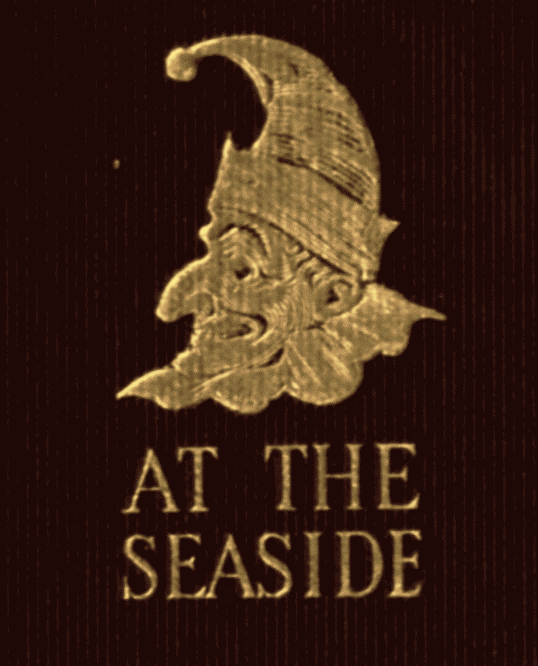
The Project Gutenberg EBook of Mr. Punch at the Seaside, by Various This eBook is for the use of anyone anywhere at no cost and with almost no restrictions whatsoever. You may copy it, give it away or re-use it under the terms of the Project Gutenberg License included with this eBook or online at www.gutenberg.org Title: Mr. Punch at the Seaside Author: Various Editor: J. A. Hammerton Illustrator: Various Release Date: August 23, 2011 [EBook #37166] Language: English Character set encoding: ISO-8859-1 *** START OF THIS PROJECT GUTENBERG EBOOK MR. PUNCH AT THE SEASIDE *** Produced by Neville Allen, Chris Curnow and the Online Distributed Proofreading Team at https://www.pgdp.net (This file was produced from images generously made available by The Internet Archive)
Designed to provide in a series of volumes, each complete in itself, the cream of our national humour, contributed by the masters of comic draughtsmanship and the leading wits of the age to "Punch", from its beginning in 1841 to the present day.
AS PICTURED BY
CHARLES KEENE, JOHN LEECH,
GEORGE DU MAURIER, PHIL MAY,
L. RAVEN-HILL, J. BERNARD
PARTRIDGE, GORDON BROWNE,
E. T. REED, AND OTHERS ...
WITH 200 ILLUSTRATIONS
One of the leading characteristics of the nineteenth century was the tremendous change effected in the social life of Great Britain by the development of cheap railway travel. The annual holiday at the seaside speedily became as inevitable a part of the year's progress as the milkman's morning call is of the day's routine. What at first had been a rare and memorable event in a life-time developed into a habit, to which, with our British love for conventions, all of us conform.
Whether or not our French critics are justified in saying that we Britishers take our pleasures sadly, these pages from the seaside chronicles of Mr. Punch will bear witness, and while at times they may seem to support the case of our critics, at others the evidence is eloquent against them. This at least is certain, that whatever the temperament of the British as displayed during the holiday season at our popular resorts, the point of view of our national jester, Mr. Punch, is unfailingly humorous, and such sadness as some of our countrymen may bring to their pleasures is but food for the mirth of merry Mr. Punch, who, we[Pg 6] are persuaded, stands for the sum total of John Bull's good humour in his outlook on the life of his countrymen.
As the real abstract and brief chronicler of our time, Mr. Punch has mirrored in little the social history of the last sixty-five years, and apart from the genuine entertainment which this book presents, it is scarcely less instructive as a pictorial history of British manners during this period. One may here follow in the vivid sketches of the master-draughtsmen of the age the ceaseless and bewildering changes of fashion—the passing of the crinoline, the coming and going of the bustle, the chignon, and similar vanities, and the evolution of the present-day styles of dress both of men and women.
It is also curious to notice how little seaside customs, amusements, troubles and delights, have varied in the last half-century. Landladies are at the end what they were at the beginning; the same old type of bathing-machine is still in use; our forefathers and their womenfolk in the days when Mr. Punch was young behaved themselves by "the silver sea" just as their children's children do to-day. Nothing has changed, except that the most select of seaside places is no longer so select as it was in the pre-railway days, and that the wealthier classes, preferring the attractions of Continental resorts, are less in evidence at our own watering-places.
The motto of this little work, as of all those in the series to which it belongs, is "Our true intent is all for your delight", but if the book carry with it some measure of instruction, we trust that may not be the less to its credit.
Mrs. Dorset (of "Dorset's Sugar and Butter Stores",
Mile End Road).
"Why on earth can't we go to a more
dressy place than this, 'Enery?
I'm sick of this dreary 'ole, year after year.
It's nothing but sand and
water, sand and water!"
Mr. Dorset. "If it wasn't for sand and water,
you wouldn't get no
'olerday."
Seaside Mem.—The Society recently started to abolish Tied-houses will not include Bathing Machines within the scope of its operations.
[Mr. Justice Hawkins. Where is Ramsgate?
Mr. Dickens. It is in Thanet, your lordship.
Report of Twyman v. Bligh.]
"Where's Ramsgate?" Justice Hawkins cried.
"Where on our earthly planet?"
The learned Dickens straight replied,
"'Tis in the Isle of Thanet.
"Ramsgate is where the purest air
Will make your head or leg well,
Will jaded appetite repair,
With the shrimp cure of Pegwell.
"Where's Ramsgate? It is near the place
Where Julius Cæsar waded,
And nearer still to where his Grace
Augustine come one day did.
"All barristers should Ramsgate know:
I speak of it with pleasure",
Quoth Dickens. "There I often go
When wanting a refresher.
"Where's Ramsgate? Where I've often seen.
Both S-mb-rne and Du M-r-er,
When I have gone by 3.15
Granville Express, Victorier.
[Pg 9]"With Thanet Harriers, when you are
Well mounted on a pony,
You'll say, for health who'd go so far
As Cannes, Nice, or Mentone?
"With Poland, of the Treasury,
Recorder eke of Dover,
I oft go down for pleasurey.
Alack! 'tis too soon over!
"O'er Thanet's Isle where'er you trudge,
My Lud, you'll find no land which——"
"Dickens take Ramsgate!" quote the Judge.
"Luncheon! I'm off to Sandwich!"
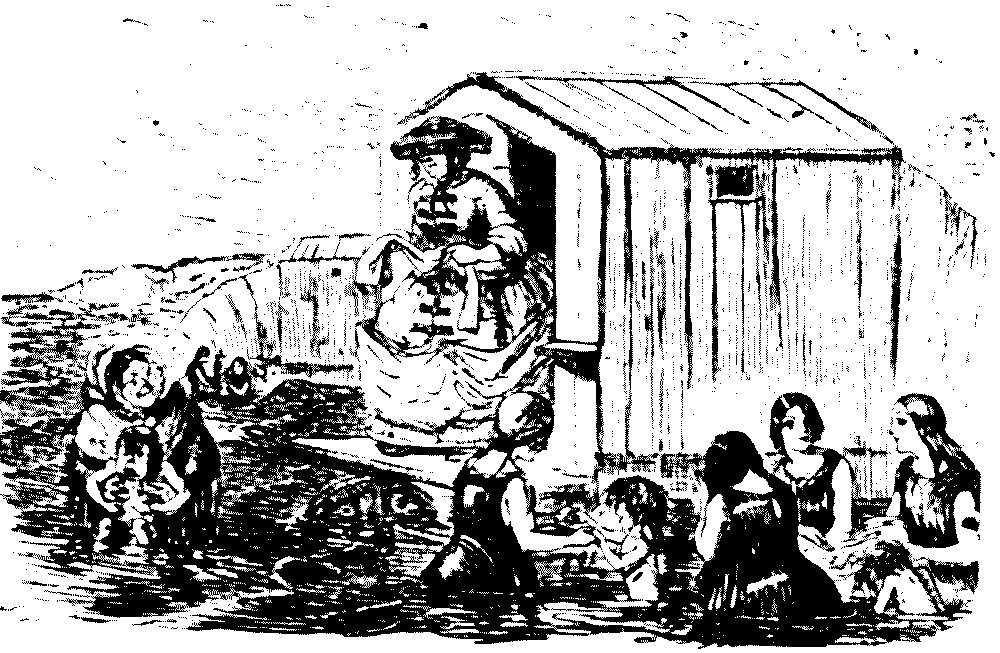
Bathing Guide. "Bless 'is 'art! I know'd he'd take to it kindly—by the werry looks on 'im!"
Contributed by "Glaucus", who is staying at a quiet watering-place, five miles from anywhere, and three miles from a Railway Station.
Monday(?) after breakfast, lying on the beach.
Wonder if it is Monday, or Tuesday?
Wonder what time it is?
Wonder if it will be a fine day?
Wonder what I shall do if it is? On second thoughts, wonder what I shall do if it isn't?
Wonder if there are any letters?
Wonder who that is in a white petticoat with her hair down?
Wonder if she came yesterday or the day before?
Wonder if she's pretty?
Wonder what I've been thinking about the last ten minutes?
Wonder how the boatmen here make a livelihood by lying all day at full length on the beach?
Wonder why every one who sits on the shore throws pebbles into the sea?
Wonder what there is for dinner?
Wonder what I shall do all the afternoon?
Wonder who in the house beside myself is partial to my dry sherry?
Wonder what there is for dinner?
Wonder what's in the paper to-day?
Wonder if it's hot in London? Should say it was.
Wonder how I ever could live in London?
Wonder if there's any news from America?
Wonder what tooral looral means in a chorus?[Pg 14]
Children playing near me, pretty, very?
Wonder if that little boy intended to hit me on the nose with a stone?
Wonder if he's going to do it again? Hope not.
Wonder if I should like to be a shrimp?
Wonder why I can never get any fish?
Wonder why my landlady introduces cinders into the gravy?
Wonder more than ever who there is at my lodgings so partial to my dry sherry?
Wonder if that's the coast of France in the distance?
Feel inclined for a quiet conversation with my fellow-man.
A boatman approaches. I wonder (to the boatman) if it will be a fine day tomorrow? He wonders too? We both wonder together?
Wonder (again to the boatman) if the rail will make much difference to the place? He shakes his head and says "Ah! he wonders!" and leaves me.
Wonder what age I was last birthday? [Pg 16]
Wonder if police inspectors are as a rule fond of bathing?
Wonder what gave me that idea?
Wonder what I shall do all this evening?
Wonder if there ever was such a creature as a mermaid?
Wonder several times more than ever who it is that's so fond of my dry sherry?
Wonder if the Pope can swim?
Wonder what made me think of that?
Wonder if I should like to go up in a balloon?
Wonder what Speke and Grant had for dinner to-day?
Wonder if the Zoological Gardens are open at sunrise?
Wonder what I shall do to-morrow?
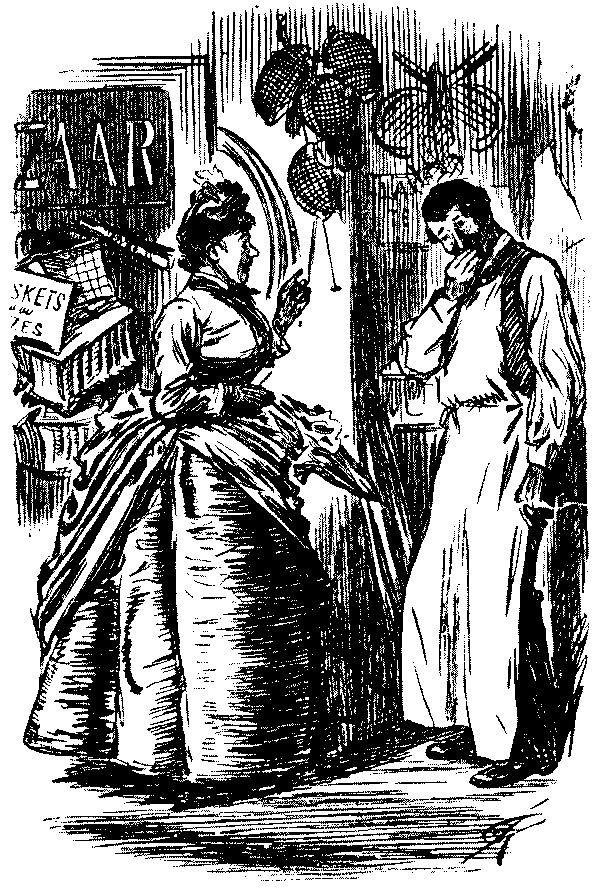
Lady (at Seaside "Emporium"). "How much are those—ah—improvers?"
Shopman. "Improv—hem!—They're not, ma'am"—(confused)—"not—not the article you require, ma'am. They're fencing-masks, ma'am!"
[Tableau!
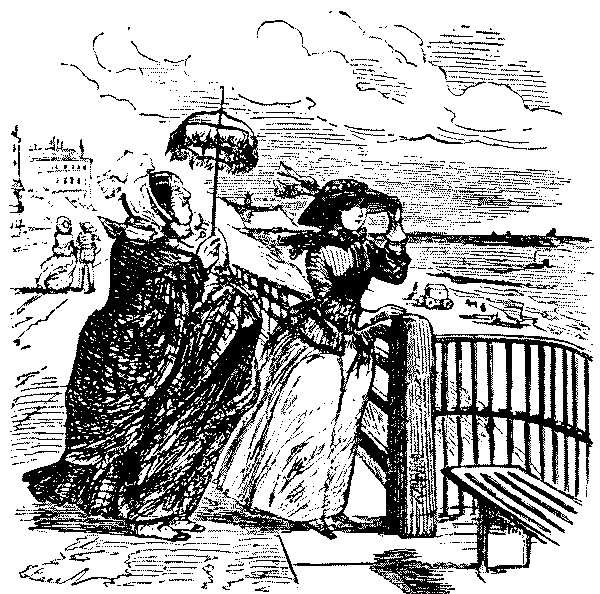
Flora. "Oh, let us sit here, aunt, the breeze is so delightful."
Aunt. "Yes—it's very nice, I dare say; but I won't come any nearer to the cliff, for I am always afraid of slipping through those railings!"
I think, as I sit at my ease on the shingle,
And list to the musical voice of the Sea,
How gaily my Landlady always will mingle
From my little caddy her matutine tea.
And vainly the bitter remembrance I banish
Of mutton just eaten, my heart is full sore,
To think after one cut it's certain to vanish,
And never be seen on my board any more.
Some small store of spirit to moisten my throttle
I keep, and indulge in it once in a way;
But, bless you, it seems to fly out of the bottle
And swiftly decrease, though untouched all the day.
My sugar and sardines, my bread and my butter,
Are eaten, and vainly I fret and I frown;
My Landlady, just like an Æsthete's too utter
A fraud, and I vow that I'll go back to Town.
Science has given us the baby-jumper, by which we are enabled to carry out the common exclamation of "Hang those noisy children" without an act of infanticide, by suspending our youngsters in the air; and perhaps allowing them to have their full swing, without getting into mischief; but the apparatus for the nursery will not be complete until we have something in the shape of coops for our pretty little chickens, when they are "out with nurse", and she happens to have something better—or worse—to do than to look after them.
How often, in a most interesting part of a novel, or in the midst of a love passage of real life,[Pg 22] in which the nurse is herself the heroine, how often, alas! is she not liable to be disturbed by the howl of a brat, with a cow's horn in his eye, a dog's teeth in his heels, or in some other awkward dilemma, which could not have arisen had the domestic Child-coop been an article of common use in the Metropolitan parks, or on the sands at the seaside?
There is something very beautiful in the comparison of helpless infancy to a brood of young chickens, with its attendant imagery of "mother's wing", and all that sort of thing, but the allegory would be rendered much more complete by the application of the hencoop to domestic purposes. We intend buying one for our own stud of piccoli—which means little pickles—and we hope to see all heads of families taking it into their heads to follow our example.
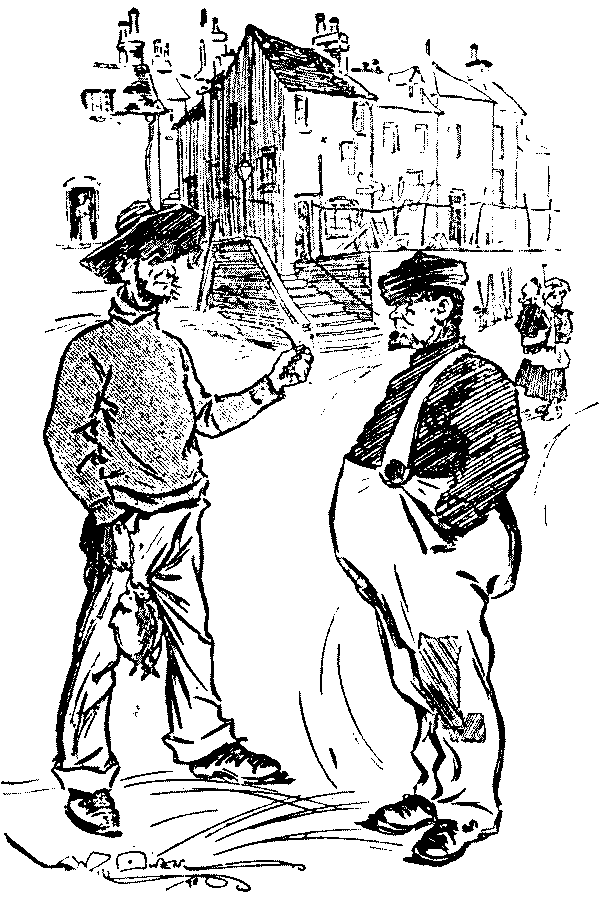
"D'year as 'ow old Bob Osborne 'ave give up shrimpin' an took ter winklin'?"
"Well, I'm blest!"
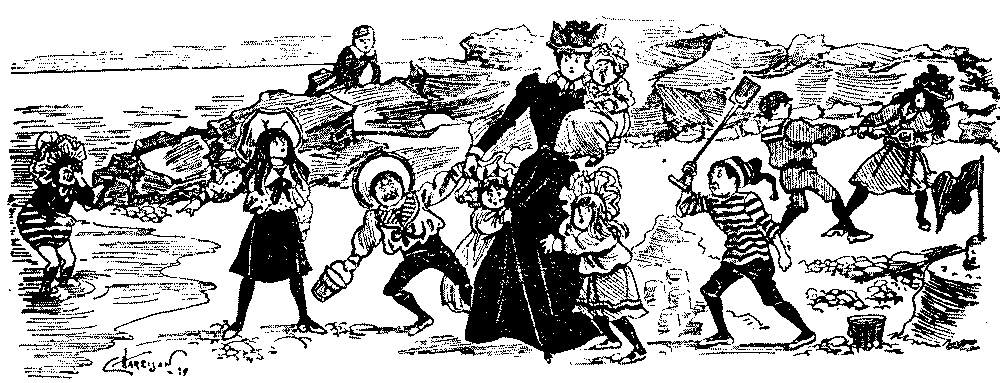
You give them a change by taking them to the seaside—all they have to do is to look after the children—and yet they don't seem to appreciate it.
Shall we like Pierpoint, to which favourite and healthy seaside resort we finally resolved to come, after a period of much indecision and uncertainty, and where we arrived, in heavy rain, in two cabs, with thirteen packages, on Saturday?
Shall we be comfortable at 62, Convolution Street, dining-room floor, two guineas and a half a week, and all and perhaps rather more than the usual extras?
Shall we like Mrs. Kittlespark?
Shall we find Kate all that a Kate ought to be?
Shall we lock everything up, or repose a noble confidence in Mrs. Kittlespark and Kate?
Shall we get to know the people in the drawing-room?
Shall we subscribe to the Pier, or pay each time we go on it?
Shall we subscribe to that most accommodating Circulating Library, Pigram's, where we can exchange our books at pleasure, but not oftener than once a day?
Shall we relax our minds with the newest novels, or give our intellects a bracing course of the best standard works?
Shall we dine late or early?
Shall we call on the Denbigh Flints, who, according to the Pierpoint Pioneer, are staying at 10, Ocean Crescent?
Shall we carefully avoid the Wilkiesons, whom the same unerring guide reports at 33, Blue Lion Street?
Shall we be satisfied with our first weekly bill?
Shall we find in it any unexpected and novel extras, such as knife-cleaning, proportion of the water-rate, loan of latch-key, &c.?
Shall we get our meat at Round's, who displays the Prince of Wales's Feathers over his shop door, and plumes himself on being "purveyor" to His Royal Highness; or at Cleaver's, who boasts of the patronage of the Hereditary Grand Duke of Seltersland?
Shall we find everything dearer here than it is at home?
Shall we be happy in our laundress?
Shall we be photographed?
Shall we, as Mrs. Kittlespark has a spare bed-room, invite our Cousin Amelia Staythorp, from whom we have expectations, and who is Constance Edith Amelia's Godmother, to come down and stay a week with us?
Shall we be praiseworthily economical, and determine not to spend a single unnecessary sixpence; or shall we, as we have come to Pierpoint, enjoy ourselves to the utmost, go in for all the amusements of the place—pier, public gardens, theatre, concerts, Oceanarium, bathing, boating, fishing, driving, riding, and rinking—make excursions, be ostentatiously liberal to the Town Band, and buy everything that is offered to us on the Beach?
A month hence, shall we be glad or sorry to leave Pierpoint, and go back to Paddington?
Postscript To a Seaside Letter.—"The sea is as smooth, and clear, as a looking-glass. The oysters might see to shave in it."
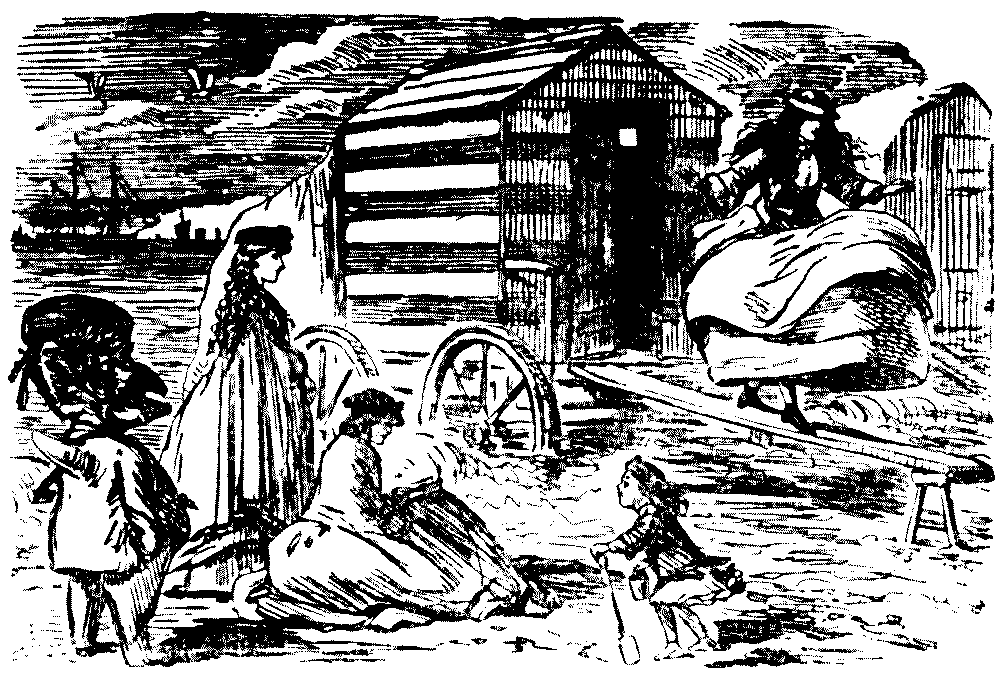
The Female Blondin Outdone! Grand Morning Performance on the Narrow Plank by the Darling ----
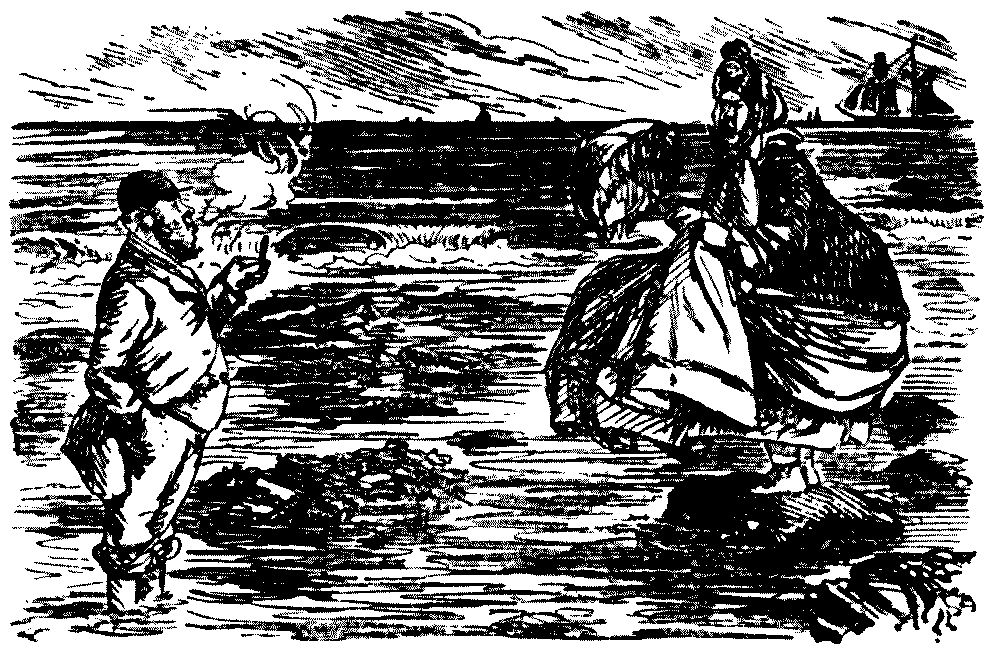
Mrs. T. "What a wretch you must be, T.; why don't you take me off? Don't you see I'm overtook with the tide, and I shall be drownded!"
T. "Well, then—will you promise not to kick up such a row when I stop out late of a Saturday?"
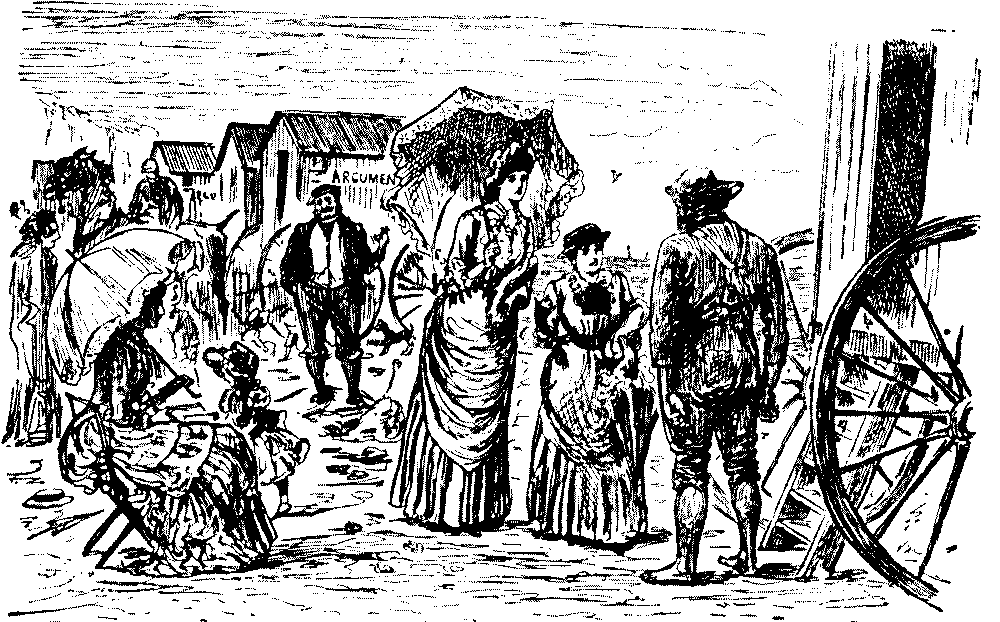
"And look here! I want you to take my friend here and myself just far enough to be up to our chins, you know, and no further!"
That the lodging-house keepers are on the look out for the weary Londoners and their boxes.
That the sea breezes will attract all the world from the Metropolis to the coast.
That Britons should prefer Ramsgate, Eastbourne, Scarborough, and the like, to Dieppe, Dinard, and Boulogne.
That paterfamilias should remember, when paying the bill, that a two months' letting barely compensates for an empty house during the remainder of the year.
That the shore is a place of recreation for all but the bathing-machine horse.
That the circulating libraries are stocked with superfluous copies of unknown novels waiting to be read.
That, finally, during the excursion season, 'Arry will have to be tolerated, if not exactly loved.
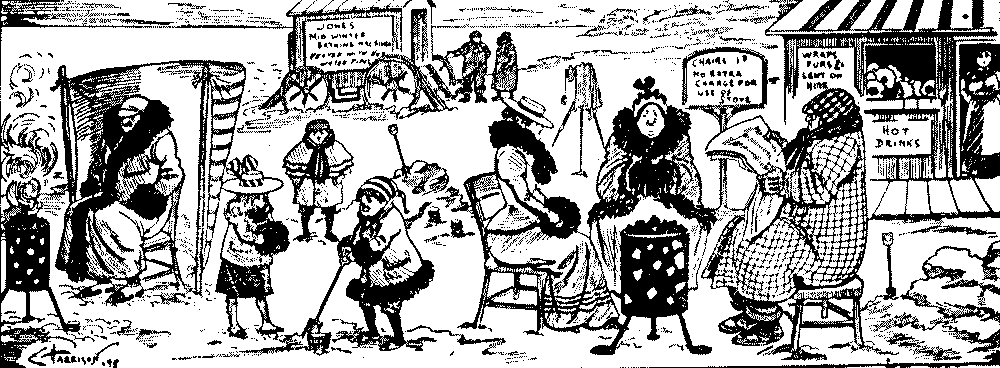
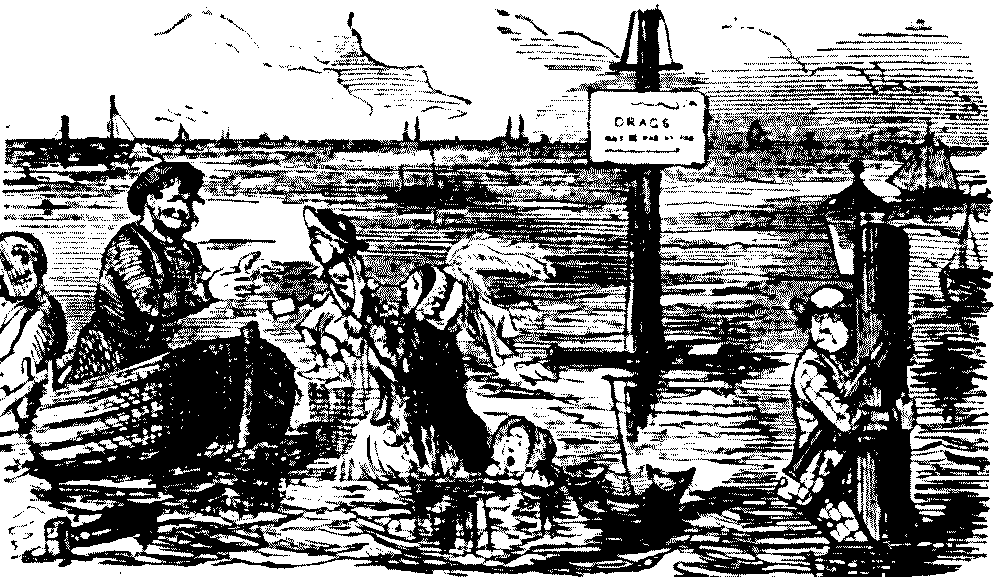
Mrs. Fydgetts (screaming). "My child! My child!"
Mr. Fydgetts. "What's the use of making that noise? Can't you be quiet?"
Mrs. F. "You're a brute, sir."
Mr. F. "I wish I were; for then I should be able to swim."
Mrs. F. "Mr. Fydgetts! Ain't you a-coming to help me?"
Mr. F. "No! It serves you right for bringing me down to this stupid place."
Mrs. F. "I, indeed. Why, I wanted to go to Brighton and you would come to Margate—you said it was cheaper".
Mr. F. "It's false; I said no such thing".
Mrs. F. "You did, you did!"
Mr. F. "O, woman! woman! Where do you expect to go to?"
Mrs. F. "To the bottom; unless you come and help me!"
Mr. F. "Help yourself. I'm s-i-n-k-i-n-g"—
Mrs. F. "My child! My child!"
Mr. F. (rising from the water). "Be quiet, can't you! Woo-o-m—" (the rest is inaudible, but the watery pair are saved just in time, and renew their dispute in the boat as soon as they are rescued from their perilous position).
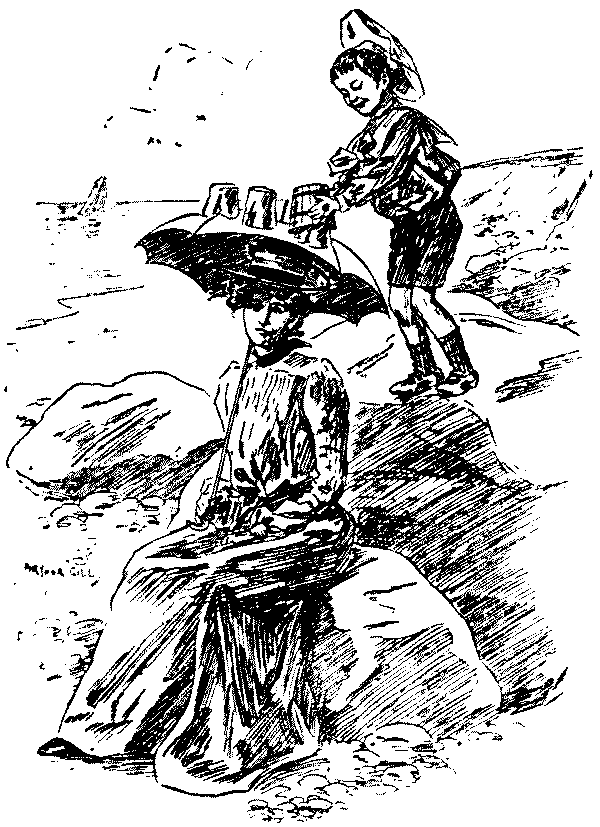
Mabel (soliloquising). "Dear me, this relaxing climate makes even one's parasol seem too heavy to hold!"
Why Great?—where's Little Yarmouth?—or Mid-Sized Yarmouth?—give it up—don't know—hate people who ask conundrums—feel well cured directly you get here—good trademark for dried-fish sellers, "The Perfect Cure"—if you stay a fortnight, get quite kipperish—stay a month, talk kipperish! Principal attractions—Bloaters and Rows—first eat—second see—song, "Speak gently of the Herring"—"long shore" ones splendid—kippers delicious—song, "What's a' the steer, Kipper?"—song, "Nobody's rows like our Rows"—more they are—varied—picturesque—tumbledown—paradise for painters—very narrow—capital support for native Bloater going home after dinner—odd names—Ramp, Kitty Witches—Gallon Can,[Pg 36] Conge! Fancy oneself quite the honest toiler of the sea—ought to go about in dried haddock suit—feel inclined to emulate Mr. Peggotty—run into quiet taverns—thump tables violently—say "gormed!" Whole neighbourhood recalls Ham and Little Em'ly—David, Steerforth, Mrs. Gummidge—recall ham myself—if well broiled—lunch—pleasant promenades on piers—plenty of amusement in watching the bloateric commerce—fresh water fishing in adjacent Broads, if you like—if not, let it alone—broad as it's long! The Denes—not sardines—nor rural deans—good places for exercise—plenty of antiquities—old customs—quaint traditions! Picturesque ancient taverns—capital modern hotels—stopping in one of the latter—polite waiter just appeared—dinner served—soup'll get cold—mustn't wait—never insult good cook by being unpunctual—rather let Editor go short than hurt cook's feelings[1]—so no more at present—from Yours Truly.
Emphatically the Sea on the strict Q T—no bustle at railway-station—train glides in noiselessly—passengers ooze away—porters good-tempered and easy-going—like suffragan Bishops in corduroys—bless boxes—read pastorals on portmanteaux—no one in a hurry—locomotive coos softly in an undertone—fly-drivers suggest possibility of your requiring their services in a whisper! Place full—no lodgings to be had—visitors manage to efface themselves—no one about—all having early dinners—or gone to bed—or pretending to be somewhere else—a one-sided game of hide and seek—everybody hiding, nobody seeking! Seems always afternoon—dreamy gleamy sunshine—a dense quietude that you might cut in slices—no braying brass-bands—no raucous niggers—no seaside harpies—Honfleur packet only excitement—no one goes to see it start—visitors don't like to be excited! Chief amusements, Common, Sands, and Pony-chaises—first, good to roll on—second, good to stroll on—first two, gratuitous and breezy—third, inexpensive and easy—might be driven out of your mind for three-and-six—notwithstanding this, everybody presumably sane. Capital place for children—cricket for boys—shrimping for girls—bare legs—picturesque dress—not much caught—salt water good for ankles—excellent bathing—rows of bathing-tents—admirable notion! Interesting excursions—Arundel Castle—Bramber—Bognor—Chichester—Petworth House! Good things to eat—Arundel mullet—Amberley trout—Tarring figs! Delightful air—omnipotent ozone—uninterrupted quiet—just the place to recover your balance, either mental or monetary—I wish to[Pg 43] recover both—that's the reason I'm here—send cheque at once to complete cure.[2]
Don't like this sentiment. Is J. J. a Cook's Tourist?—Ed.
We have sent him the price of a third-class fare to town, with orders to return instantly: possibly this is hardly the sort of check that our friend "J. J." expected.—Ed.
Long way from London—no matter—fast train—soon here—once here don't wish to leave—palatial hotels—every luxury—good tables d'hôte—pleasant balls—lively society! Exhilarating air—good as champagne without "morning after"—up early—go to bed late—authorities provide something better than a broken-down pier, a circulating library, and a rickety bathing-machine—authorities disburse large sums for benefit of visitors—visitors spend lots of money in town—mutual satisfaction—place crowded—capital bands—excellent theatricals—varied entertainments—right way to do it! The Spa—first discovered 1620—people been discovering it ever since—some drink it—more walk on it—lounge on it—smoke on it—flirt on it—wonderful costumes in the morning—more wonderful in the afternoon—most wonderful in the evening! North Sands—South Sands—fine old Castle well placed—picturesque old town—well-built modern terraces, squares and streets—pony-chaises—riding-horses—Lift for lazy ones! Capital excursions—Oliver's Mount—Carnelian Bay—Scalby Mill—Hackness—Wykeham—Filey! Delightful gardens—secluded seats[Pg 44] —hidden nooks—shady bowers—well-screened corners—Northern Belles—bright eyes—soft nothings—eloquent sighs—squozen hands—before you know where you are—ask papa—all up—dangerous very! Overcome by feelings—can't write any more—friend asks me to drink waters—query North Chalybeate or South Salt Well—wonder which—if in doubt try soda qualified with brandy—good people scarce—better run no risk!
Costume in Keeping.—"Of all sweet things", said Bertha, "for the seaside, give me a serge." The Ancient Mariner shook his head. He didn't see the joke.
Board and Lodging!—Landlady. "Yes, sir, the board were certingly to be a guinea a week, but I didn't know as you was a-going to bathe in the sea before breakfast and take bottles of tonic during the day!"
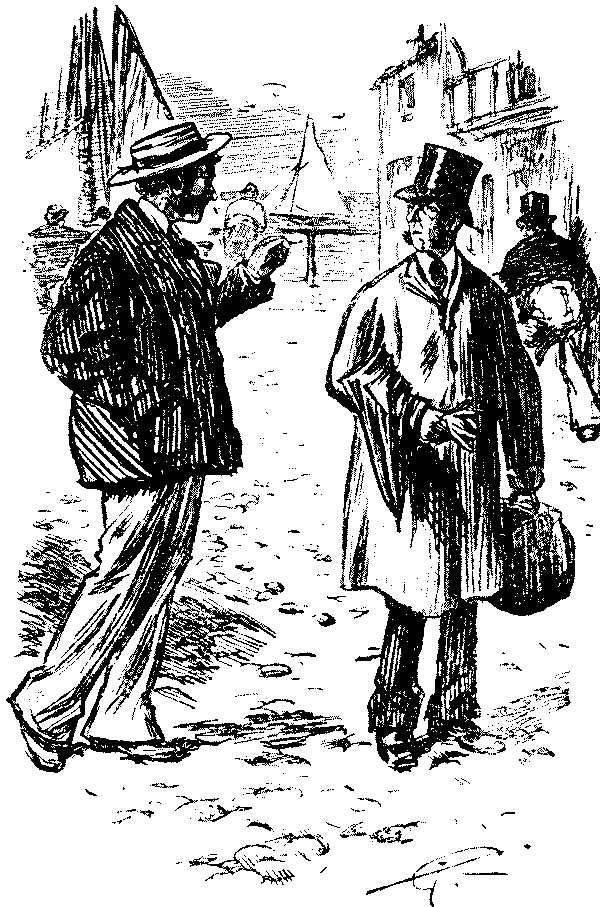
Yachting Friend (playfully). "Have you any experience of squalls, Brown?"
Brown. "Squalls!" (Seriously.) "My dear sir, I've brought up ten in family!"
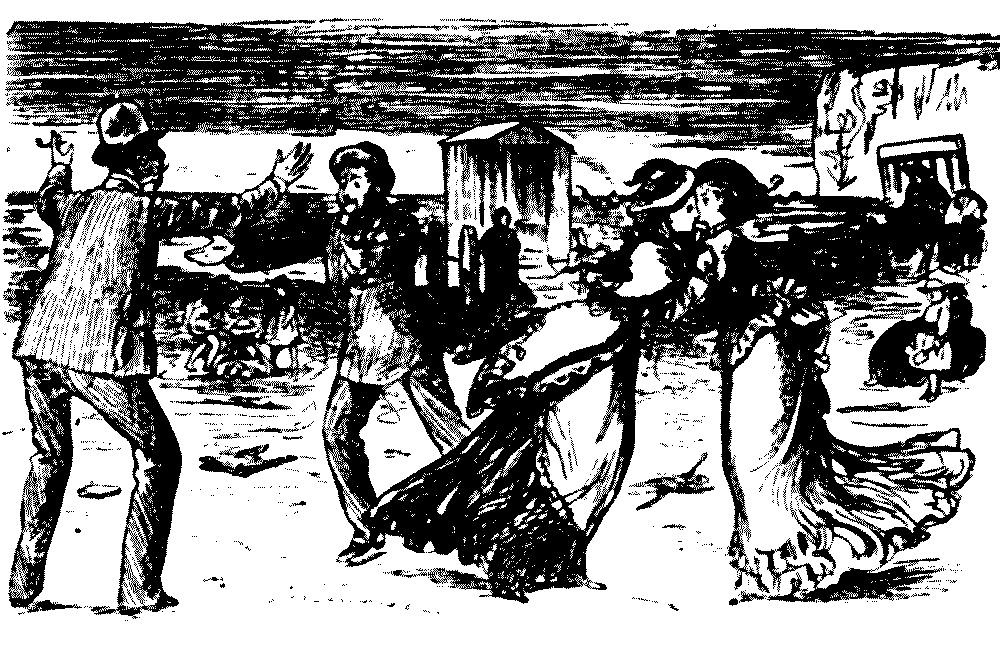
Wearied by London dissipation, the Marjoribanks Browns go, for the sake of perfect quiet, to that picturesque little watering-place, Shrimpington-super-Mare, where they trust that they will not meet a single soul they know.
Oddly enough, the Cholmondeley Joneses go to the same spot with the same purpose.
Now, these Joneses and Browns cordially detest each other in London, and are not even on speaking terms; yet such is the depressing effect of "perfect quiet" that, as soon as they meet at Shrimpington-super-Mare, they rush into each other's arms with a wild sense of relief!
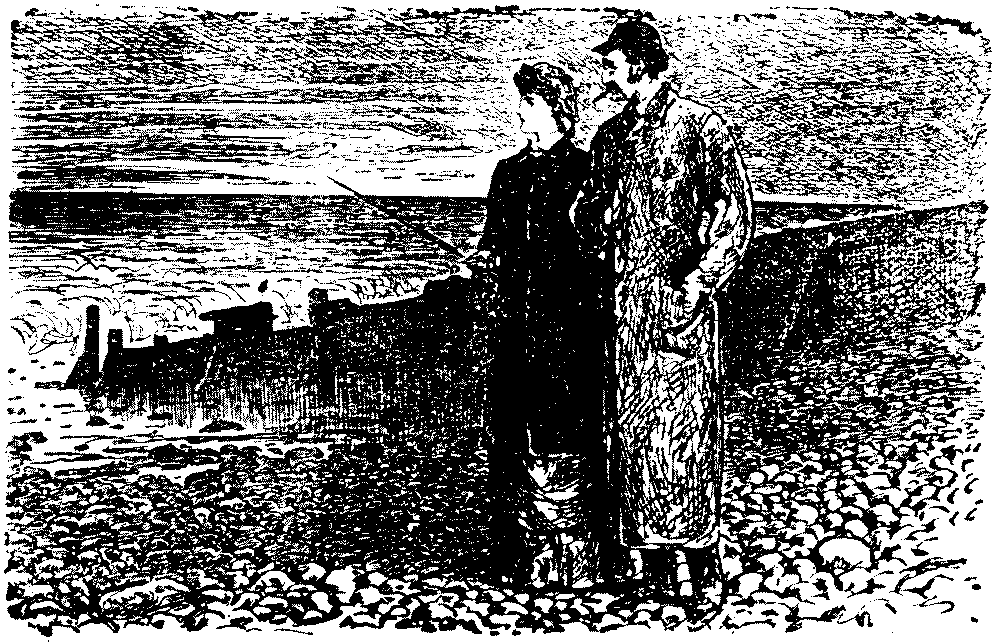
Angelina (who has never seen a revolving light before). "How patient and persevering those sailors must be, Edwin! The wind has blown that light out six times since they first lit it, and they've lighted it again each time!"
Dear Mr. Punch,—This is a spot, which, according to your instructions, I reached last evening. In these same instructions you described it as "a growing place." I fancy it must be of the asparagus order, that vegetable, as you are well aware, taking three years in which to develop itself to perfection. Highburybarn-on-Sea is, I regret to say, in the first stage—judged from an asparagus point of view. I cannot entertain the enthusiastic description of the candid correspondent (I refer to the cutting forwarded by you from an eminent daily paper under the heading, "By the Golden Ocean.") He describes it as "an oasis on the desert coast of Great Britain."[Pg 48] Far be it from me to deny the desert—all I object to is the oasis.
I ask you, sir, if you ever, in the course of the travels in which you have out-rivalled Stanley, Cameron, Livingstone, Harry de Windt, and, may I add, De Rougemont, ever came across an oasis, consisting of two score villas, built with scarcely baked bricks, reposing on an arid waste amid a number of tumbled-down cottages, and surmounted by a mighty workhouse-like hotel looking down on a pre-Adamite beershop?
The sky was blue, the air was fresh, the waves had retreated to sea when I arrived in a jolting omnibus at Highburybarn-on-Sea, and deposited myself and luggage at the Metropolitan Hotel. A page-boy was playing airs on a Jew's-harp when I alighted on the sand-driven steps of the hostelry. He seemed surprised at my arrival, but in most respectful fashion placed his organ of minstrelsy in his jacket pocket, the while he conveyed my Gladstone[Pg 50] bag to my apartment, secured by an interview with an elderly dame, who gave an intelligent but very wan smile when I suggested dinner. She referred me to the head waiter. This functionary pointed in grandiose fashion to the coffee-room, wherein some artistic wall-papering wag had committed atrocities on which it would be libel to comment.
There was only one occupant, a short clean-shaven gentleman with white hair and a red nose, who was apparently chasing space. This turned out to be a militant blue-bottle. Meantime, the head-waiter produced his bill of fare, or rather the remains of it. Nearly every dish had apparently been consumed, for the most tempting plats were removed from the menu by a liberal application of red pencil. Finally, I decided on a fried sole and a steak. The white-haired man still pursued the blue-bottle.
I went up to my room, and after washing with no[Pg 52] soap I returned to the coffee-room. The blue-bottle still had the best of it. The head-waiter, after the lapse of an hour, informed me that the sole would not be long. When it arrived, I found that he spoke the truth. If you have any recollection of the repast which Porthos endured when entertained by Madame Coquenard, you will have some notion of my feast. The head-waiter told me that some bare-legged persons who had waded into the water were shrimp-catchers. I only wished that I were one of them, for at least they found food.
Later on I retired to rest. I was visited in the hours of darkness, to which I had consigned myself, by a horde of mosquitoes, imported, so I was informed in the morning, by American travellers, who never tipped the waiters. I fulfilled their obligations, still gazing on the auburn sand-drift, still looking on the sea, still feeling hungry and murmuring to myself, "Highburybarn-on-Sea would be a capital place for children, if I could only see any cows." A melancholy cocoa-nut shy by the station appeared to afford all the milk in the place.
Yours despondently,
Embarrassment of Riches: Margate.—Mother. "Now, Tommy, which would you rather do—have a donkey ride or watch father bathe?"
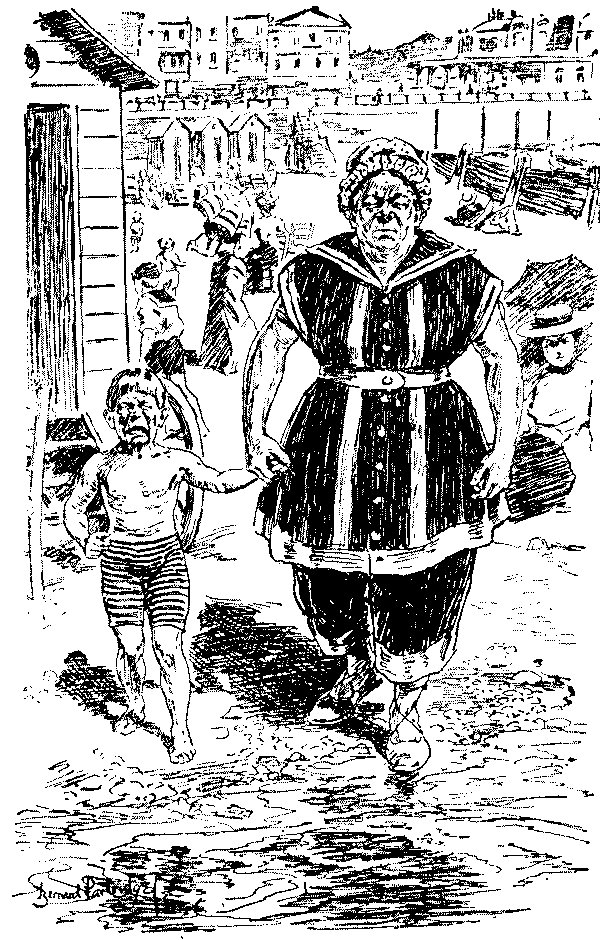
Master Tommy is emphatically of the opinion that the sexes ought not to bathe together.
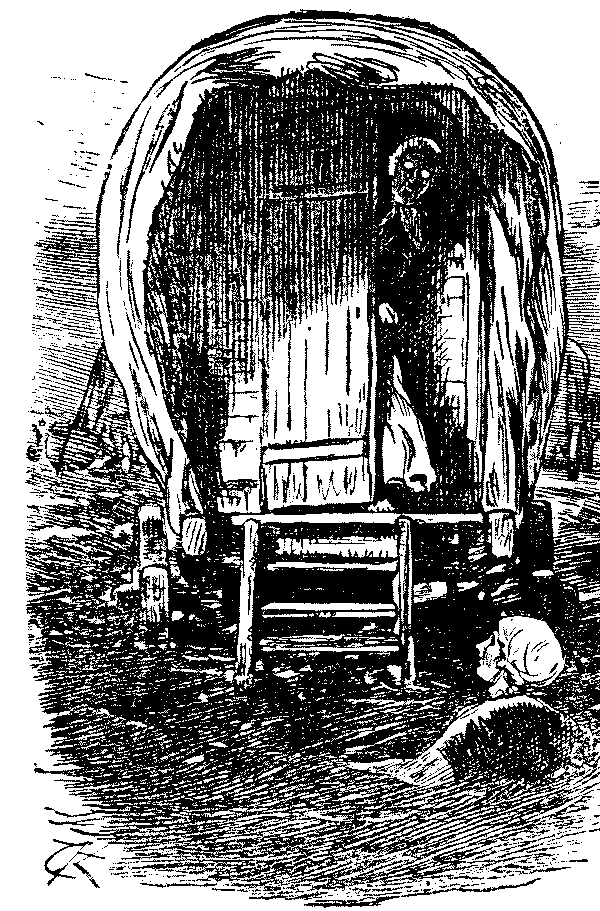
Niece (after a header). "Oh, aunt, you're not coming in with your spectacles on?"
Aunt Clarissa (who is not used to bathe in the "open"). "My dear, I positively won't take off anything more, I'm determined!!"
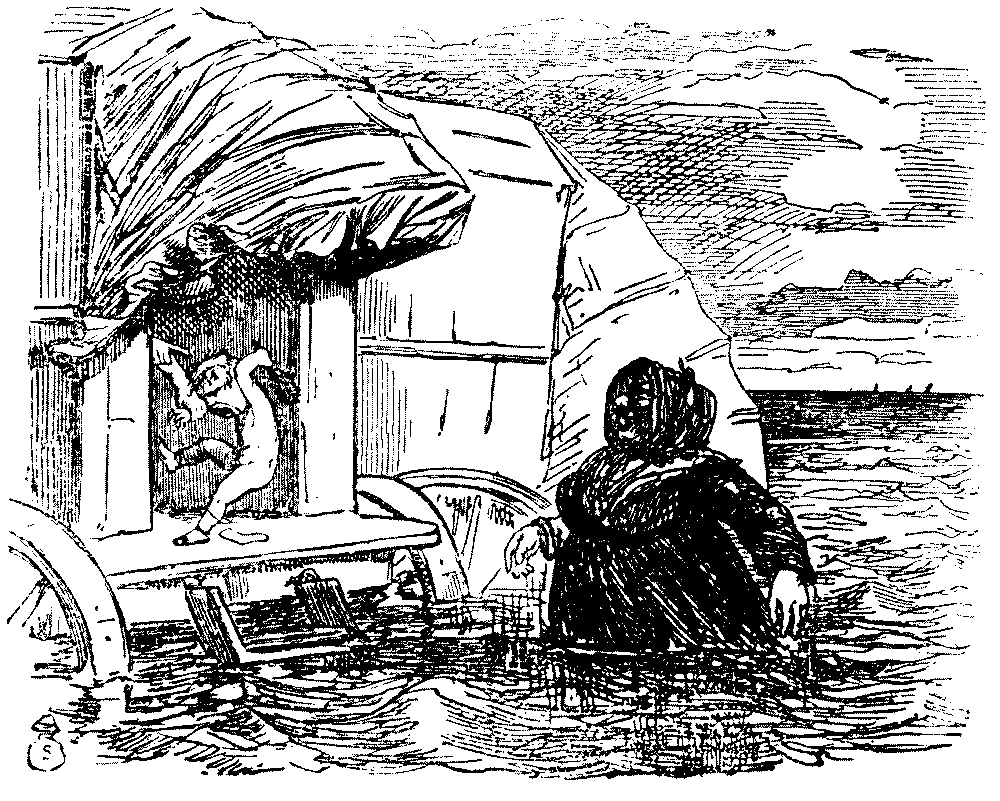
Bathing Woman. "Master Franky wouldn't cry! No! Not he!—He'll come to his Martha, and bathe like a man!"
O Blank new-comer! I have seen,
I see thee with a start:
So gentle looking a Machine,
Infernal one thou art!
When first the sun feels rather hot,
Or even rather warm,
From some dim, hibernating spot
Rolls forth thy clumsy form.
Perhaps thou babblest to the sea
Of sunshine and of flowers;
Thou bringest but a thought to me
Of such bad quarter hours.
I, grasping tightly, pale with fear,
Thy very narrow bench,
Thou, bounding on in wild career,
All shake, and jolt, and wrench.
Till comes an unexpected stop;
My forehead hits the door,
And I, with cataclysmic flop,
Lie on thy sandy floor.
Then, dressed in Nature's simplest style,
I, blushing, venture out;
And find the sea is still a mile
Away, or thereabout.
Blithe little children on the sand
Laugh out with childish glee;
Their nurses, sitting near at hand,
All giggling, stare at me.
Unnerved, unwashed, I rush again
Within thy tranquil shade,
And wait until the rising main
Shall banish child and maid.
Thy doors I dare not open now,
Thy windows give no view;
'Tis late; I will not bathe, I vow;
I dress myself anew.
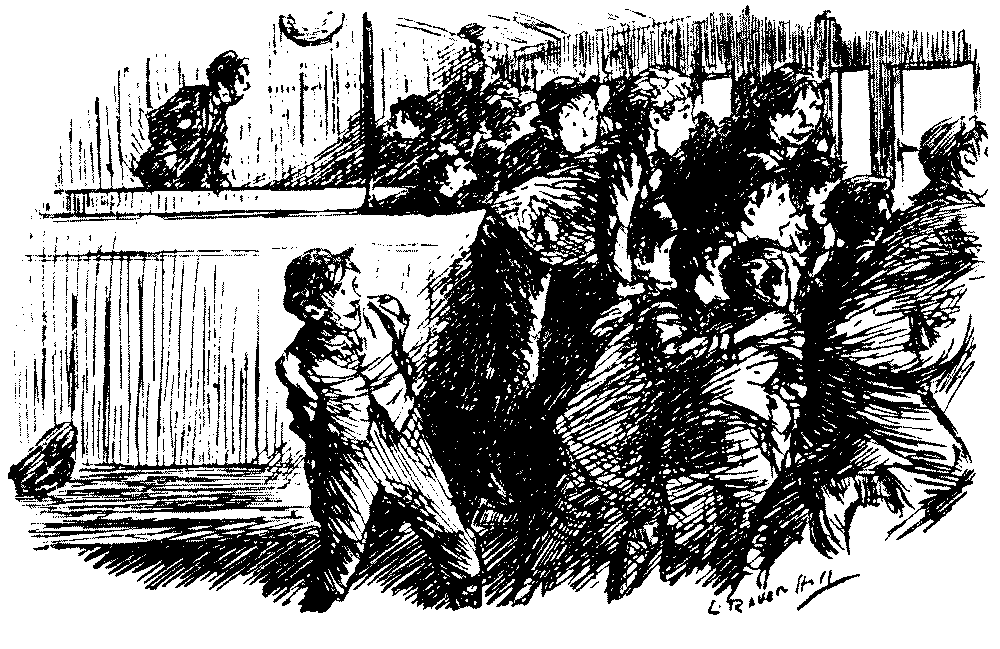
General chorus (as the children's excursion nears its destination). "Oh, I say! There's the sea! 'Ooray!!"
Small boy. "I'll be in fust!"
Pater. Here at last! A nice reward for a long and tedious journey!
Mater. Well, you were always complaining in town.
Pater. Broken chairs, rickety table, and a hideous wall-paper!
Mater. Well, I didn't buy the chairs, make the table, or choose the wall-paper. Discontent is your strong point.
Pater. And is likely to remain so. Really, that German band is unbearable!
Mater. My dear, you have no ear for music. Why, you don't even care for my songs! You used to say you liked them once.
Pater. So I did—thirty years ago!
Mater. Before our marriage! And I have survived thirty years!
Pater. Eh? What do you mean by that, madam?
Mater. Anything you please. But come—dinner's ready.[Pg 58]
Pater. Dinner! The usual thing, I suppose—underdone fish and overdone meat!
Mater. Well, I see that you are determined to make the best of everything, my dear!
Pater. I am glad you think so, my darling!
[And so they sit down to dinner.
Pater. Here at last! What a charming spot! A fitting sequel to a very pleasant journey!
Mater. And yet you are very fond of town!
Pater. This room reminds me of my own cozy study. Venerable chairs, a strange old table, and a quaintly-designed wall-paper.
Mater. Well, I think if I had had to furnish the house, I should have chosen the same things myself. But had they been ever so ugly, I feel sure that you would have liked them. You know, sir, that content is your strong point.
Pater. I am sure that I shall find no opportunity of getting any merit (after the fashion of Mark Tapley) for being contented in this pleasant spot. What a capital German band!
Mater. I don't believe that you understand[Pg 60] anything about music, sir. Why, you even pretend that you like my old songs!
Pater. And so I do. Every day I live I like them better and better. And yet I heard them for the first time thirty years ago!
Mater. When we were married! And so I have survived thirty years!
Pater. Eh? What do you mean by that, madam?
Mater. That I am a living proof that kindness never kills. How happy we have been! But come—dinner's ready.
Pater. Dinner! The usual thing, I suppose—a nice piece of fish and a juicy joint. Now, that's just what I like. So much better than our pretentious London dinners! Not that a London dinner is not very good in its proper place.
Mater. Well, I see that you are determined to make the best of everything, my dear.
Pater. I am glad you think so, my darling!
[And so they sit down to dinner.
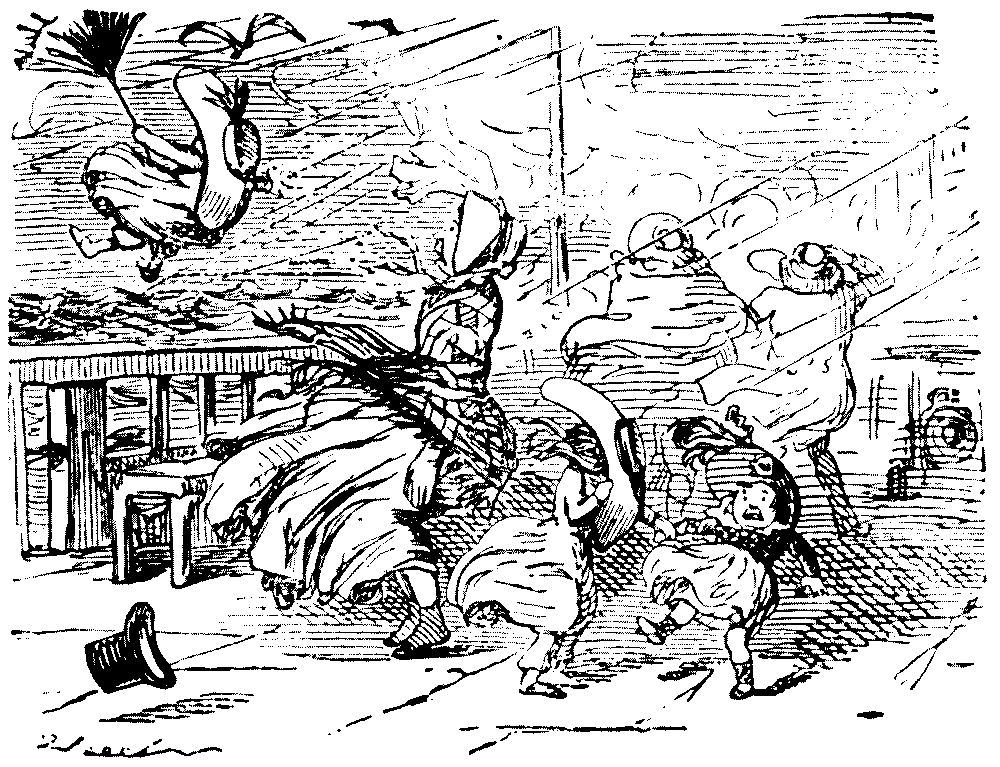
Nursemaid. "Lawk! There goes Charley, and he's took his mar's parasol. What will missus say?"
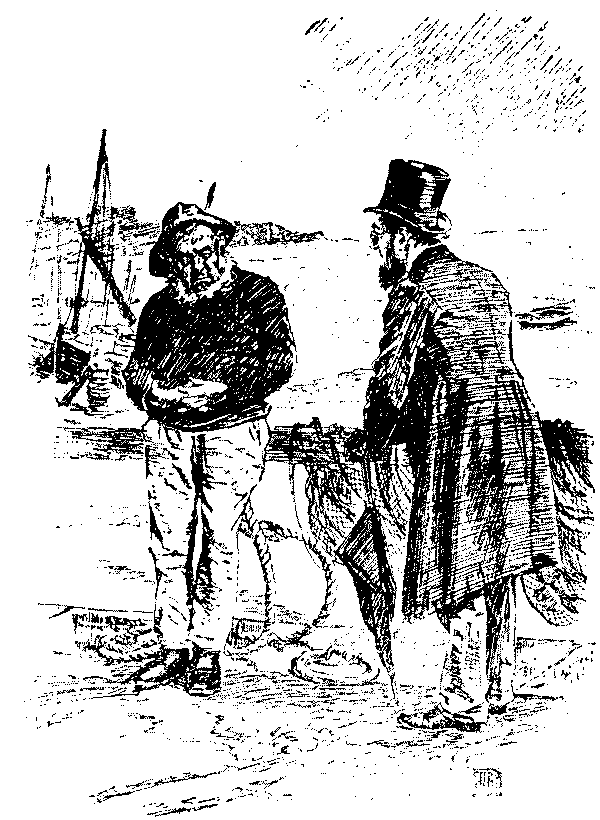
Temperance Enthusiast. "Look at the beautiful lives our first parents led. Do you suppose they ever gave way to strong drink?"
The Reprobate. "I 'xpect Eve must 'a' done. She saw snakes!"
Sympathising Mr. Punch,
With the desire of enjoying a few days of tranquillity and a few dips in the sea, I have arrived and taken lodgings at this "salubrious watering-place" (as the guide-books choose to call it), having heard that it was quiet, and possessed of a steep, cleanly, and bathe-inviting beach. As to the latter point, I find that fame has not belied[Pg 63] it; but surely with a view to tempt me into suicide, some demon must have coupled the term "quiet" with this place. Quiet! Gracious Powers of Darkness! if this be your idea of a quiet spot to live in, I wonder what, according to your notion, need be added to its tumult to make a noisy town. Here is a list of aural tortures wherewith we are tormented, which may serve by way of time-table to advertise the musical attractions of the place:—
1 a.m.—Voices of the night. Revellers returning home.
1.30 a.m.—Duet, "Io t'amo", squealed upon the tiles, by the famous feline vocalists Mademoiselle Minette and Signor Catterwaulini.
2 a.m.—Barc-arole and chorus, "Bow wow wow" (Bach), by the Bayers of the Moon.
3 a.m.—Song without words, by the early village cock.
3.30 a.m.—Chorus by his neighbours, high and low, mingling the treble[Pg 64] of the Bantam with the Brahma's thorough bass.
4 a.m.—Twittering of swallows, and chirping of early birds, before they go to catch their worms.
4.45 a.m.—Meeting of two natives, of course just under your window, who converse in a stage-whisper at the tip-top of their voices.
5 a.m.—Stampede of fishermen, returning from their night's work in their heavy boots.
6 a.m.—Start of shrimpers, barefooted, but occasionally bawling.
7 a.m.—Shutters taken down, and small boys sally forth and shout to one another from the two ends of the street.
7.15 a.m.—"So-holes! fine fresh so-holes!"
7.30 a.m.—"Mack'reel! fower a shillun! Ma-a-ack'reel!"
8 a.m.—Piano play begins, and goes on until midnight.
8.25 a.m.—Barrel-organ at the corner. Banjo in the distance.
9 a.m.—German band to right of you. Ophicleide out of time, clarionette out of tune.
9.30 a.m.—"Pa-aper, mornin' pa-aper! Daily Telegraft!"
9.45 a.m.—German band to left of you. Clarionette and cornet both out of time and tune.
10.15 a.m.—A key-bugler and a bag-piper a dozen yards apart.
11 a.m.—Performance of Punch and Toby, who barks more than is good for him.
11.30 a.m.—Bellowing black-faced ballad-bawlers, with their banjoes and their bones.
Such is our daily programme of music until noon, and such, with sundry variations, it continues until midnight. Small wonder that I have so little relish for my meals, and that, in spite of the sea air, I can hardly sleep a wink. I shall return to Town to-morrow, for surely all the street tormentors must be out of it, judging by the numbers that now plague the sad seaside.
Miserrimus.
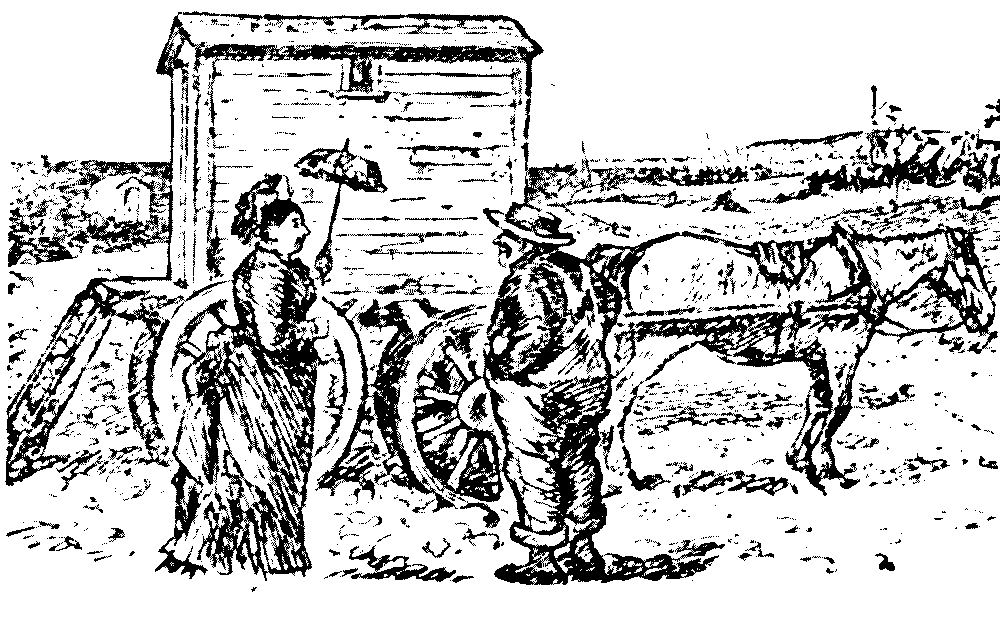
Bathing-man. "Yes, mum, he's a good old 'orse yet. And he's been in the salt water so long, he'll make capital biled beef when we're done with him!!!"
Our Poetess. "Do not talk to me of dinner, Edwin. I must stay by this beautiful Sea, and drink it all in!"
Bill the Boatman. "Lor! She's a thirsty one too!"
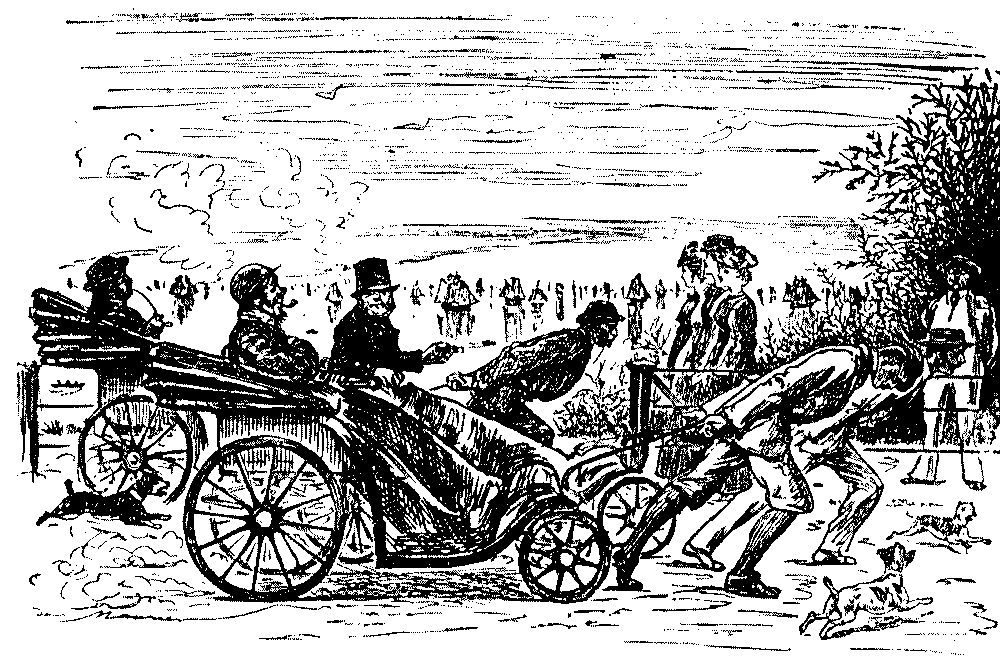
Hire bath-chairs, put the bath-chairmen inside, and drag them as fast as you can up and down the parade.
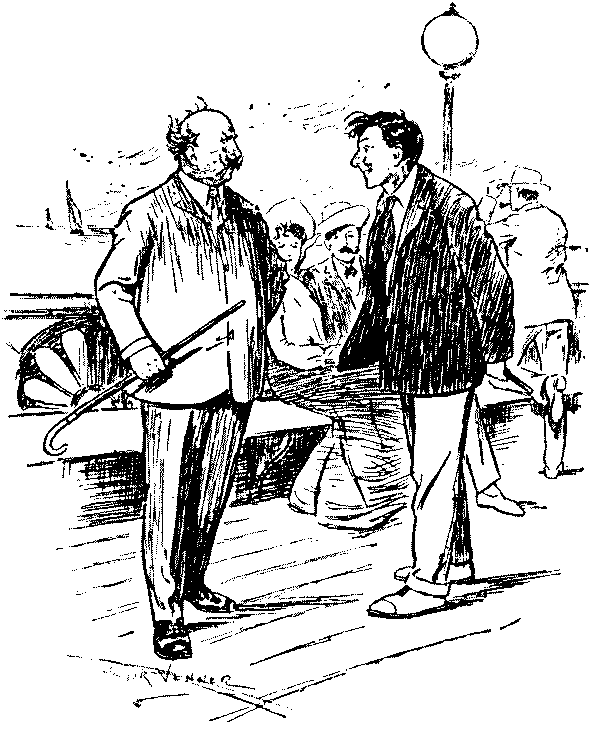
Enthusiast of the "No Hat Brigade" (to elderly gentleman, who has just lost his hat). "Fine idea this, sir, for the hair, eh?"
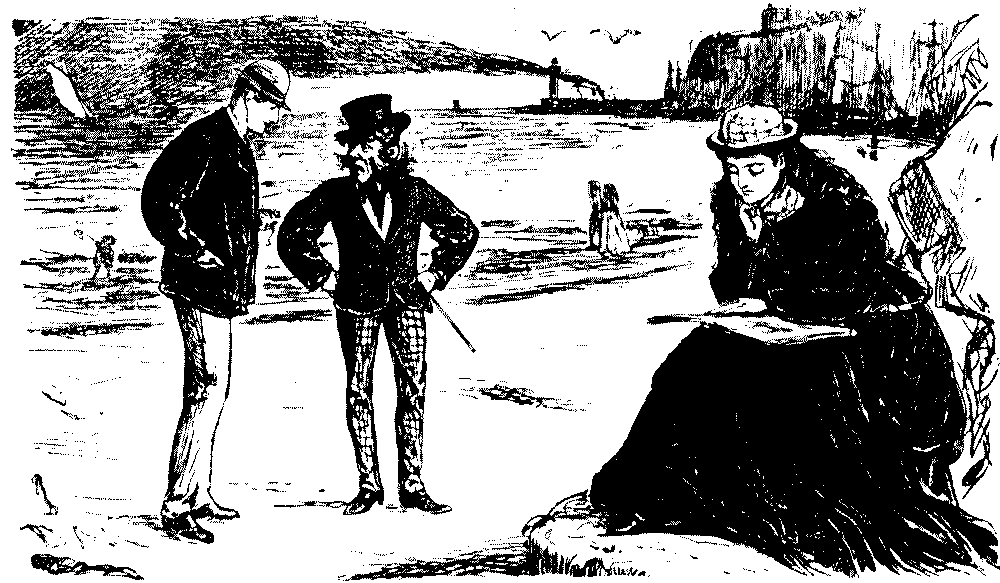
Jones. "Hullo, Brown, what's the matter with you and Mrs. Brown?"
Brown. "Matter? Why, do you know what they call us down here? They call us Beauty and the Beast! Now I should like to know what my poor wife has done to get such a name as that!"
I sat on a slippery rock,
In the grey cliff's opal shade,
And the wanton waves went curvetting by
Like a roystering cavalcade.
And they doffed their crested plumes,
As they kissed the blushing sand,
Till her rosy face dimpled over with smiles
At the tricks of the frolicsome band.
Then the kittywake laughed, "Ha! ha!"
And the sea-mew wailed with pain,
As she sailed away on the shivering wind
To her home o'er the surging main.
And the jelly-fish quivered with rage,
While the dog-crabs stood by to gaze,
And the star-fish spread all her fingers abroad,
And sighed for her grandmothers' days.
And the curlew screamed, "Fie! fie!"
And the great gull groaned at the sight,
And the albatross rose and fled with a shriek
To her nest on the perilous height.
Good gracious! the place where I sat
With sea-water was rapidly filling,
And a hoarse voice cried, "Sir, you're caught by the tide!
And I'll carry ye off for a shilling!"
"Local Colour."—Place: South Parade, Cheapenham-on-Sea.—Edith. "Mabel dear, would you get me Baedeker's Switzerland and the last Number of the World."
Mabel. "What do you want them for?"
Edith. "Oh, I'm writing letters, and we're in the Engadine, you know, and I just want to describe some of our favourite haunts, and mention a few of the people who are staying there—here, I mean."
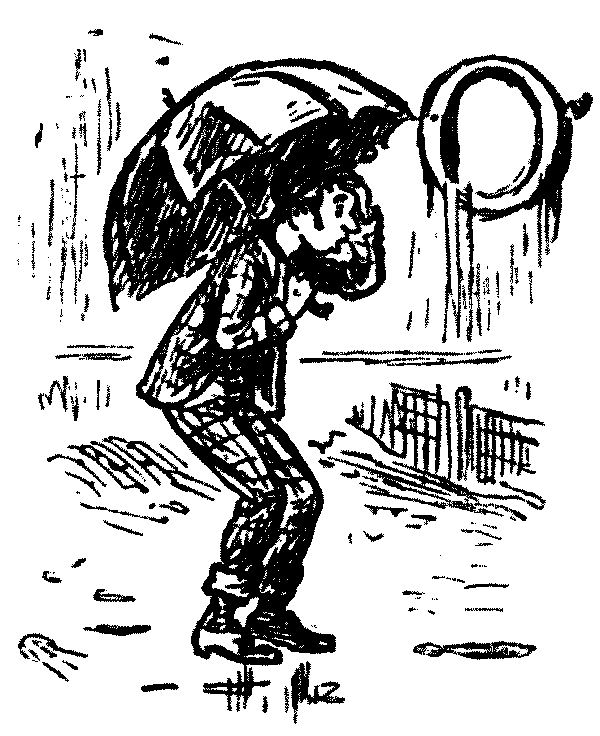
Oh dreary, dreary, dreary me!
My jaw is sore with yawning—
I'm weary of the dreary sea,
With its roaring beach
Where sea-gulls screech,
And shrimpers shrimp,
And limpets limp,
And winkles wink,
And trousers shrink;
And the groaning, moaning, droning tide
Goes splashing and dashing from side to side,
With all its might, from morn to night,
And from night to morning's dawning.
The shore's a flood of puddly mud,
And the rocks are limy and slimy—
And I've tumbled down with a thud—good lud!—
And I fear I swore,
For something tore;
And my shoes are full
Of the stagnant pool;
And hauling, sprawling, crawling crabs
Have got in my socks with starfish and dabs;
And my pockets are swarming with polypes and prawns,
And noisome beasts with shells and horns,
That scrunch and scrape, and goggle and gape,
Are up my sleeve, I firmly believe—
And I'm horribly rimy and grimy.
I'm sick of the strand, and the sand, and the band,
And the niggers and jiggers and dodgers;
And the cigars of rather doubtful brand;
And my landlady's "rights",
And the frequent fights
On wretched points
Of ends of joints,
Which disappear, with my brandy and beer,
In a way that, to say the least, is queer.
And to mingle among the throng I long,
And to poke my joke and warble my song—
But there's no one near
On sands or pier,
For everyone's gone and I'm left alone,
The Last of the Seaside Lodgers!
Note by Our Man Out of Town—Watering places—resorts where the visitor is pumped dry.
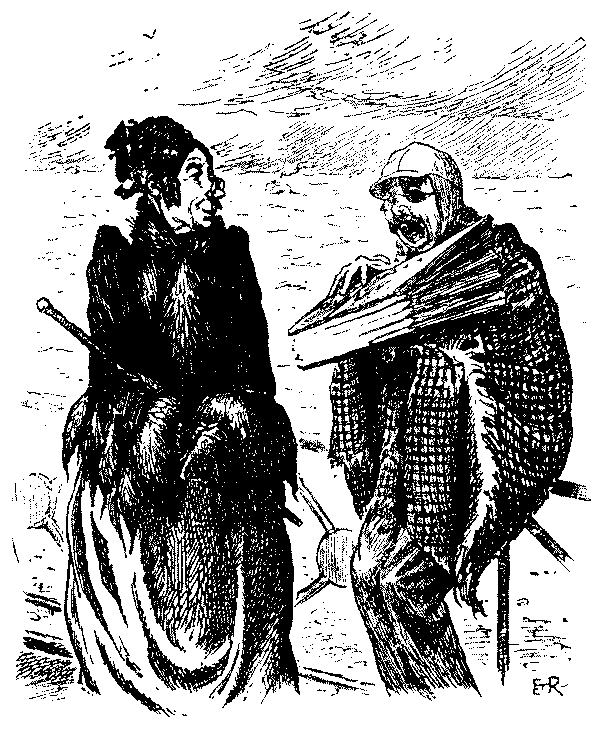
Seedy Individual (suddenly and with startling vigour)—
"Aoh! Floy with me ercross ther sea,
Ercross ther dork lergoon!!"
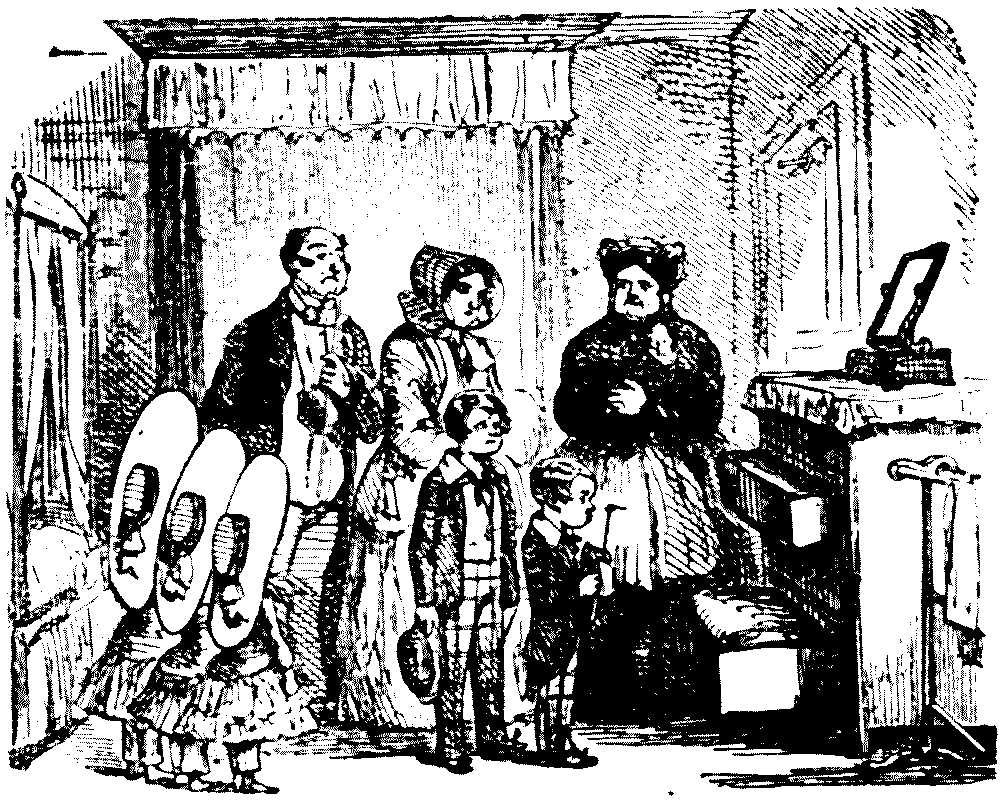
Lodging-House Keeper. "On'y this room to let, mem. A four-post—a tent—and a very comfortable double-bedded chest of drawers for the young gentlemen."
Why does not some benefactor to his species discover and publish to a grateful world some rational way of spending a wet day at the seaside? Why should it be something so unutterably miserable and depressing that its mere recollection afterwards makes one shudder?
This is the first really wet day that we have had for a fortnight, but what a day! From morn to dewy eve, a summer's day, and far into the black night, the pitiless rain has poured and poured and poured. I broke the unendurable monotony of gazing from the weeping windows of my seaside lodging, by rushing out wildly and plunging madly into the rainy sea, and got drenched to the skin both going and returning. After changing everything, as people say but don't mean, and thinking I saw something like a break in the dull leaden clouds, I again rushed out, and called on Jones, who has rooms in an adjacent terrace, and, with some difficulty, persuaded him to accompany me to the only billiard table in the miserable place. We both got gloriously wet on our way to this haven of amusement, and were received with the pleasing intelligence that it was engaged by a private party of two, who had taken it until the rain ceased, and, when that most improbable event happened, two other despairing lodgers had secured the reversion. Another rush home, another drenching, another change of everything, except the weather, brought the welcome sight of dinner, over which we fondly lingered for nearly two mortal hours.
But one cannot eat all day long, even at the seaside on a wet day, and accordingly at four o'clock I was again cast upon my own resources.
I received, I confess, a certain amount of grim satisfaction at seeing Brown—Bumptious Brown, as we call him in the City, he being a common councilman, or a liveryman, or something of that kind—pass by in a fly, with heaps of luggage and children, all looking so depressingly wet,—and if he had not the meanness to bring with him, in a half-dozen hamper,[Pg 82] six bottles of his abominable Gladstone claret! He grinned at me as he passed, like a Chester cat, I think they call that remarkable animal, and I afterwards learnt the reason. He had been speculating for a rise in wheat, and, as he vulgarly said, the rain suited his book, and he only hoped it would last for a week or two! Ah! the selfishness of some men! What cared he about my getting wet through twice in one day, so long as it raised the price of his wretched wheat?
My wife coolly recommended me to read the second volume of a new novel she had got from the Library, called, I think, East Glynne, or some such name, but how can a man read in a room with four stout healthy boys and a baby, especially when the said baby is evidently very uncomfortable, and the four boys are playing at leap-frog? Women have this wonderful faculty, my wife to a remarkable extent. I have often, with unfeigned astonishment, seen her apparently lost in the sentimental troubles of some imaginary heroine, while the noisy domestic realities around her have gone on unheeded.
I again took my place at the window, and gazed upon the melancholy sea, and remembered, with a smile of bitter irony, how I had agreed to pay an extra guinea a week for the privilege of facing the sea!—and such a sea! It was, of course, very low water—it generally is at this charming place; and the sea had retired to its extremest distance, as if utterly ashamed of its dull, damp, melancholy appearance. And there stood that ridiculous apology for a pier, with its long, lanky, bandy legs, on which I have been dragged every evening to hear the band play. Such a band! The poor wheezy cornet was bad enough, but the trombone, with its two notes that it jerked out like the snorts of a starting train, was a caution. Oh! that poor "Sweetheart", with which we were favoured every evening! I always pictured her to myself sitting at a window listening, enraptured, to a serenade from that trombone!
But there's no band to-night, not a solitary promenader on the bandy-legged pier, I even doubt if the pier master is sitting as usual at the receipt of custom, and I pull down the blind, to shut out the miserable prospect, with such an energetic jerk that I bring down the whole complicated machinery, and nearly frighten baby into a fit, while the four irreverent boys indulge in a loud guffaw.
Thank goodness, on Saturday I exchange our miserable, wheezy, asthmatic band for the grand orchestra of the Covent Garden Promenade Concerts, and the awful perfume of rotten seaweed for the bracing atmosphere of glorious London.
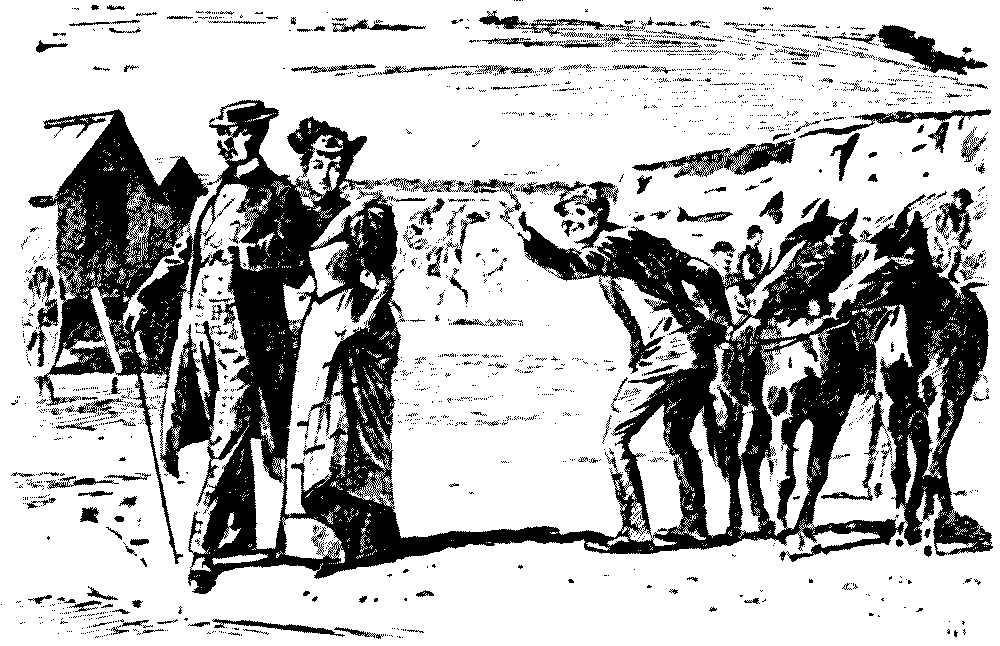
Man with Sand Ponies. "Now then, Mister, you an' the young lady, a pony apiece? 'Ere y'are!"
Snobley (loftily). "Aw—I'm not accustomed to that class of animal."
Man (readily). "Ain't yer, sir? Ne' mind." (To boy.) "'Ere, Bill, look sharp! Gent'll have a donkey!"
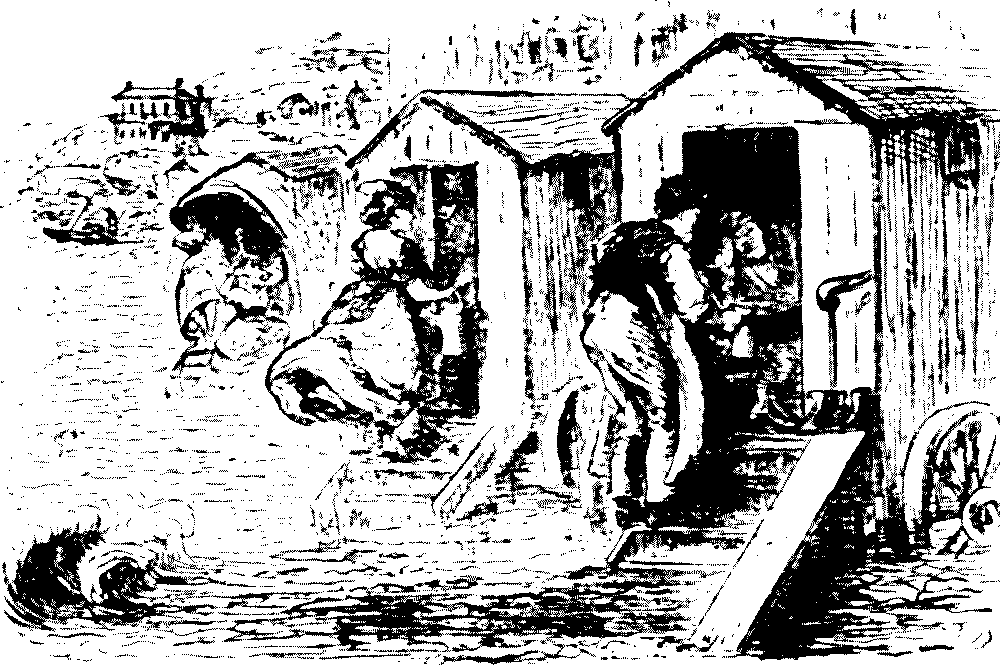
In consequence of the English watering-places being crowded, people are glad to find sleeping accommodation in the bathing-machines.
Boots (from Jones's Hotel). "I've brought your shaving water, sir; and you'll please to take care of your boots on the steps, gents: the tide's just a comin' in!"
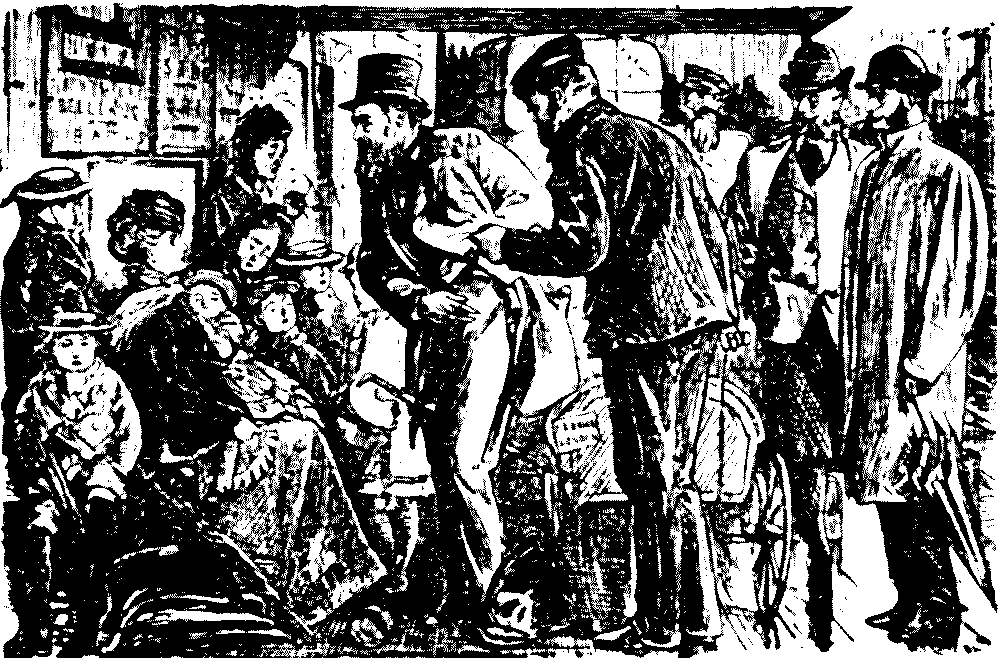
All the family have colds, except the under-nurse, who has a face-ache. Poor materfamilias, who originated the trip, is in despair at all the money spent for nothing, and gives way to tears. Paterfamilias endeavours to console her with the reflection that "he knew how it would be, but that, after all, St. John's Wood, where they live, is such a healthy place that, with care and doctoring, they will soon be nearly as well as if they had never left it!"
[Two gay bachelors may be seen contemplating paterfamilias and his little group. Their interest is totally untinged with envy.
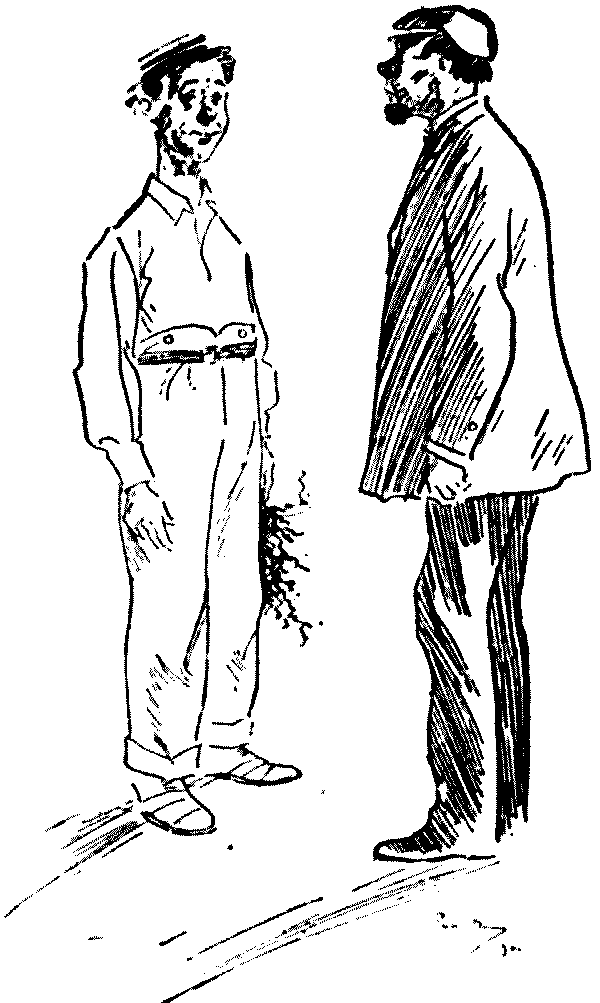
"Do you know anything good for a cold?"
"Yes."
"What is it?"
"Have you got the price of two Scotch whiskies on you?"
"No."
"Then it's no use my telling you."
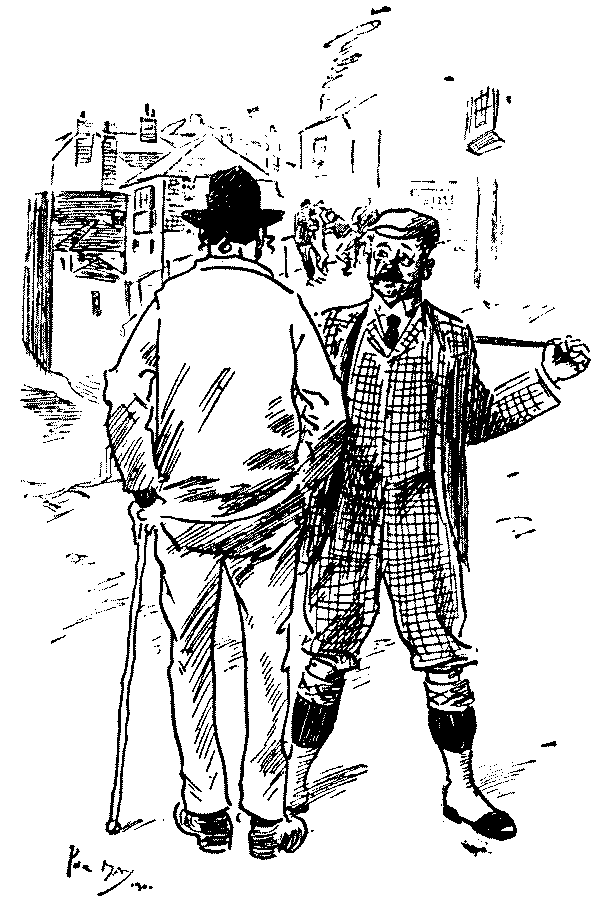
Snobson (to inhabitant of out-of-way seaside resort). "What sort of people do you get down here in the summer?"
Inhabitant. "Oh, all sorts, zur. There be fine people an' common people, an' some just half-an'-half, like yourself, zur."
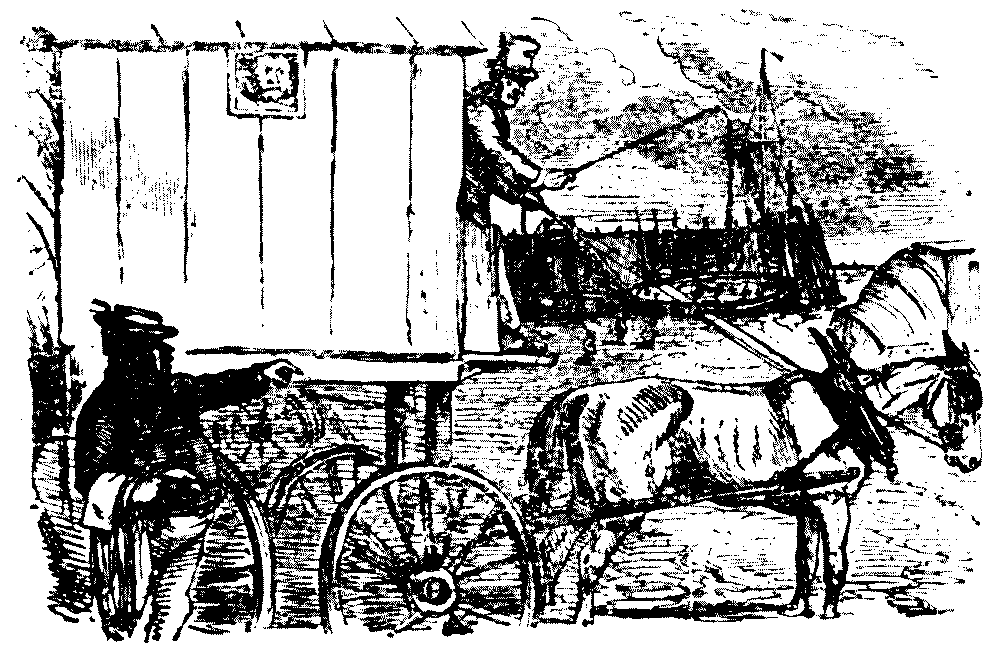
Bathing Attendant. "Here, Bill! The gent wants to be took out deep—take 'im into the drain!!"
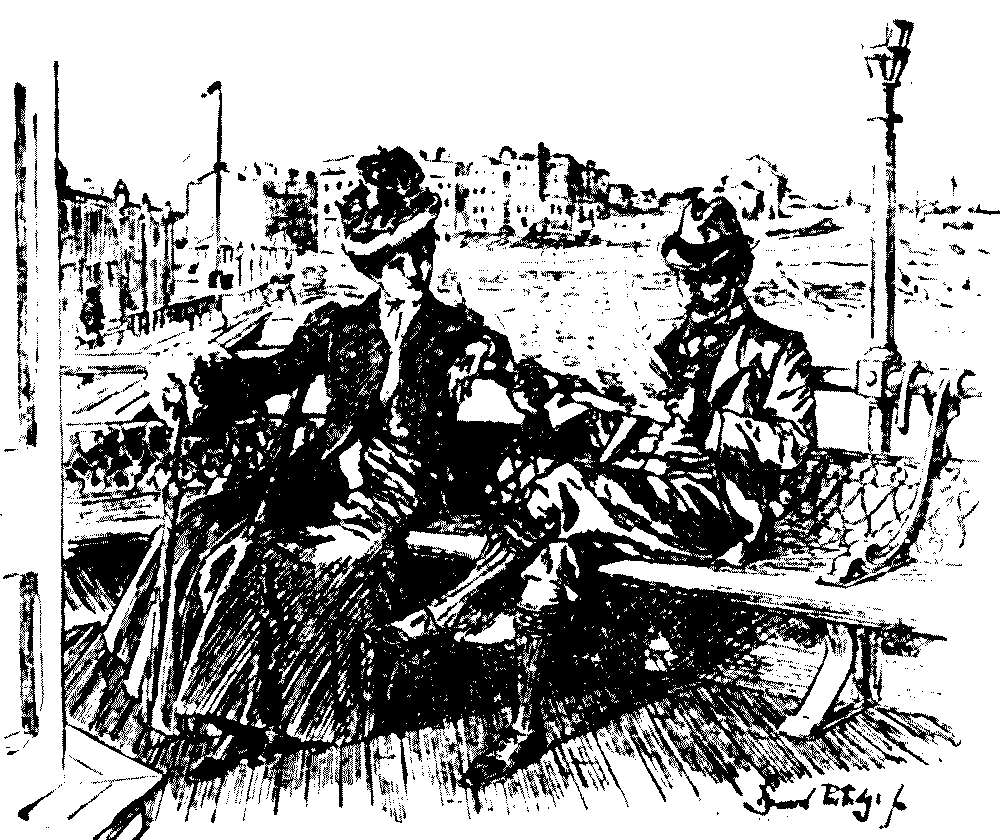
She. "How much was old Mr. Baskerville's estate sworn at by his next-of-kin?"
He. "Oh—a pretty good lot."
She. "Really? Why, I heard he died worth hardly anything!"
He. "Yes, so he did—that's just it."
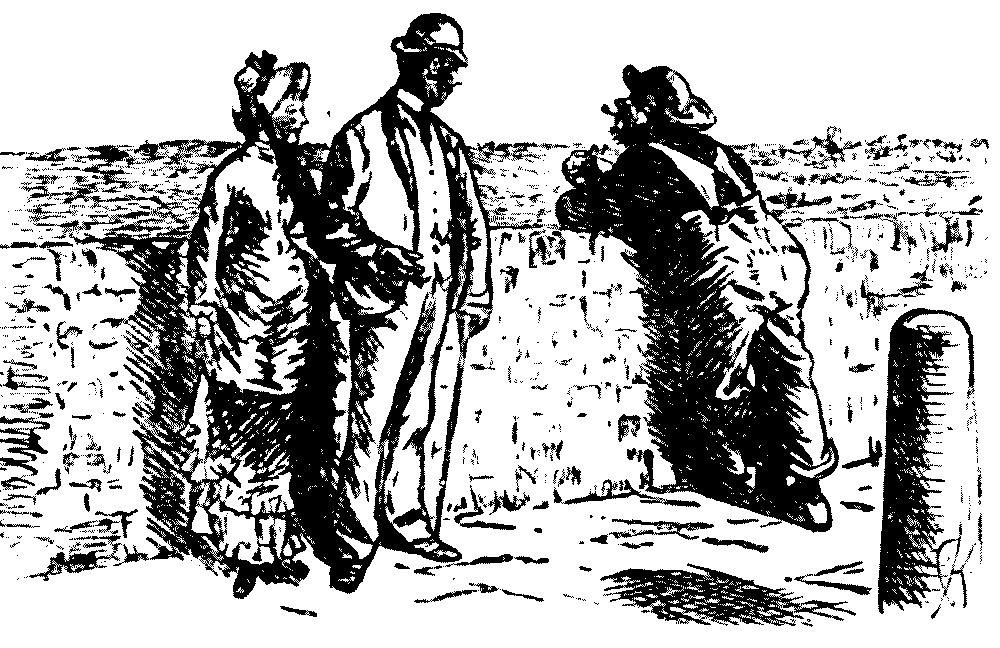
Angelina (scientific). "Do you smell the iodine from the sea, Edwin? Isn't it refreshing?"
Old Salt (overhearing). "What you smell ain't the sea, miss. It's the town drains as flows out just 'ere!"
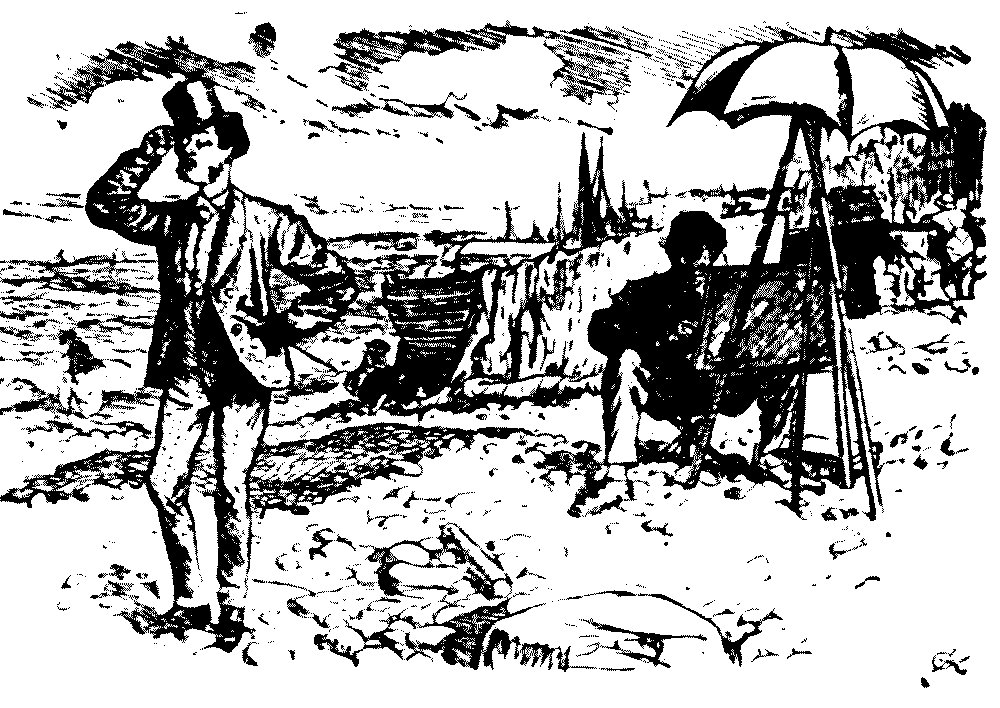
Excursionist (to himself). "Ullo! 'ere's one o' them artists. 'Dessay 'e'll want a genteel figger for 'is foreground. I'll stand for 'im!!!"
When the days are bright and hot,
In the month of August,
When the sunny hours are not
Marred by any raw gust,
Then I turn from toil with glee,
Sing a careless canto,
And to somewhere by the sea
Carry my portmanteau.
Shall I, dreaming on the sand,
Pleased with all things finite,
Envy Jones who travels and
Climbs an Apennine height—
Climbs a rugged peak with pain,
Literally speaking,
Only to descend again
Fagged with pleasure-seeking?
Smith, who, worn with labour, went
Off for rest and leisure,
Races round the Continent
In pursuit of pleasure:
Having lunched at Bâle, he will
At Lucerne his tea take,
Riding till he's faint and ill,
Tramping till his feet ache.
Shall I, dreaming thus at home,
Left ashore behind here,
Envy restless men who roam
Seeking what I find here?
[Pg 90]Since beside my native sea,
Where I sit to woo it,
Pleasure always comes to me,
Why should I pursue it?
Extra Special.—Paterfamilias (inspecting bill, to landlady). I thought you said, Mrs. Buggins, when I took these apartments, that there were no extras, but here I find boots, lights, cruets, fire, table-linen, sheets, blankets and kitchen fire charged.
Mrs. Buggins. Lor' bless you, sir, they're not extras, but necessaries.
Paterfamilias. What, then, do you consider extras?
Mrs. Buggins. Well, sir, that's a difficult question to answer, but I should suggest salad oil, fly-papers, and turtle soup.
[Paterfamilias drops the subject and pays his account.
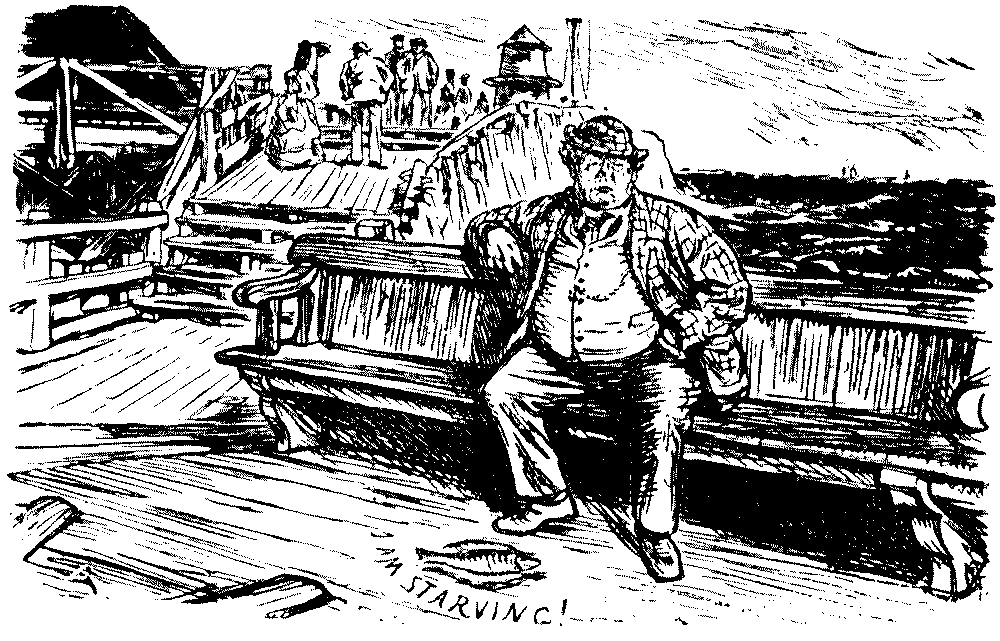
Stout Visitor (on discovering that, during his usual nap after luncheon, he has been subjected to a grossly personal practical joke). "It's one o' those dashed artists that are staying at the 'Lord Nelson' 'a' done this, I know!"
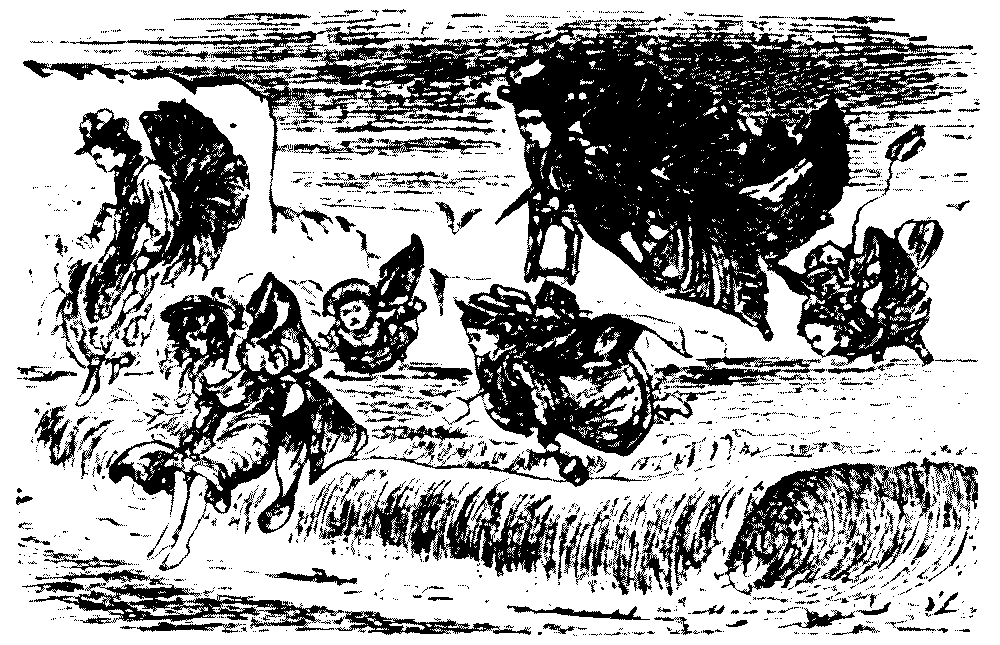
Ethel, who is not to have a seaside trip this year, dreams every night that she and her mamma and aunt and sisters spread their sash-bows and panniers and fly away to the yellow sands.
It nearly broke my widowed art,
When first I tuk the notion,
That parties didn't as they used,
Take reglar to the ocean.
The hinfants, darling little soles,
Still cum quite frequent, bless 'em!
But they is only sixpence each,
Which hardly pays to dress 'em.
The reason struck me all at once,
Says I, "It's my opinion,
The grown-up folks no longer bathes
Because of them vile Sheenions."
The last as cum drest in that style,
Says, as she tuk it horf her,
"I'm sure I shall not know the way
To re-arrange my quoffur!"
By which she ment the ed of air,
Which call it wot they will, sir;
Cum doubtless off a convict at
Millbank or Pentonville, sir.
The Parliament should pass a law,
Which there's sufficient reason;
That folks as wear the Sheenions should
Bathe reg'lar in the season.
I was told it was greatly improved—that there were alterations in the sea-front suggestive of the best moments of the Thames Embankment—that quite "smart" people daily paraded the pier. So having had enough of "Urn-bye", I moved on. The improvements scarcely made themselves felt at the railway station. Seemingly they had not attracted what Mr. Jeames would call "the upper suckles." There were the customary British middle-class matron from Peckham, looking her sixty summers to the full in a sailor hat; the seaside warrior first cousin to the billiard-marker captain with flashy rings, beefy hands, and a stick of pantomime proportions, and the theatrical lady whose connection with the stage I imagine was confined to capering before the footlights. However, they all were there, as I had seen them any summer these twenty years.
But I had been told to go to the Pier, and so to the Pier I went, glancing on my way at the entertainers on the sands, many of whom I found to be old friends. Amongst them was the "h"-less phrenologist, whose insight into character apparently satisfied the parents of any child whose head he selected to examine. Thus, if he said that a particularly stupid-looking little boy would make a good architect, schoolmaster, or traveller for fancy goods, a gentleman in an alpaca-coat and a wide-awake hat would bow gratified acquiescence, a demonstration that would also be evoked from a lady in a dust cloak, when the lecturer insisted that a giggling little girl would make a "first-rate dressmaker and cutter-out."
Arrived at the Pier, I found there was twopence to pay for the privilege of using the extension, which included a restaurant, a band, some talented fleas, and a shop with a window partly devoted to the display of glass tumblers, engraved with legends of an amusing character, such as "Good old Mother-in-Law", "Jack's Night Cap", "Aunt Julia's Half Pint", and so on. There were a number of seats and shelters, and below the level of the shops was a landing-stage, at which twice a day two steamers from or to London removed or landed passengers. During the rest of the four-and-twenty hours it seemed to be occupied by a solitary angler, catching chiefly seaweed. The Band, in spite of its uniform, was not nearly so military as that at "Urn Bye." It contained a pianoforte—an instrument upon which I found the young gentleman who sold the programmes practising during a pause between the morning's selection and the afternoon's performances. But still the Band was a very tuneful one, and increased the pleasure that the presence of so many delightful promenaders was bound to produce. Many of the ladies who walked round and round, talking courteously to 'Arry in all his varieties, wore men's habits, pur et simple (giving them the semblance of appearing in their shirt-sleeves), while their heads were adorned with fair wigs and sailor hats, apparently fixed on together.
These free-and-easy-looking damsels did not seem to find favour in the eyes of certain other ladies of a sedater type, who regarded them (over their novels) with undisguised contempt. These other ladies, I should think, from their conversation and appearance, must have been the very flowers of the flock of Brixton Rise, and the crème de la crême of Peckham Rye society. Of course there were a number of more or less known actors and actresses from London, some of them enjoying a brief holiday, and others engaged in the less lucrative occupation of "resting."
However, the dropping of "h's", even to the accompaniment of sweet music, sooner or later becomes monotonous, and so, after awhile, I was glad to leave the Pier for the attractions of the Upper Cliff. On my way I passed a Palace of Pleasure or Varieties, or Something wherein a twopenny wax-work show seemed at the moment to be one of its greatest attractions. This show contained a Chamber of Horrors, a scene full of quiet humour of Napoleon the Third Lying in State, and an old effigy of George the Third. The collection included the waxen head of a Nonconformist minister, who, according to the lecturer, had been "wery good to the poor", preserved in a small deal-box. There was also the "Key-Dyevie" of Egypt, General Gordon, and Mrs. Maybrick. Tearing myself away from these miscellaneous memories of the past, I ascended to the East Cliff, which had still the "apartments-furnished" look that was wont to distinguish it of yore. There was no change there; and as I walked through the town, which once, as a watering-place, was second only in importance to Bath,—which a century ago had for its M.C. a rival of Beau Nash,—I could not help thinking how astonished the ghosts of the fine ladies and gentlemen who visited "Meregate" in 1789 must be, if they are able to see their successors of to-day—"Good Old Chawlie Cadd", and Miss Topsie Stuart Plantagenet, née Tompkins.
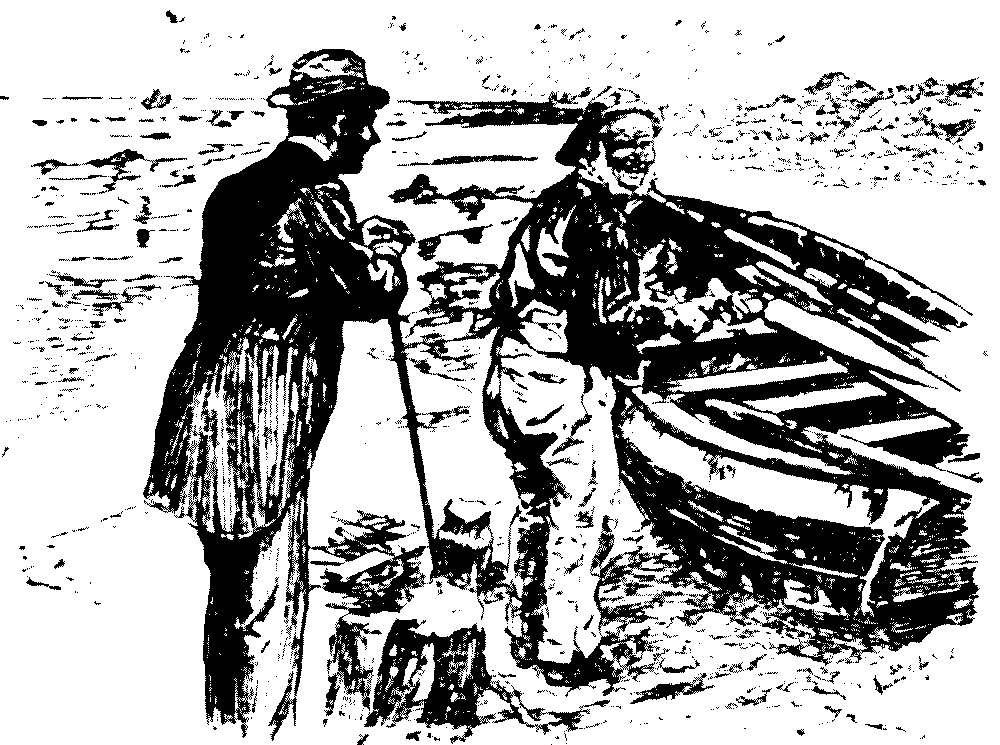
Visitor. "Well, my man, I expect it must have cost you a lot of money to paint your nose that colour!"
Reprobate. "Ah, an' if Oi cud affoord it, Oi'd have it varnished now!"
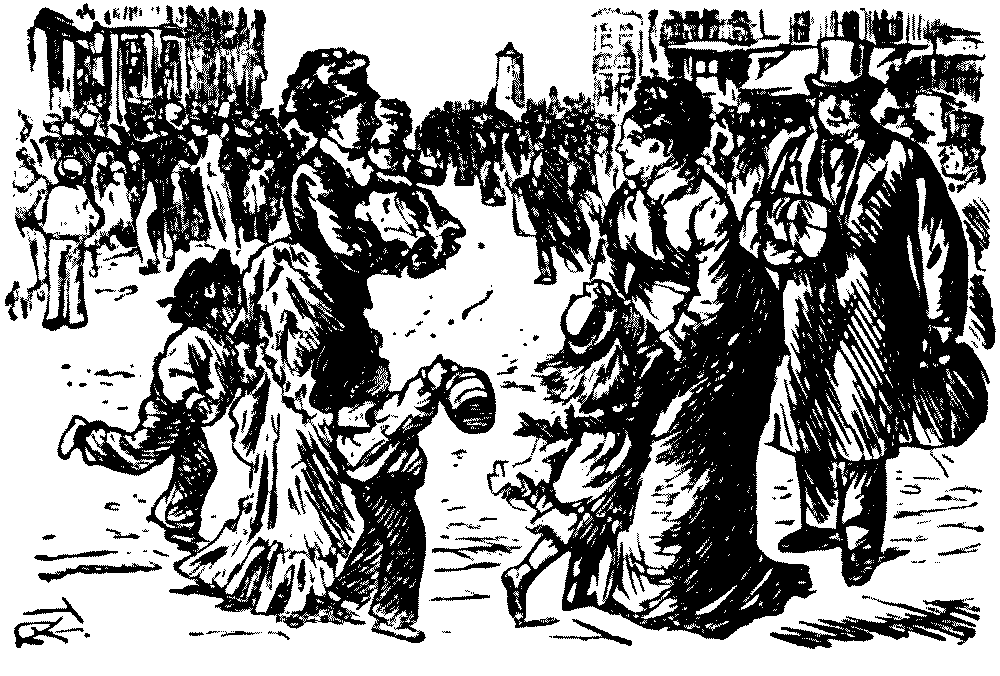
Materfamilias (just arrived at Shrimpville—the children had been down a month before). "Well, Jane, have you found it dull?"
Nurse. "It was at fust, M'm. There was nothink to improve the mind, M'm, till the niggers come down!!"
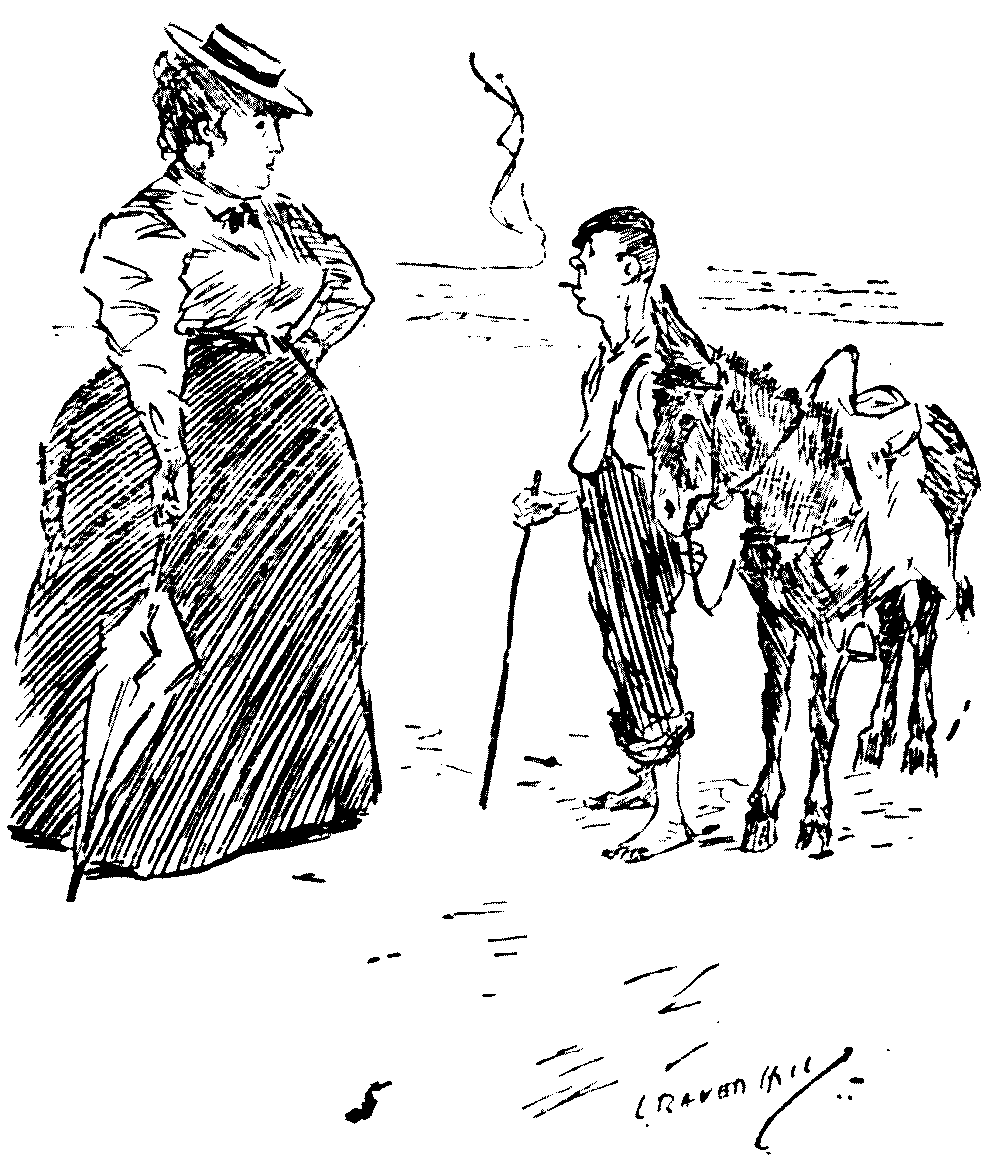
"But, are you sure?"
"Yus, lady. 'E's strong as an 'orse!"
"But how am I to get on?"
"Oh, I'll lift yer!"
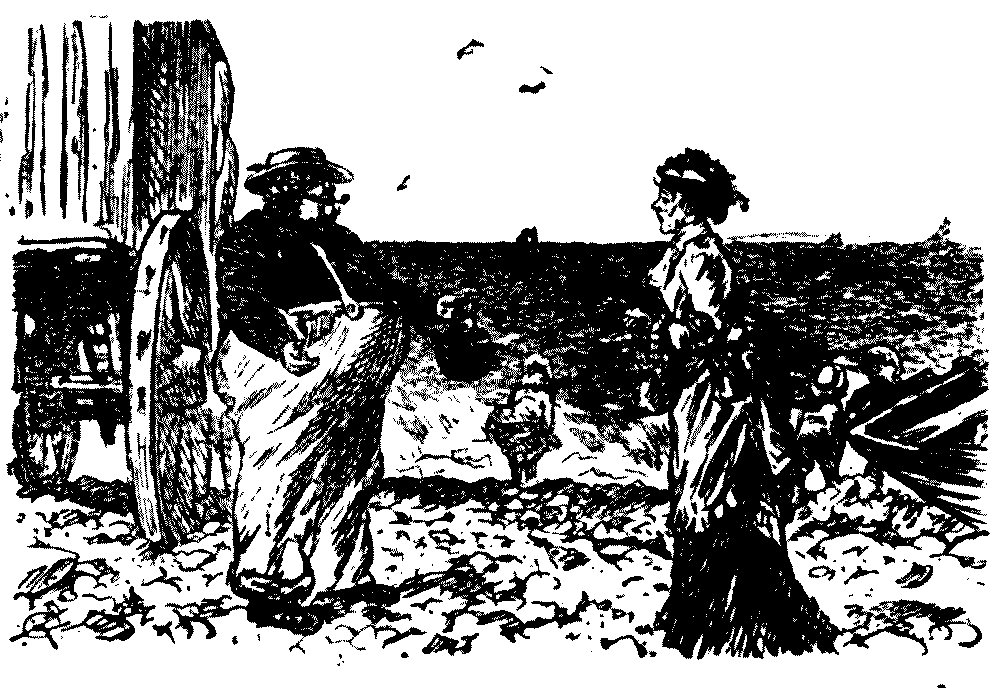
Confiding Spinster. "I'm afraid the sea is too cold for me this morning, Mr. Swabber."
Bathing Man. "Cold, miss! Lor' bless yer, I just took and powered a kittle o' bilin' water in to take the chill off when I see you a comin'!"
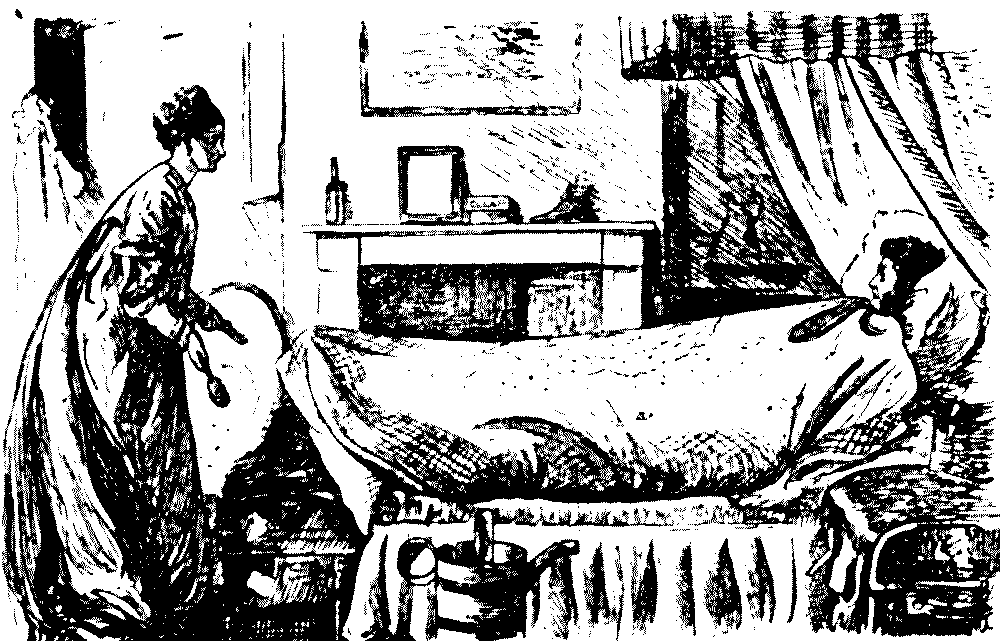
Injured Individual. "Heigho! I did think I should find some refuge from the miseries of the seaside in the comforts of a bed! Just look where my feet are, Maria!"
His Wife. "Well, John! it's only for a month, you know!"
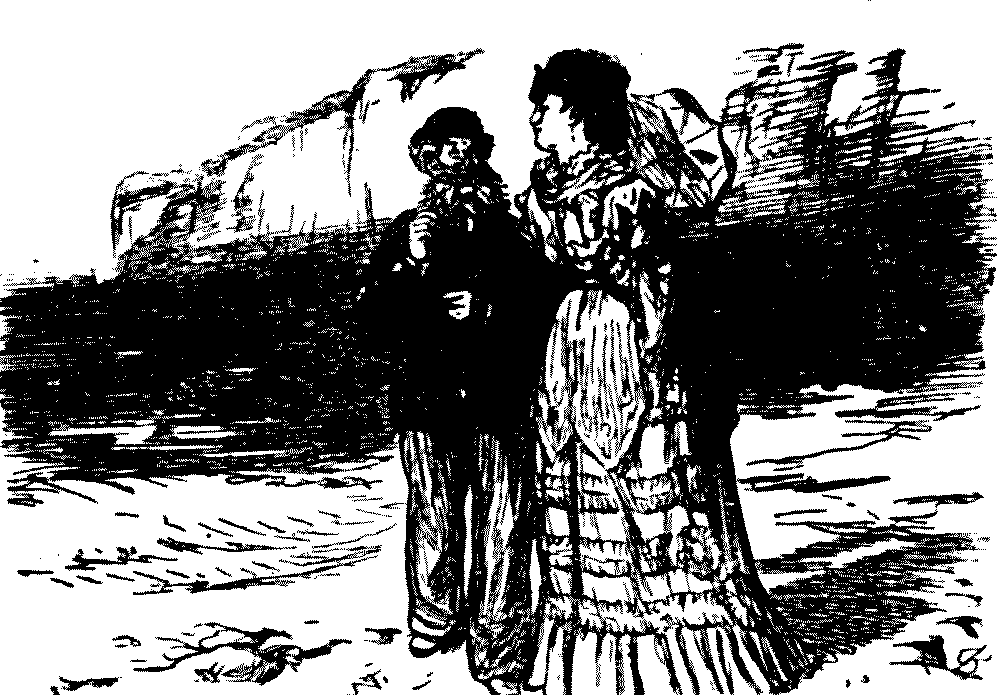
Extract of letter from Laura to Lillie:—"I declare, dear, I never gave the absurd creature the slightest encouragement. I did say, one evening, I thought the little sandy coves about Wobbleswick were charming, especially one. The idea!—of his thinking I was alluding to him!"—— &c., &c.
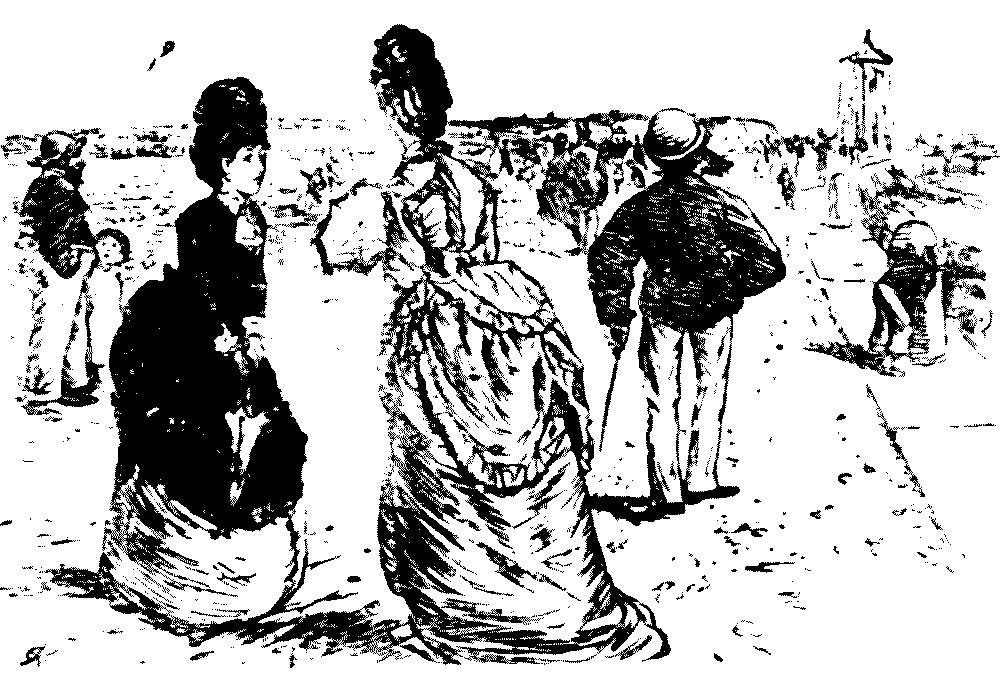
"I think I told you, in my letter of the first of October, of his absurd interpretation of an innocent remark of mine about the sandy shores of Wobbleswick. Well, would you believe it, dear! we were strolling on the Esplanade, the other day, when he suddenly left Kate and me, and took himself off in a tremendous huff because we said we liked walking with an object!!"
[Extract from a later letter of Laura's to Lillie.
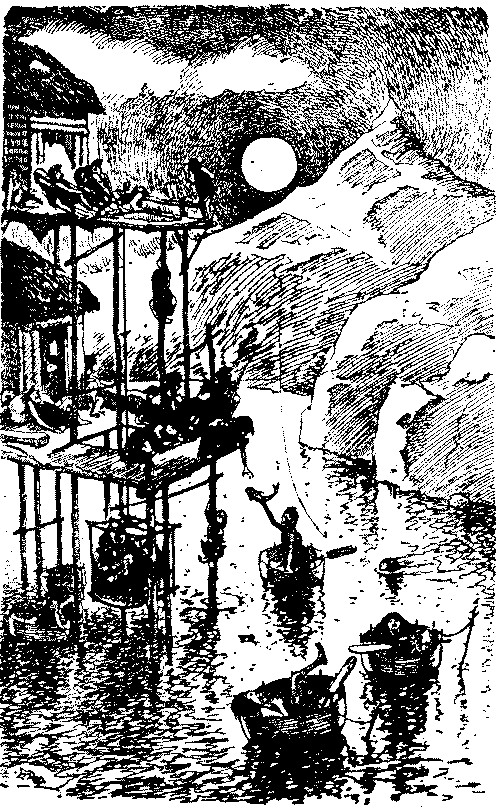
A Nocturne which would seem to show that "residential flats" were not wholly unknown even in primeval times!
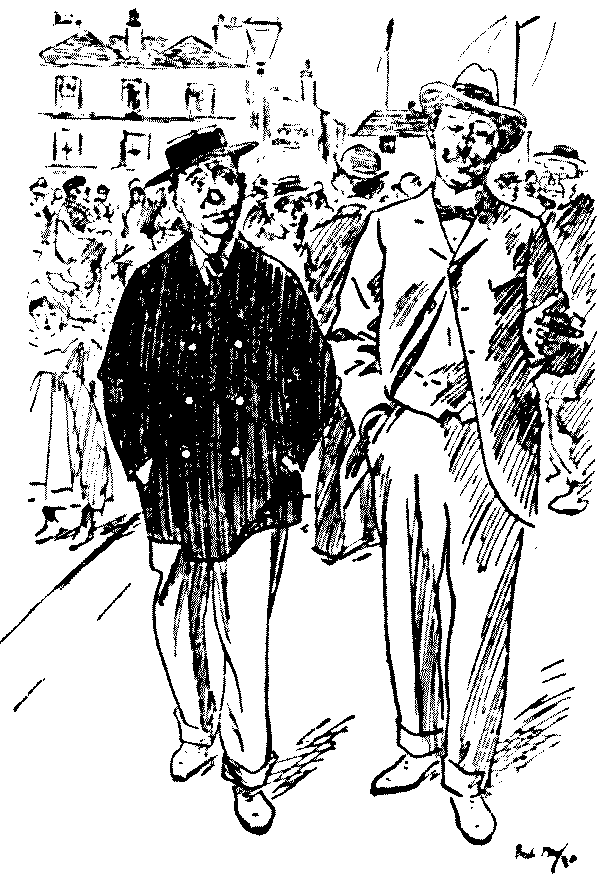
Blinks. "The sun 'll be over the yard-arm in ten minutes. Then we'll have a drink!"
Jinks. "I think I'll have one while I'm waiting!"
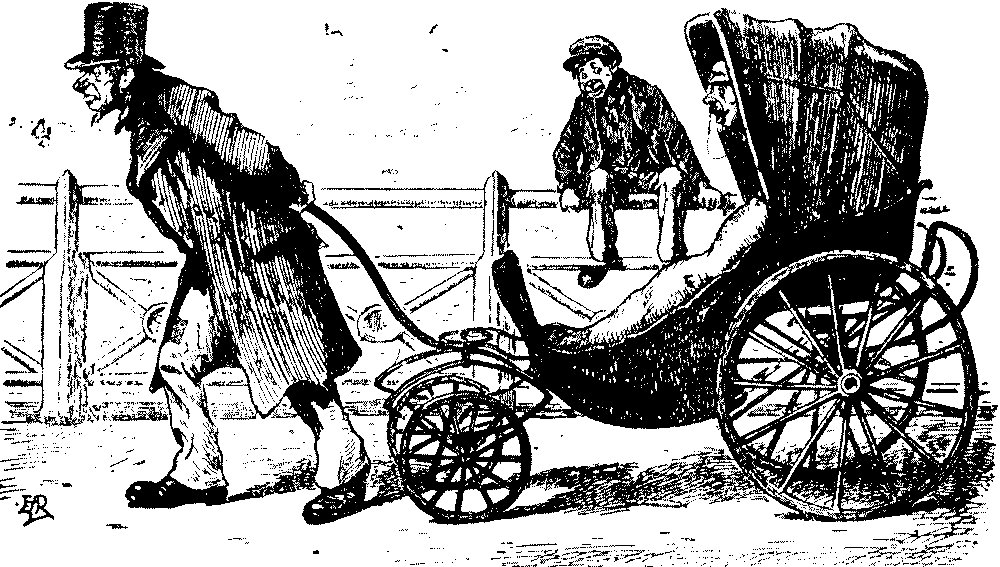
Tompkins (in a feeble voice, for the fourth or fifth time, with no result). "Chairman!!! chairman!!!"
That Awful Boy. "Lydies and gentlemen——!!"
Oh! how delightful now at last to come
Away from town—its dirt, its degradation,
Its never-ending whirl, its ceaseless hum.
(A long chalks better, though, than sheer stagnation.)
For what could mortal man or maid want more
Than breezy downs to stroll on, rocks to climb up,
Weird labyrinthine caverns to explore?
(There's nothing else to do to fill the time up.)
Your honest face here earns an honest brown,
You ramble on for miles 'mid gorse and heather,
Sheep hold athletic sports upon the down
(Which makes the mutton taste as tough as leather).
The place is guiltless, too, of horrid piers.
And likewise is not Christy-Minstrel tooney;
No soul-distressing strains disturb your ears.
(A German band has just played "Annie Rooney".)
The eggs as fresh as paint, the Cornish cream
The boys from school all say is "simply ripping."
The butter, so the girls declare, "a dream."
(The only baccy you can buy quite dripping.)
[Pg 109]A happiness of resting after strife,
Where one forgets all worldly pain and sorrow,
And one contentedly could pass one's life.
(A telegram will take me home to-morrow.)
Scene: Margate Beach on Easter Monday.—First Lady. "Oh, here comes a steamer. How high she is out of the water."
Second Lady. "Yes, dear, but don't you see? It's because the tide's so low."
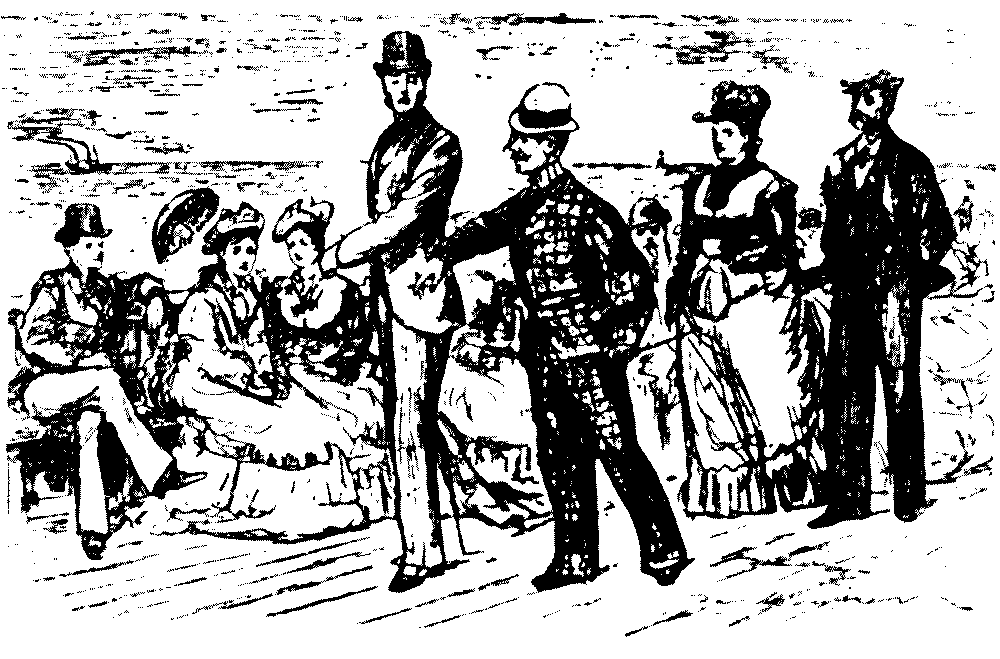
The aristocratic Jones (rather ashamed of his loud acquaintance, Brown). "You must excuse me, but if there's one thing in the world I particularly object to, it's to having anybody take my arm!"
Brown. "All right, old fellow!—you take mine!"
Question. Is it your intention to leave London at once to benefit by the ocean breezes on the English coast?
Answer. Certainly, with the bulk of my neighbours.
Q. Then the metropolis will become empty?
A. Practically, for only about three and a half millions out of the four millions will be left behind.
Q. What do you consider the remaining residuum?
A. From a West End point of view a negligible quantity.
Q. Do not some of the Eastenders visit the seaside?
A. Yes, at an earlier period in the year, when they pay rather more for their accommodation than their neighbours of the West.
Q. How can this be, if it be assumed that the East is poorer than the West?
A. The length of the visit is governed by the weight of the purse. Belgravia stays a couple of months at Eastbourne, while three days at Margate is enough for Shoreditch.
Q. Has a sojourn by the sea waves any disadvantages?
A. Several. In the first instance, lodgings are frequently expensive and uncomfortable. Then there is always a chance that the last lodgers may have occupied their rooms as convalescents. Lastly, it is not invariably the case that the climate agrees with himself and his family.
Q. And what becomes of the house in town?
A. If abandoned to a caretaker, the reception rooms may be used by her own family as best chambers, and if let to strangers, the furniture may be injured irretrievably.
Q. But surely in the last case there would be the certainty of pecuniary indemnity?
A. Cherished relics cannot be restored by their commonplace value in money.
Q. Then, taking one thing with another, the benefit of a visit to the seaside is questionable?
A. Assuredly; and an expression of heartfelt delight at the termination of the outing and the consequent return home is the customary finish to the, styled by courtesy, holiday.
Q. But has not the seaside visit a compensating advantage?
A. The seaside visit has a compensating advantage of overwhelming proportions, which completely swallows up and effaces all suggestions of discomfort—it is the fashion.
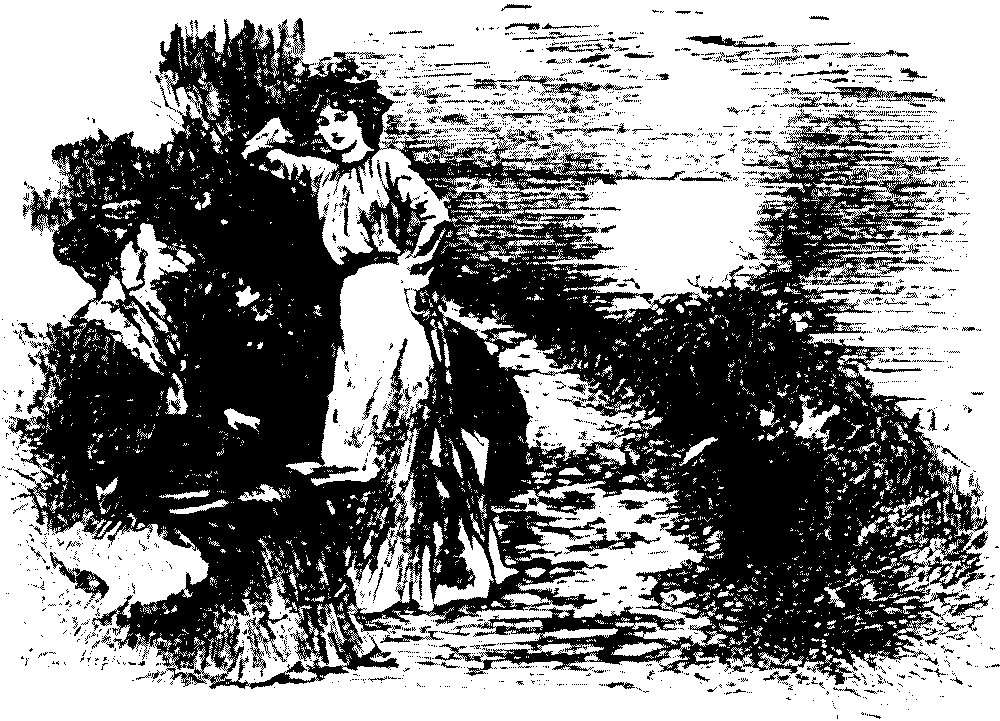
Irene. "Do you remember Kitty Fowler?"
Her Friend. "No, I don't."
Irene. "Oh, you must remember Kitty. She was the plainest girl in Torquay. But I forgot—that was after you left!"
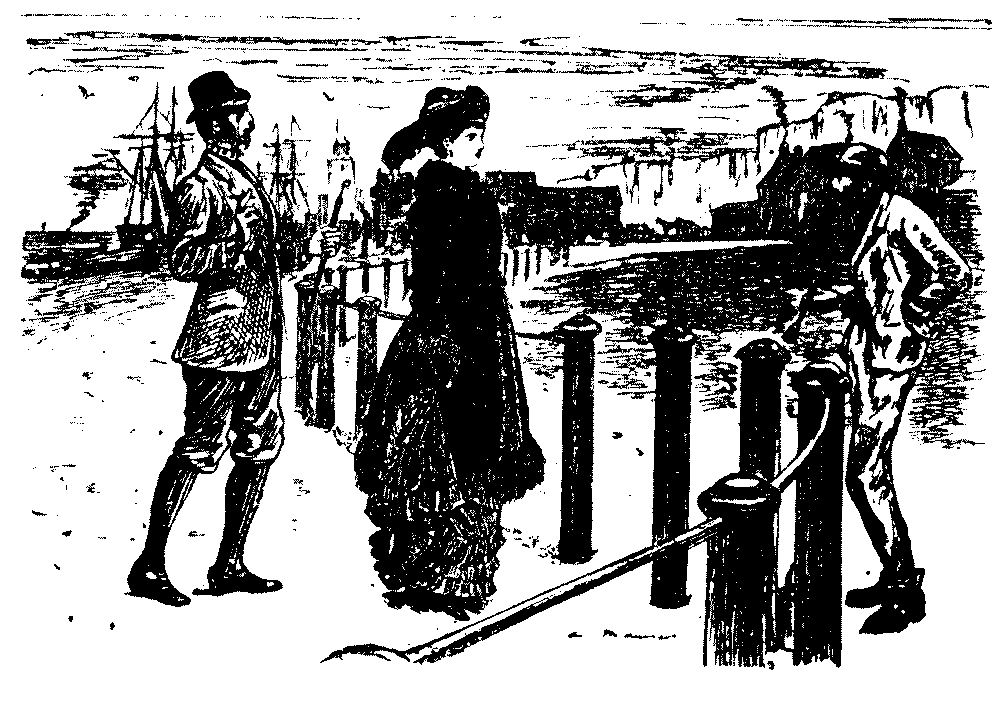
Husband. "Hi! Maria! Take care of the paint!"
Painter. "It don't matter, ma'am. It'll all 'ave to be painted again!"
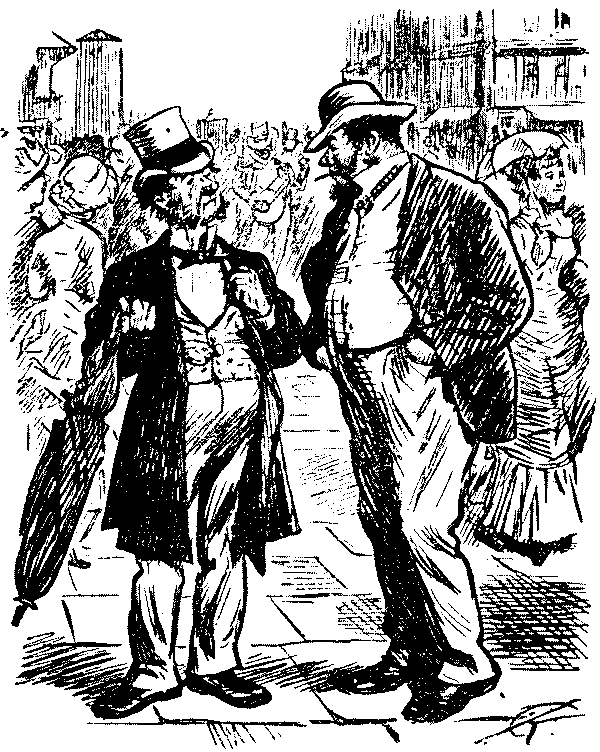
Chatty Visitor. "I like the place. I always come here. 'Worst of it is, it's a little too dressy!"
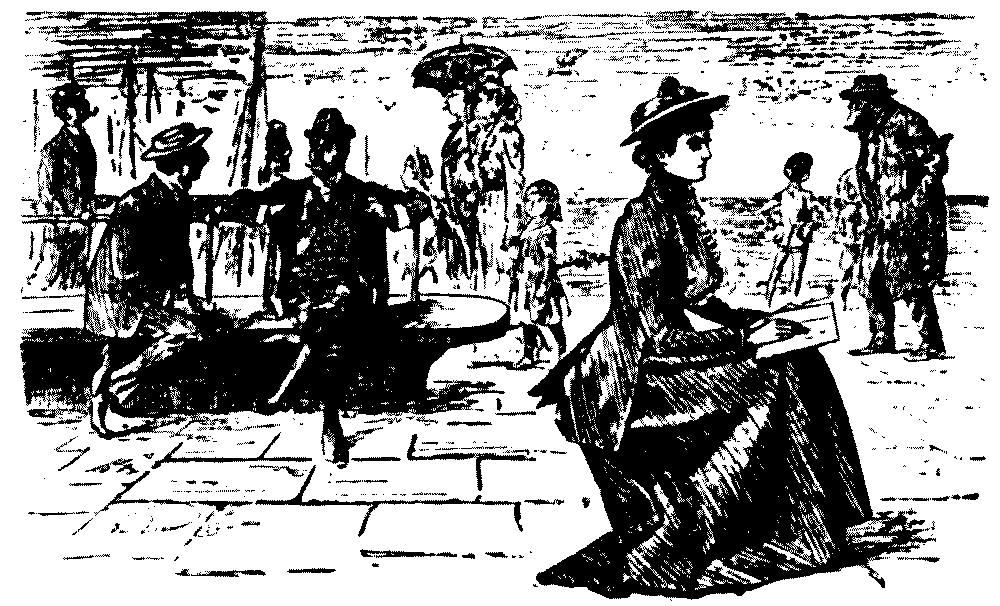
Shy but Susceptible Youth. "Er—could you tell me who that young lady is—sketching?"
Affable Stranger. "She has the misfortune to be my wife!"
Shy but Susceptible One (desperately anxious to please, and losing all presence of mind). "Oh—the misfortune's entirely yours, I'm sure!"
Brilliant Suggestion (Overheard at the Seaside).—She. "So much nicer now that all the visitors have gone. Don't you think so?"
He. "Yes, by Jove! So jolly nice and quiet! Often wonder that everybody doesn't come now when there's nobody here, don't you know!"
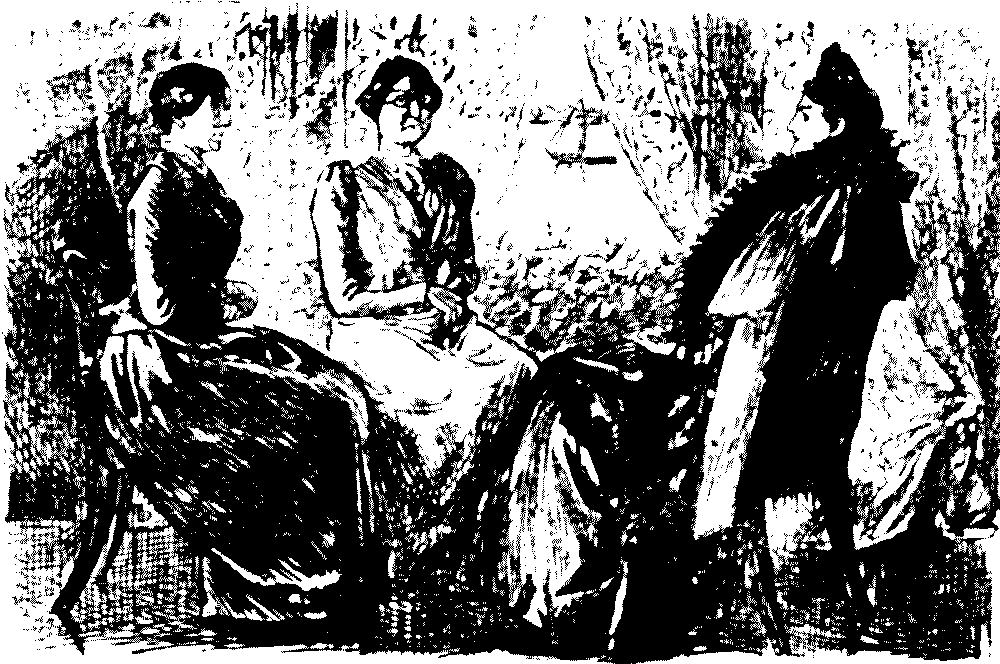
Miss Priscilla. "Yes; it's a beautiful view. But tourists are in the habit of bathing on the opposite shore, and that's rather a drawback."
Fair Visitor. "Dear me! but at such a distance as that—surely——"
Miss Priscilla. "Ah, but with a telescope, you know!"
I do not mean the Kodak fiend,
Who takes snap-shots of ladies dipping,
And gloats o'er sundry views he's gleaned
Of amatory couples "tripping."
No, not these playful amateurs
I sing of, but the serious artist,
Who spreads upon the beach his lures,
What time the season's at its smartest.
His tongue is glib, his terms are cheap,
For ninepence while you wait he'll take you;
Posterity shall, marv'lling, keep
The "tin-type" masterpiece he'll make you.
What though his camera be antique,
His dark-room just a nose-bag humble,
What if his tripod legs are weak,
And threaten constantly to tumble.
[Pg 119]No swain nor maiden can withstand
His invitation arch, insidious,
To pose al fresco on the strand—
His clientèle are not fastidious.
"You are so lovely", says the wretch,
"Your picture will be quite entrancing!"
And to the lady in the sketch
I overheard him thus romancing.
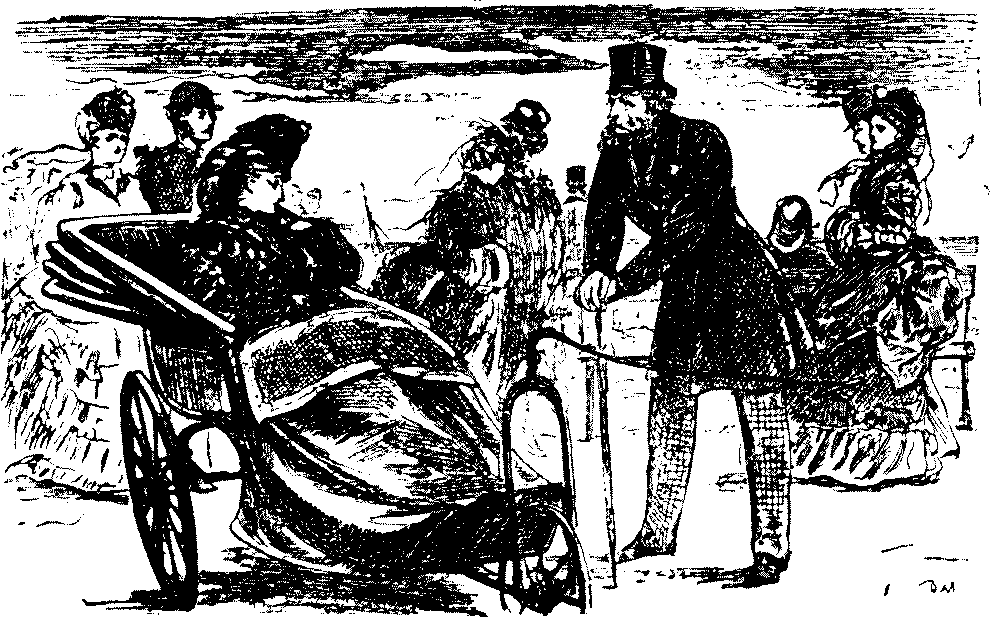
Sir Talbot Howard Vere de Vere. "Ah! Good morning, Mrs. Jones! Dreadful accident just occurred. Poor young lady riding along the King's Road—horse took fright—reared, and fell back upon her—dreadfully injured, I'm sorry to say!"
Mrs. Woodbee Swellington Jones. "Quite too shocking, dear Sir Talbot! Was she—er—a person of position?"
Sir Talbot Howard Vere de Vere. "Position, by George!! Dooced uncomfortable position, too, I should say!"
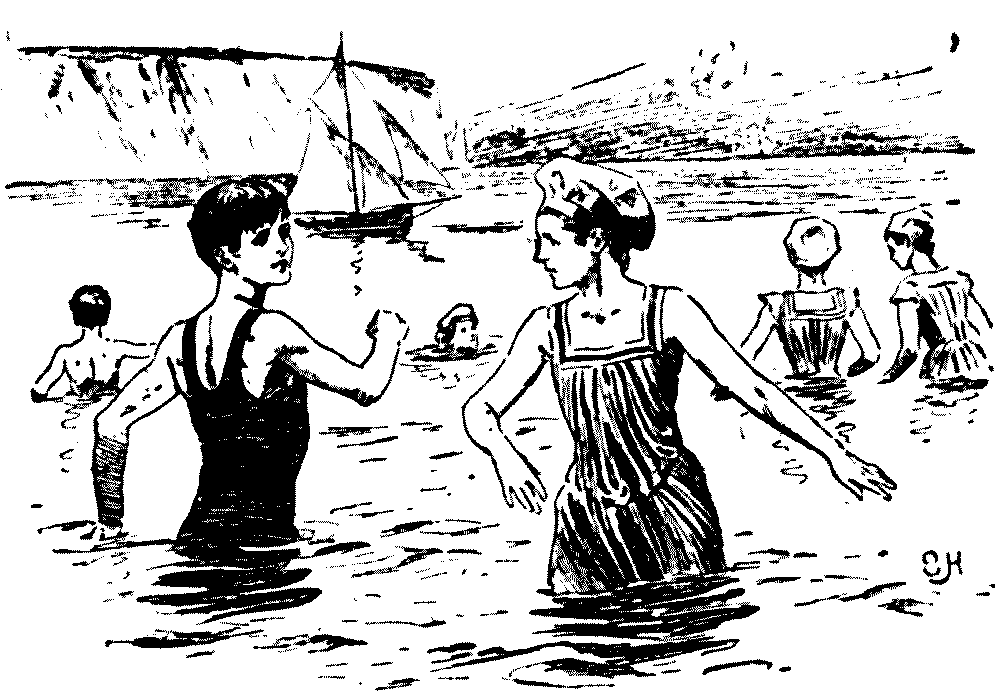
Bertie. "Gertie, do just go back to the beach and fetch me a baby (you'll find a lot about), and I'll show you all the different ways of saving it from drowning!"
The weather which, in Mr. Dunstable's varied experience of five-and-twenty years, he assures me, has never been so bad, having at length afforded some indications of "breaking", I make the acquaintance, through Mrs. Cobbler, of Mr. Wisterwhistle, proprietor of the one bath-chair available for the invalid of Torsington-on-Sea, who, like myself, stands in need of the salubrious air of that health-giving resort, but who is ordered by his medical adviser to secure it with the least possible expenditure of physical strength.
Both Mr. Wisterwhistle and his chair are peculiar in their respective ways, and each has a decided[Pg 122] history. Mr. Wisterwhistle, growing confidential over his antecedents, says, "You see, sir, I wasn't brought up to the bath-chair business, so to speak, for I began in the Royal Navy, under His Majesty King William the Fourth. Then I took to the coastguard business, and having put by a matter of thirty pound odd, and hearing 'she' was in the market",—Mr. Wisterwhistle always referred to his bath-chair as 'she', evidently regarding it from the nautical stand-point as of the feminine gender,—"and knowing, saving your presence, sir, that old Bloxer, of whom I bought her, had such a good crop of cripples the last season or two, that he often touched two-and-forty shillings a week with 'em, I dropped Her Majesty's service, and took to this 'ere. But, Lor, sir, the business ain't wot it wos. Things is changed woeful at Torsington since I took her up. Then from 9 o'clock, as you might say, to 6 p.m., every hour was took up; and, mind you, by real downright 'aristocracy',—real live noblemen, with gout on 'em, as thought nothink of a two hours' stretch, and didn't 'aggle, savin' your presence, over a extra sixpence for the job either way. But, bless you, wot's it come to now? Why, she might as well lay up in a dry dock arf the week, for wot's come of the downright genuine invalid, savin' your presence, blow'd if I knows. One can see, of course, sir, in arf a jiffy, as you is touched in the legs with the rheumatics, or summat like it; but besides you and a old gent on crutches from Portland Buildings, there ain't no real invalid public 'ere at all, and one can't expect to make a livin' out of you two; for if you mean to do the thing ever so 'ansome, it ain't reasonable to expect you and the old gent I was a referring to, to stand seven hours a day goin' up and down the Esplanade between you, and you see even that at a bob an hour ain't no great shakes when you come to pay for 'ousing her and keepin' her lookin' spic and span, with all her brass knobs a shining and her leather apron fresh polished with patent carriage blackin': and Lor, sir, you'd not b'lieve me if I was to tell you what a deal of show some parties expects for their one bob an hour. Why, it was only the other day that Lady Glumpley (a old party with a front of black curls and yaller bows in her bonnet, as I dare say you've noticed me a haulin' up and[Pg 128] down the Parade when the band's a playin'), says to me, says she, 'It ain't so much the easygoin' of your chair, Mr. Wisterwhistle, as makes me patronise it, as its general genteel appearance. For there's many a chair at Brighton that can't hold a candle to it!'" But at this point he was interrupted by the appearance of a dense crowd that half filled the street, and drew up in silent expectation opposite my front door. Dear me, I had quite forgotten I had sent for him. But the boy who cleans the boots and knives has returned, and brought with him the One Policeman!
Query at some Fashionable Seaside Resort.—Do the unpleasant odours noticeable at certain times arise from the fact of the tide being high? If so, is the tide sometimes higher than usual, as the—ahem!—odours certainly are?
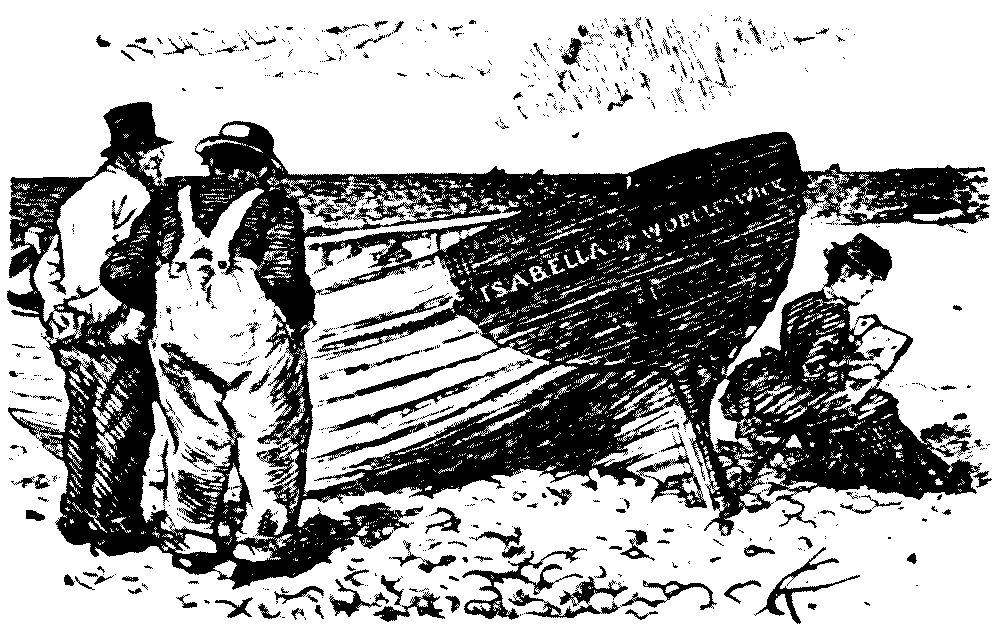
Gruff Voice (behind her—she thought she heard her own name). "She's a gettin' old, Bill, and she sartain'y ain't no beauty! But you and I'll smarten her up! Give her a good tarrin' up to the waist, and a streak o' paint, and they 'ont know her again when the folks come down a' Whitsun'. Come along, and let's ketch 'old of her, and shove her into the water fust of all!!"
Miss Isabella. "Oh! the horrid wretches! No policeman in sight! Nothing for it but flight!"
[Is off like a bird!
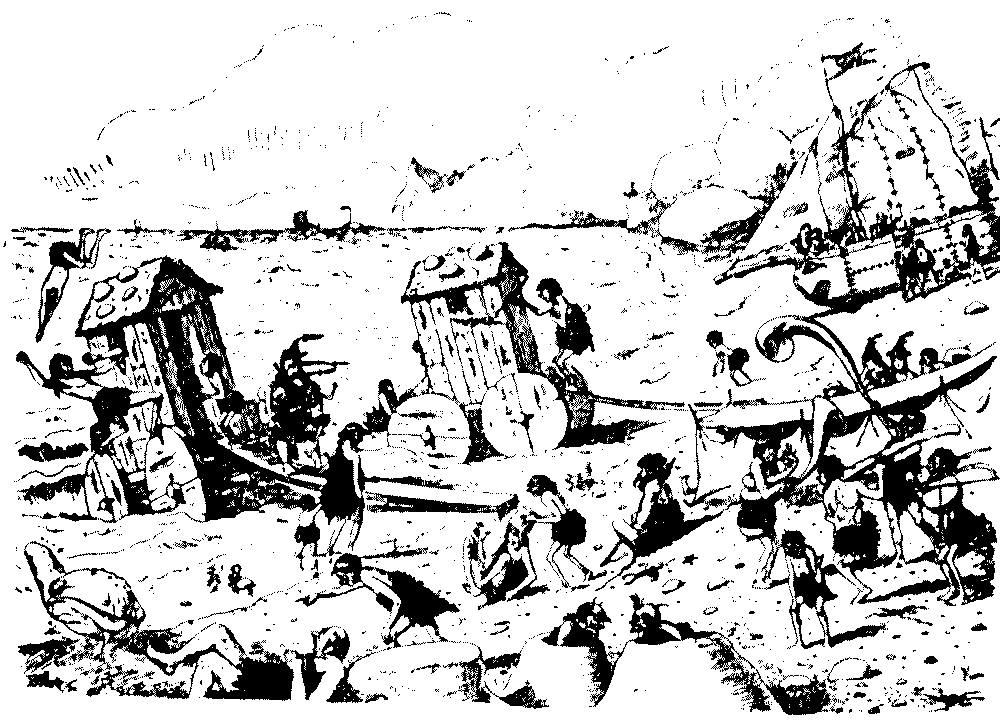
There were even then quiet spots by the sea where one could be alone with Nature undisturbed
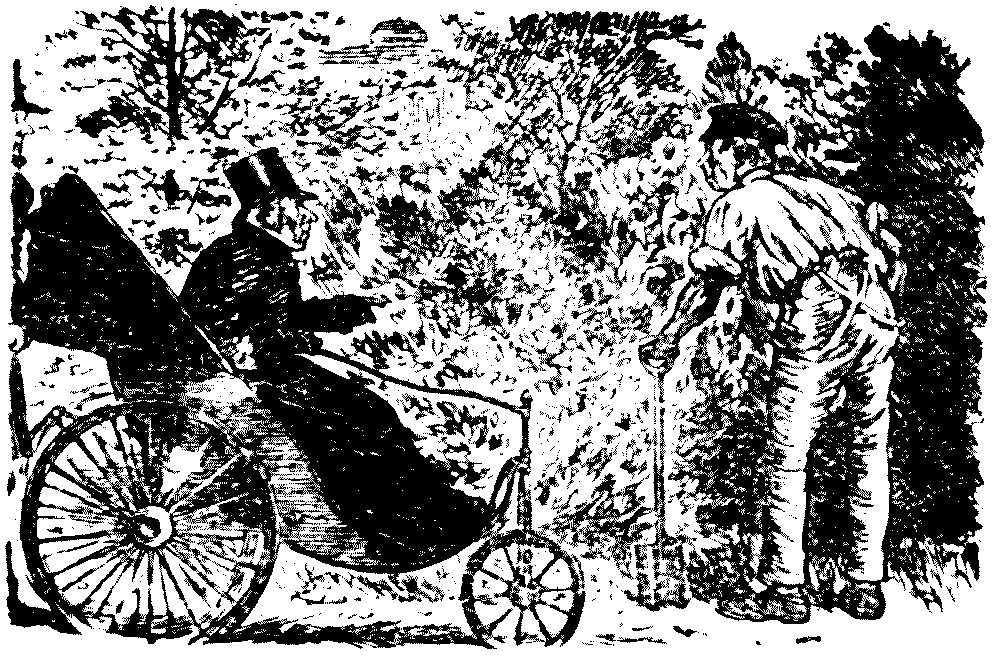
Botanical Old Gent (in the Brighton Gardens). "Can you tell me, my good man, if this plant belongs to the 'Arbutus' family?"
Gardener (curtly). "No, sir, it doan't. It b'longs to the Corporation!"
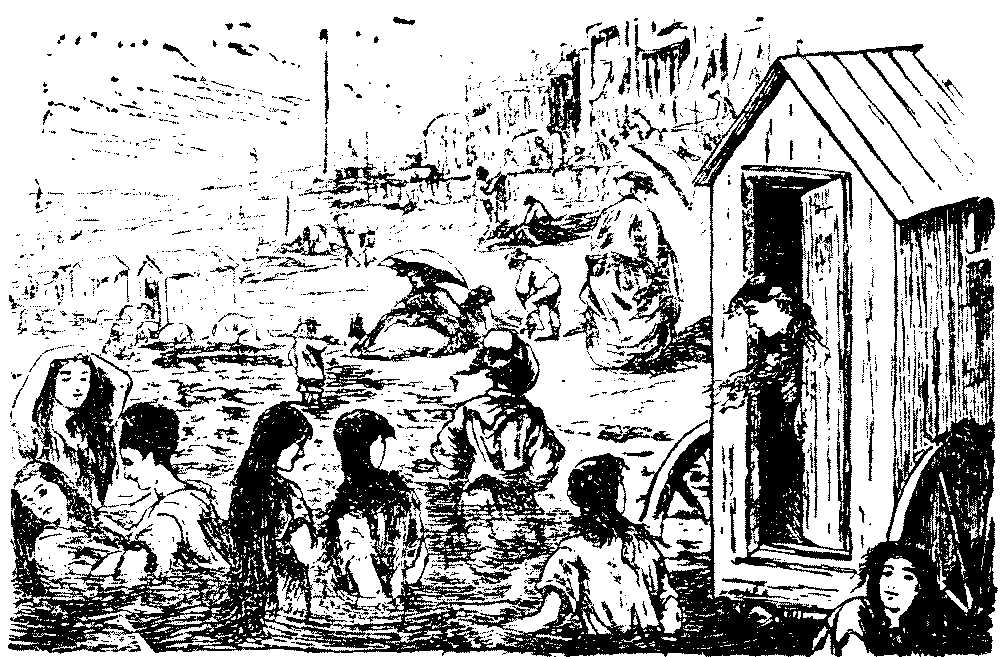
Blanche. "I say, some of you, call after aunty! She has taken my chignon, and left me her horrid black one!"
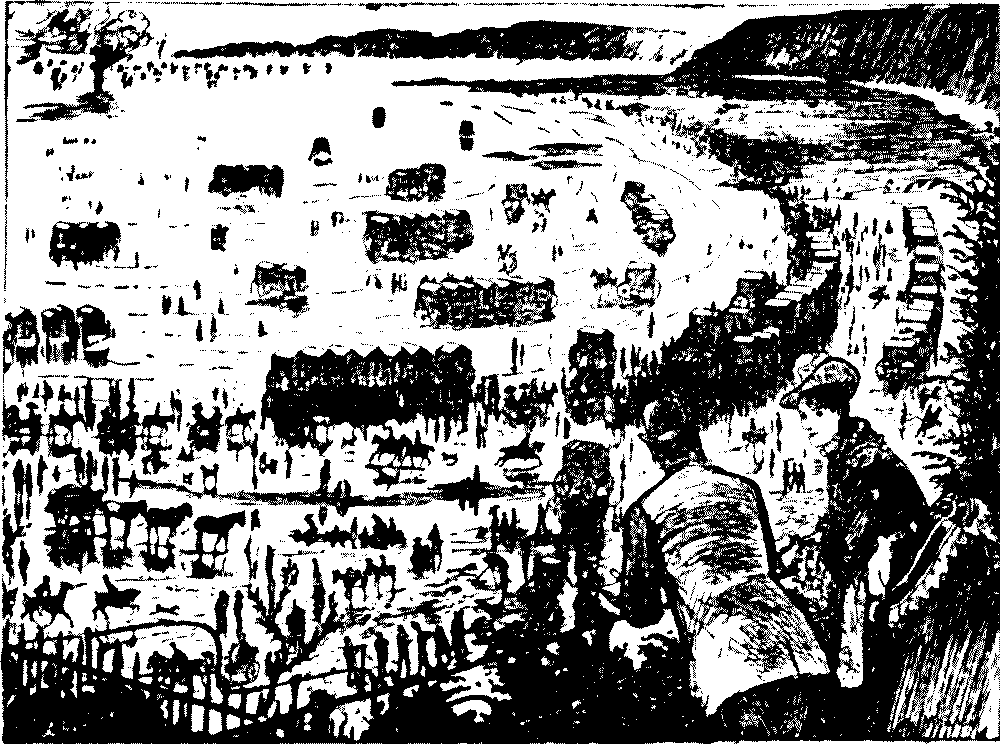
The captain, who is well up in his classics, translates, for his Fanny's benefit, a celebrated Latin poem (by one Lucretius) to the effect that it is sweet to gaze from the cliff at the bathing machines vainly struggling to take the unfortunate bathers into deep water.
Seaside Drama.—Mrs. de Tomkyns (sotto voce, to Mr. de T.). "Ludovic, dear, there's Algernon playing with a strange child! Do prevent it!"
Mr. de T. (ditto, to Mrs. de T.). "How on earth am I to prevent it, my love?"
Mrs. de T. "Tell its parents Algernon is just recovering from scarlet fever, or something!"
Mr. de T. "But it isn't true!"
Mrs. de T. "Oh, never mind! Tell them, all the same!"
Mr. de T. (aloud). "Ahem! Sir, you'd better not let your little girl play with my little boy. He's only just recovering from—er—Scarlet Fever!"
Mr. and Mrs. Jenkins (together). "It's all right, sir!—so's our little gal!"
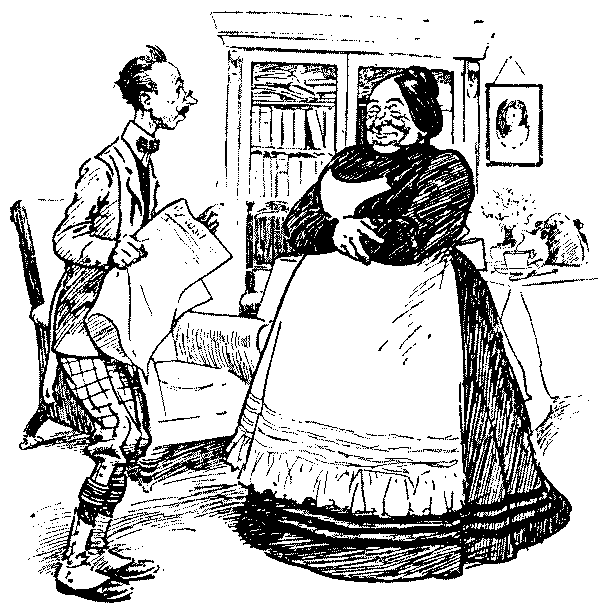
Fussy Landlady (to new Lodger). "Well, sir, if you'll only tell me when you want a bath, I'll see you have it."
In for it here,
Six weeks or more,
Once every year
(Yah, what a bore!)
Daughters and wife
Force me to bide
Mad to "see life"
By the seaside!
Go out of town
What if we do?
Hither comes down
All the world too;
Vanity Fair,
Fashion and Pride,
Seeking fresh air
By the seaside.
Drest up all hands—
Raiment how dear!—
Down on the sands,
Out on the Pier,
Pace to and fro,
See, as at Ryde,
Off how they show
By the seaside!
Fops and fine girls,
Swarm, brisk as bees;
Ribbons and curls
Float on the breeze;
Females and males
Eye and are eyed;
Ogling prevails
By the seaside!
Daughters may see
Some fun in that.
Wife, how can she,
Grown old and fat?
Scene I survey
But to deride,
Idle display
By the seaside.
Views within reach,
Picturesque scenes,
Rocks on the beach,
Bathing machines,
Shingle and pools,
Left by the tide,
Youth, far from schools,
By the seaside.
Artists may sketch,
Draw and design,
Pencil, or etch;
Not in my line.
Money, no end,
Whilst I am tied
Here, I must spend,
By the seaside!
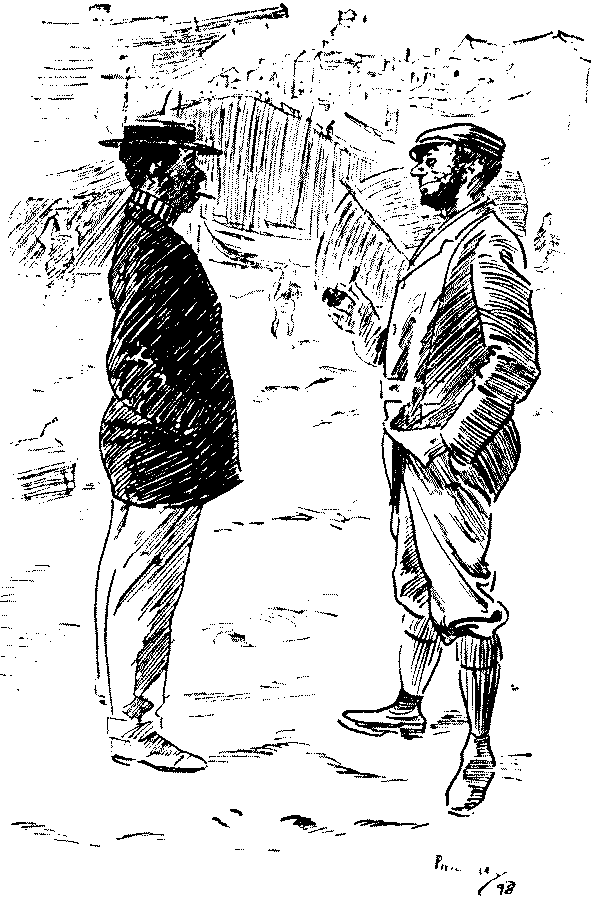
Snooks (to new acquaintance). "Tell yer what, look in one evenin' and 'ave a bit of supper, if you don't mind 'avin it in the kitchen. Yer see, we're plain people, and don't put on no side. Of course, I know as a toff like you 'ud 'ave it in the drawing-room!"
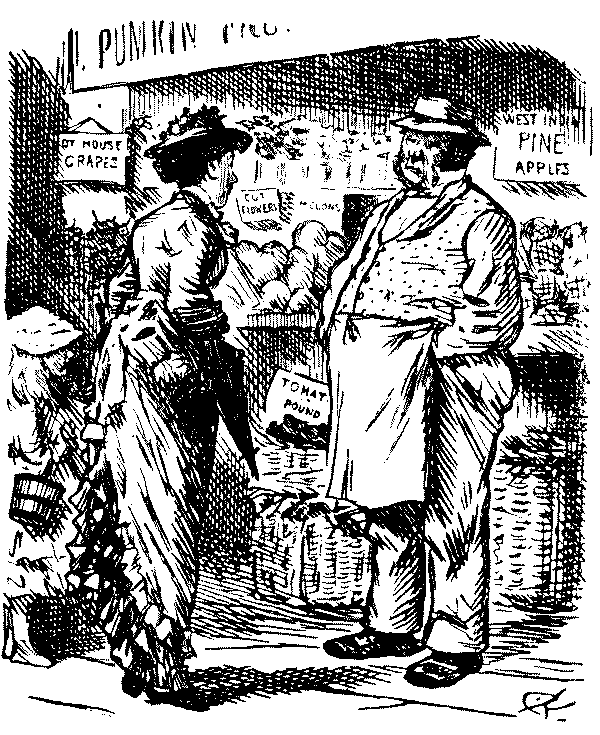
Mrs. Brown finds Sandymouth a very different place from what she remembers it years ago.
Greengrocer. "Cabbage, mum!? We don't keep no second-class vegetables, mum. You'll get it at the lower end o' the town!"
Tom Jones (in love). The most heavenly place I ever was in. The sun is warmer, the sky bluer, the sea the calmest I ever knew. Joy sparkles on every pebble; Art spreads its welcome arms through every spray of seaweed. True happiness encircles me on every breeze, and Beauty is by my side.
Old Jones. Beastly slow. All sea and sky, and ugly round stones. You can't bask in the sun because there is none—it's always raining—and because the flints worry your back. Confound the children, scraping up the wet sand and smelling seaweeds! It must be time for them to go to bed or to lessons or something. Wherever you sit there is sure to be a draught, and such heaps of old women you can't put your legs up on the[Pg 138] seat. Hang it all, there isn't a young girl in the place, let alone pretty ones.
Young Brown (waiting for a Commission). Awfully dull. Quite too excessively detestable. Not a fellow to talk to, you know, who knows anything about the Leger, or draw-poker, or modern education, you know. Can't get introduced to Lady Tom Peeper. Nobody to do it. Wish my moustache would curl. Pull it all day, you know, but it won't come. Lady Tom smiled, on the Parade to-day. Got very red, but I shall smile too to-morrow. A man must do something in this dreadful place.
Major Brown (Heavies). Not half bad kind of diggings. Quite in clover. Found Lydia here—I mean Lady Tom Peeper. Horribly satirical woman, though. Keeps one up to the mark. I shall have to read up to keep pace with her. I shouldn't like to be chaffed by her. Better friend than enemy. Poor Tom Peeper! he must have a[Pg 140] bad time of it! Can't say "Bo" to a gosling. And she knows it. That's why he never comes down here. Coast clear. Fancy she's rather sweet on me. By Jove! we had a forty-mile-an-hour-express flirtation before her marriage! Must take care what I'm about now. Mustn't have a collision with Tom—good old man, after all, if he is a fool. Take this note round, Charles, to the same place.
Mrs. Robinson (Materfamilias). Scarcely room to swing a cot, for baby. Thank goodness, all the children are on the beach. I hope Mary Ann won't let out to the other nurses that Totty had the scarlet fever. He's quite well now, poor little man, and no one will be any the worse for it. Horrid! of course. No, it is not a Colorado beetle, Robinson. They infest the curtains; we did not bring them with us in our trunks. Do go out and buy some insect-powder, instead of looking stupid behind that nasty cigar. Oh, and get some soap and some tooth-powder, and order baby's tonic, and Jane's iron—mind, sesqui-sulphate of iron (I[Pg 142] suppose I must find the prescription), and a box of—what's that stuff for sore throats? And do hire a perambulator with a hood. And we have no dessert for to-morrow—you know, or you ought to know, it's Sunday. Some fruit, and what you like. Oh! and don't forget some biscuits for the dog. What has become of Tiny? Tiny! Tiny! I know he did not go with the children. I dare say he has eaten something horrid, and is dying under a chair. Dear! dear! who would be mother of a family with such a careless, thoughtless, quite too utterly selfish husband as you are. Of course you never remembered to-day was my birthday. I ought never to have been born. A bracelet or a pair of ear-rings—or, by the way, I saw a lovely châtelaine on the Parade. You might find enough to give me one pleasure since our wedding.
Robinson (Paterfamilias). I like the seaside, I do. When will it be over?
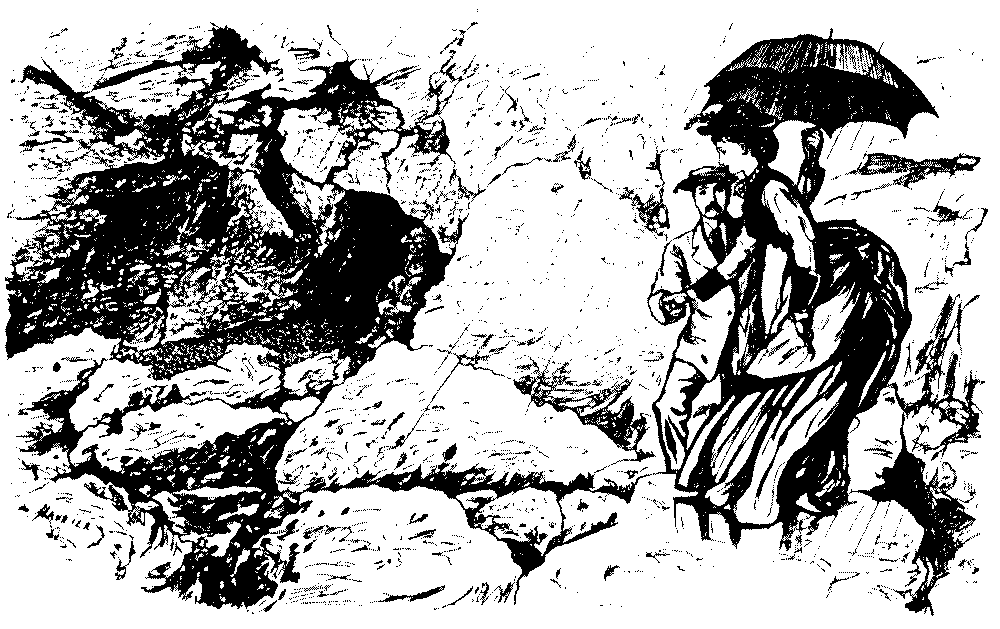
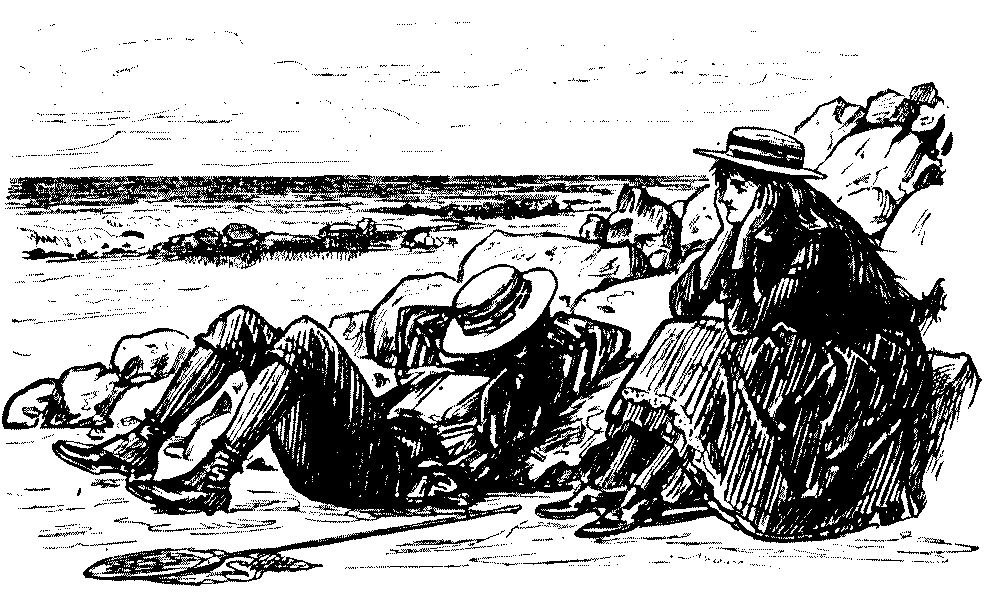
Jack (a naughty boy, who is always in disgrace, and most deservedly). "I say, Effie, do you know what I should like? I should like to be accused of something I'd never done!"
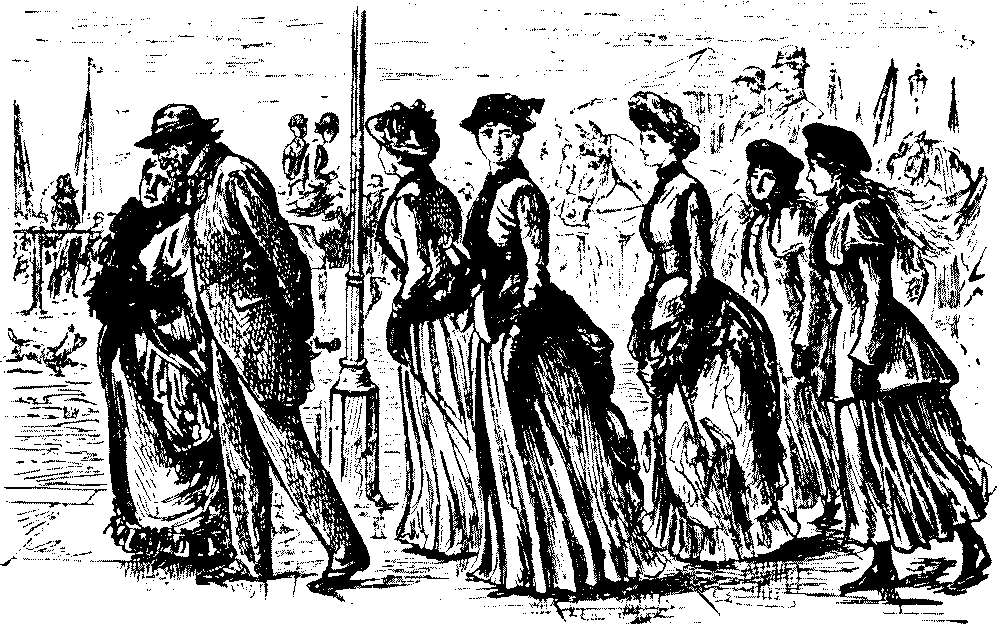
Dowager. "It's been the worst season I can remember, Sir James! All the men seem to have got married, and none of the girls!"
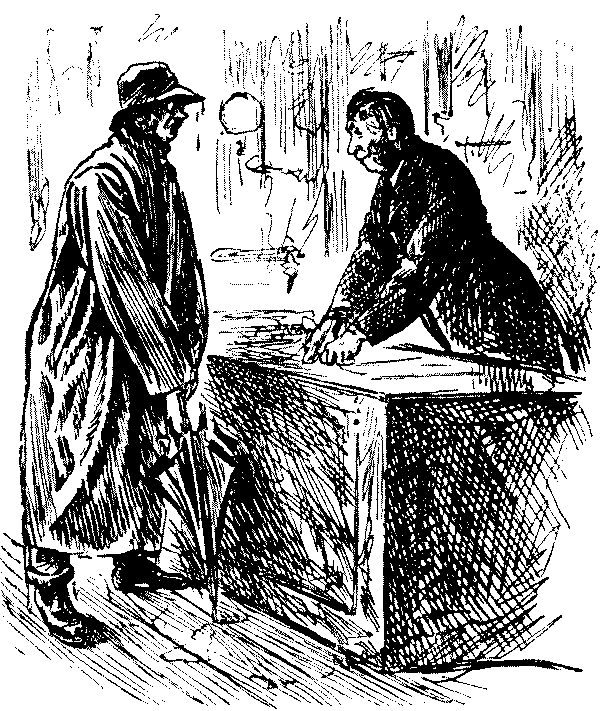
Brown. "What beastly weather! And the glass is going steadily down!"
Local Tradesman. "Oh, that's nothing, sir. The glass has no effect whatever on our part of the coast!"
Scene—Any fashionable Watering-place where "Church Parade" is a recognised institution.
Time—Sunday, 1 p.m. Enter Brown and Mrs. Brown, who take chairs.
Mrs. Brown. Good gracious! Look another way! Those odious people, the Stiggingses, are coming towards us!
Brown. Why odious? I think the girls rather nice.
Mrs. B. (contemptuously). Oh, you would, because men are so easily taken in! Nice, indeed! Why, here's Major Buttons.
B. (moving his head sharply to the right). Don't see him! Can't stand the fellow! I always avoid him at the Club!
Mrs. B. Why? Soldiers are always such pleasant men.[Pg 146]
B. (contemptuously). Buttons a soldier! Years ago he was a Lieutenant in a marching regiment, and now holds honorary rank in the Volunteers! Soldier, indeed! Bless me! here's Mrs. Fitz-Flummery—mind you don't cut her.
Mrs. B. Yes, I shall; the woman is unsupportable. Did you ever see such a dress. And she has changed the colour of her hair—again!
B. Whether she has or hasn't, she looks particularly pleasing.
Mrs. B. (drily). You were always a little eccentric in your taste! Why, surely there must be Mr. Pennyfather Robson. How smart he looks! Where can he have come from?
B. The Bankruptcy Court! (Drily.) You were never particularly famous for discrimination. As I live, the Plantagenet Smiths!
[He bows with effusion.
Mrs. B. And the Stuart Joneses. (She kisses her[Pg 148] hand gushingly). By the way, dear, didn't you say that the Plantagenet Smiths were suspected of murdering their uncle before they inherited his property?
B. So it is reported, darling. And didn't you tell me, my own, that the parents of Mr. Stuart Jones were convicts before they became millionaires?
Mrs. B. So I have heard, loved one. (Starting up.) Come, Charley, we must be off at once! The Goldharts! If they catch us, she is sure to ask me to visit some of her sick poor!
B. And he to beg me to subscribe to an orphanage or a hospital! Here, take your prayer-book, or people won't know that we have come from church!
[Exeunt hurriedly.
At Scarborough.—Miss Araminta Dove. Why do they call this the Spa?
Mr. Rhino-Ceros. Oh! I believe the place was once devoted to boxing exhibitions.
[Miss A.D. as wise as ever.
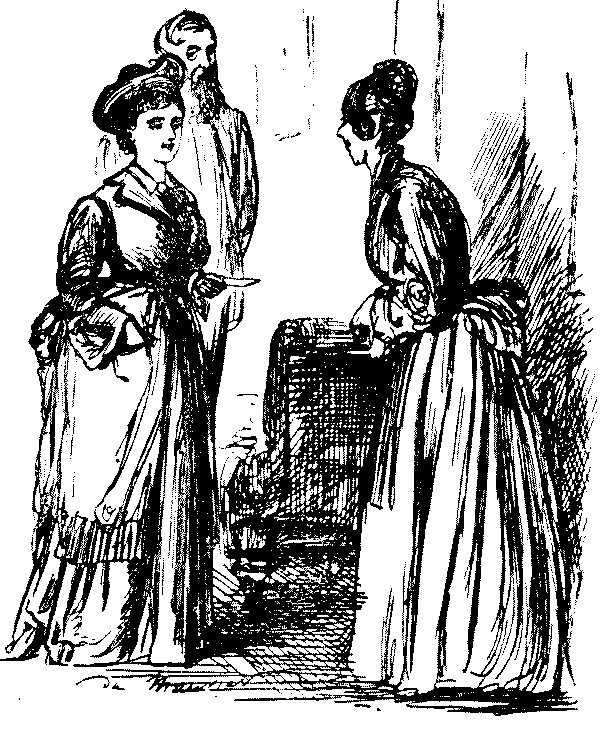
Landlady (who has just presented her weekly bill). "I 'ope, ma'am, as you find the bracing hair agree with you, ma'am, and your good gentleman, ma'am!"
Lady. "Oh, yes, our appetites are wonderfully improved! For instance, at home we only eat two loaves a day, and I find, from your account, that we can manage eight!"
[Landlady feels uncomfortable.
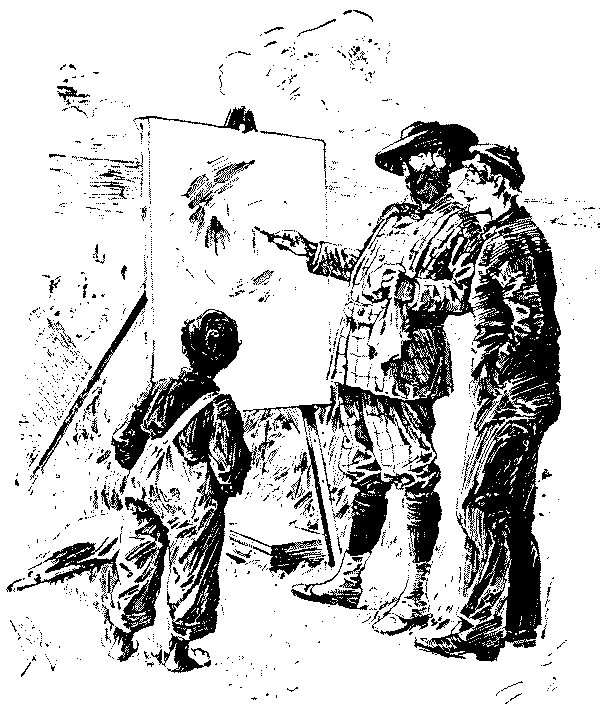
Artist (irritated by the preliminaries of composition and the too close proximity of an uninteresting native). "I think you needn't wait any longer. There's really nothing to look at just now."
Native. "Ay, an' I doot there'll never be muckle to look at there!"
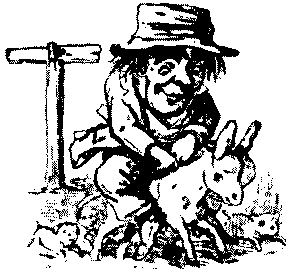
The Donkey-Boys of England, how merrily they fly,
With pleasant chaff upon the tongue and cunning in the eye.
And oh! the donkeys in a mass how patiently they stand,
High on the heath of Hampstead, or down on Ramsgate's sand.
The Donkey-Boys of England, how sternly they reprove
The brute that won't "come over", with an impressive shove;
And oh! the eel-like animals, how gracefully they swerve
From side to side, but won't advance to spoil true beauty's curve.
The Donkey-Boys of England, how manfully they fight,
When a probable donkestrian comes suddenly in sight;
From nurse's arms the babies are clutch'd with fury wild,
And on a donkey carried off the mother sees her child.
The Donkey-Boys of England, how sternly they defy
The pleadings of a parent's shriek, the infant's piercing cry;
As a four-year-old Mazeppa is hurried from the spot,
Exposed to all the tortures of a donkey's fitful trot.
[Pg 152]The Donkey-Boys of England, how lustily they scream,
When they strive to keep together their donkeys in a team;
And the riders who are anxious to be class'd among genteels,
Have a crowd of ragged Donkey-boys "hallooing" at their heels.
The Donkey-Boys of England, how well they comprehend
The animal to whom they act as master, guide, and friend;
The understanding that exists between them who'll dispute—
Or that the larger share of it falls sometimes to the brute?
Seaside Acquaintances (Scene—The Shady Side of Pall Mall).—Snob. My Lord, you seem to forget me. Don't you recollect our meeting this summer at Harrogate?
Swell. My dear fellow, I do not forget it in the least. I recollect vividly we swore eternal friendship at Harrogate, and should it be my fate to meet you at Harrogate next year, I shall only be too happy to swear it again.
[Lifts his chapeau, and leaves Snob in a state of the most speechless amazement.
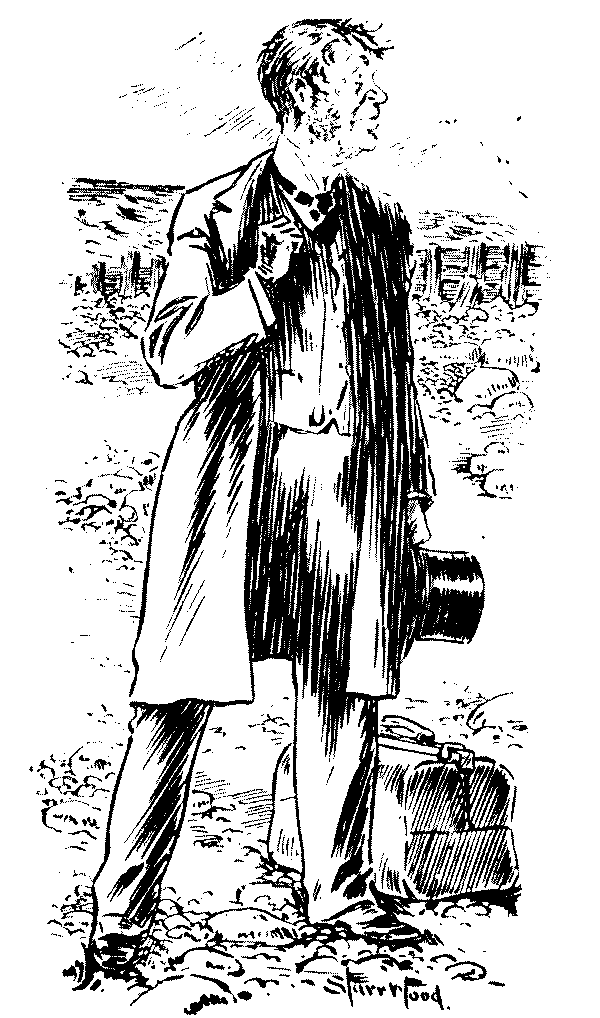
Portrait of a gentleman who sent his wife and family to the seaside, followed by a later train, and left their address behind.
[Sketched after five hours' futile search for them.
Because "everybody" is there, and it is consequently so pleasant to see St. John's Wood, Bayswater, and even Belgravia, so well represented on the Esplanade.
Because the shops in the King's Road are nearly as good as those to be found in Regent Street.
Because the sea does not always look like the Thames at Greenwich in a fog.
Because some of the perambulating bands play very nearly in tune.
Because the Drive from the Aquarium to the New Pier is quite a mile in length, and only grows monotonous after the tenth turn.
Because watching fish confined in tanks is such rollicking fun.
Because the Hebrews are so numerously represented on the Green.
Because the Clubs are so inexpensive and select.
Because the management of the Grand is so very admirable.
Because it is so pleasant to follow the Harriers on a hired hack in company with other hired hacks.[Pg 156]
Because the half-deserted Skating Rinks are so very amusing.
Because it is so nice to hear second-rate scandal about third-rate people.
Because the place is not always being visited by the scarlet fever.
Because it is so cheerful to see the poor invalids taking their morning airing in their bath-chairs.
Because the streets are paraded by so many young gentlemen from the City.
Because the Brighton belles look so ladylike in their quiet Ulsters and unpretending hats.
Because the suburbs are so very cheerful in the winter, particularly when it snows or rains.
Because on every holiday the Railway Company brings down such a very nice assortment of excursionists to fill the streets.
Because Brighton in November is so very like Margate in July.
Because, if you did not visit Brighton, you might so very easily go farther and fare worse.
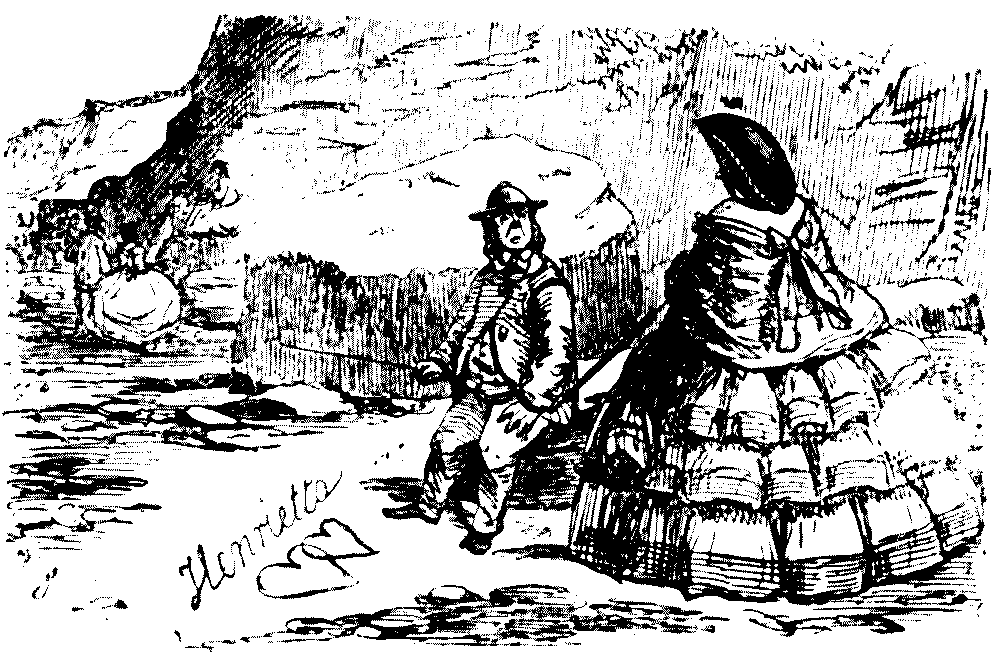
Tomkins, disconsolate on a rock, traces some characters upon the sand. To him, Mrs. Tomkins (whose name is Martha).
Mrs. T. "Well, Mr. Tomkins, and pray who may Henrietta be?"
[Tomkins utters a yell of despair, and falls prostrate.
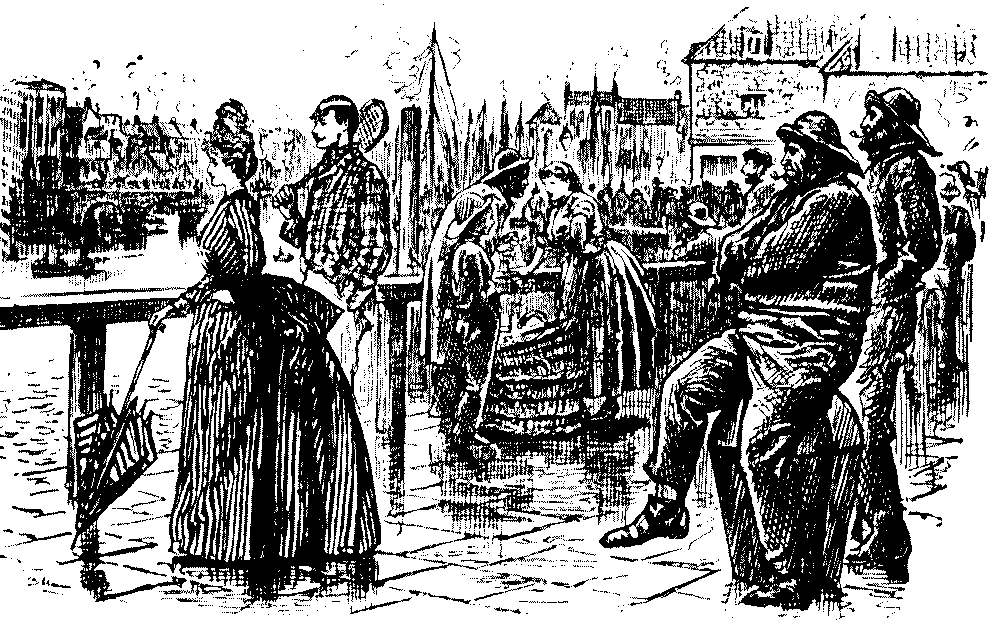
"What does t'lass want wi' yon boostle for? It aren't big enough to smoggle things, and she can't steer herself wi' it!"
What does he come for?
What does he want?
Why does he wander thus
Careworn and gaunt?
Up street and down street with
Dull vacant stare,
Hither and thither, it
Don't matter where?
What does he mean by it?
Why does he come
Hundreds of miles to prowl,
Weary and glum,
Blinking at Kosmos with
Lack-lustre eye?
He doesn't enjoy it, he
Don't even try!
Sunny or soaking, it's
All one to him,
Wandering painfully—
Curious whim!
Gazing at china-shops,
Gaping at sea,
Guzzling at beer-shops, or
Gorging at tea.
Why don't he stay at home,
Save his train fare,
Soak at his native beer,
Sunday clothes wear?
No one would grudge it him,
No one would jeer.
Why does he come away?
Why is he here?
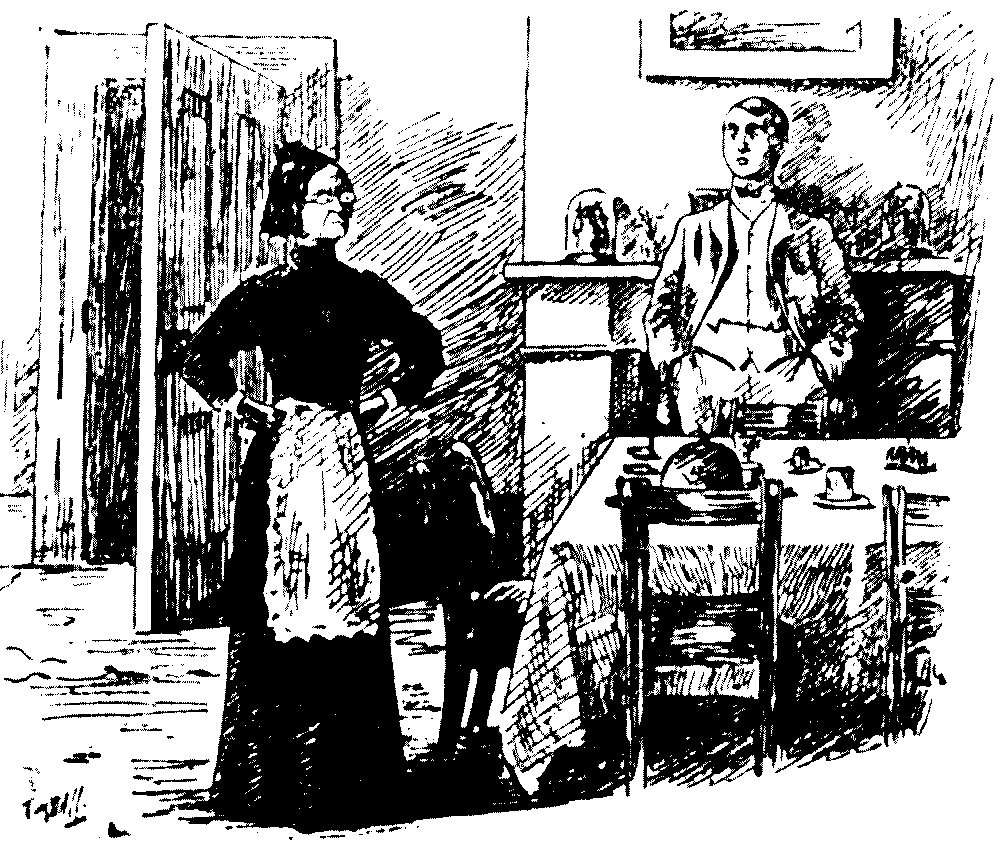
Landlady. "I hope you slept well, sir?"
New Boarder. "No, I didn't. I've been troubled with insomnia."
Landlady. "Look here, young man. I'll give you a sovereign for every one you find in that bed!"
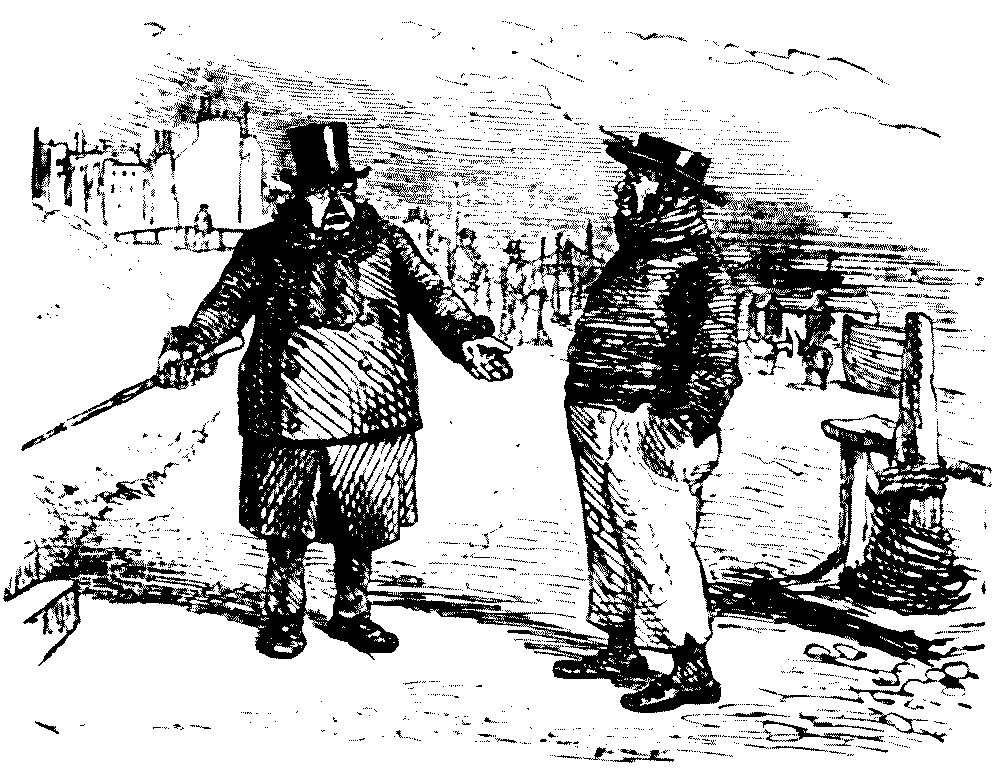
Testy Old Gent. (wearied by the importunities of the Brighton boatmen). "Confound it, man! Do I look as if I wanted a boat?"
I've bin spending my long Wacation of a fortnite at Northgate.
Northgate's a nice quiet place, Northgate is, tho' it quite fails in most things that constitoots reel injoyment at the seaside, such as Bands and Niggers and Minstrels and all that.
It's a grand place for weather, for it generally blows hard at Northgate, and wen it doesn't blow hard it rains hard, which makes a nice change, and a change is wot we all goes to the seaside for.
It seems a werry favrite place for inwaleeds, for the place is full on 'em, Bath cheers is in great demand and all the seats on the Prade is allus occypied by 'em.
Dr. Scratchem too sends most of his favrite cases there, and you can't walk on the Peer without facing lots on 'em.
Brown says the place makes him as sollem as a Common Cryer, and he hasn't had a good hearty larf since he came here, but then Brown isn't quite sattisfied with his Lodgings, and has acshally recommended his Land Lady to turn her house into the Norfolk Howard Hotel, Unlimited, so perhaps she may account for his want of spirits. Northgate's rather a rum place as regards the tide. Wen it's eye it comes all over the place and makes such a jolly mess, and wen it's low it runs right out to sea and you can't see it. Brown tried to persuade me as how as one werry eye tide was a spring tide, but as it was in September I wasn't so green as to beleeve that rubbish.
It seems quite a pet place for Artists, I mean Sculpchers, at least I s'pose they must be Sculpchers, and that they brings their Moddels with 'em, for the Bathing Machines is stuck close to the Peer, so dreckly after breakfast the Moddels goes and bathes in the Sea, and the Sculpchers goes on the Peer, and there's nothink to divert their attention from their interesting studdys, and many on 'em passes ours there quietly meditating among the Bathing Machines.
Brown says, in his sarcastic way, it's the poor Sculpchers as comes here, who can't afford to pay for their Moddels, so they comes here and gets 'em free gratis for nothink.
There's sum werry nice walks in the nayberhood but I never walks 'em, for it seems to me that the grate joke of every Buysicler and Trysicler, and the place swarms with 'em, is to cum quietly behind you and see how close he can go by you without nocking you down. I'm sure the jumps and the starts and the frites as I had the fust day or too kep my Art in my mouth till I thort it would have choked me.
How Ladys, reel Ladys too, can expose theirselves on such things I can't make out. I herd a young Swell say that wot with them and what with the Bathing Moddels it was as good as a Burlesk!
We've got werry cumferrabel Lodgings, we have, just opposite the Gas Works and near a Brick Field. When the wind is South or West we smells the bricks and when its East we smells the Gas, but when its doo North we don't smell nuffen excep just a trifle from the Dranes, and so long as we keeps quite at the end of the werry long[Pg 168] Peer we don't smell nuffen at all excep the sea weed.
Our Landlord's a werry respeckabel man and the Stoker on our little Railway, and so werry fond of nussing our little children that they are allus as black as young Sweeps. Their gratest treat is to go with him to the Stashun and stand on the ingin when they are shuntin, so preshus little they gits of the sea breezes.
We've had a fust rate Company staying here. I've seen no less than 2 Aldermen, and 1 Warden of a City Compny, but they didn't stay long. I don't think the living was good enuff for 'em. It must be a werry trying change, from every luxery that isn't in season, to meer beef and mutton and shrimps! and those rayther course.
I think our Boatmen is about the lazyest set of fellows as ever I seed. So far from begging on you to have a soft Roe with the Tide, or a hard Roe against it, they makes all sorts of egscewses for not taking you, says they're just a going to dinner, or they thinks the wind's a gitting[Pg 170] up, or there ain't enough water!
Not enuff water in the Sea to flote a Bote! wen any one could see as there was thousands of galluns there.
I saw some on 'em this mornin bringin in sum fish, and asked the price of a pair of Souls, but they axshally said they didn't dare sell one, for every man Jack of 'em must be sent to Billingsgate! but werry likely sum on 'em might be sent back again in the arternoon, and then I could get some at the Fishmonger's!
What a nice derangemunt!
There was the butiful fresh fish reddy for eating, there was me and my family reddy to eat 'em, but no, they must be packed in boxes and carried to the Station and then sent by Rale to London, and then sent by Wan to Billingsgate, and that takes I'm told ever so many hours, and then carried back to the London Stashun, and then sent by Rale to Northgate, and then carried from the Stashun to[Pg 172] the Fishmonger's, and then I'm allowed to buy 'em!
Well if that isn't a butiful business like arrangement, my Lord Mare, I should like to know what is.
However, as I wunce herd a Deputy say, when things cums to their wust, things is sure to mend, and I don't think that things can be much wusser than that.
The Spirit of the Thing.—Landlady (to shivering lodger). No, sir, I don't object to your dining at a restorong, nor to your taking an 'apenny paper, but I must resent your constant 'abit of locking up your whiskey, thereby himplying that me, a clergyman's daughter, is prone to larceny.
[Lodger immediately hands her the key as a guarantee of good faith.
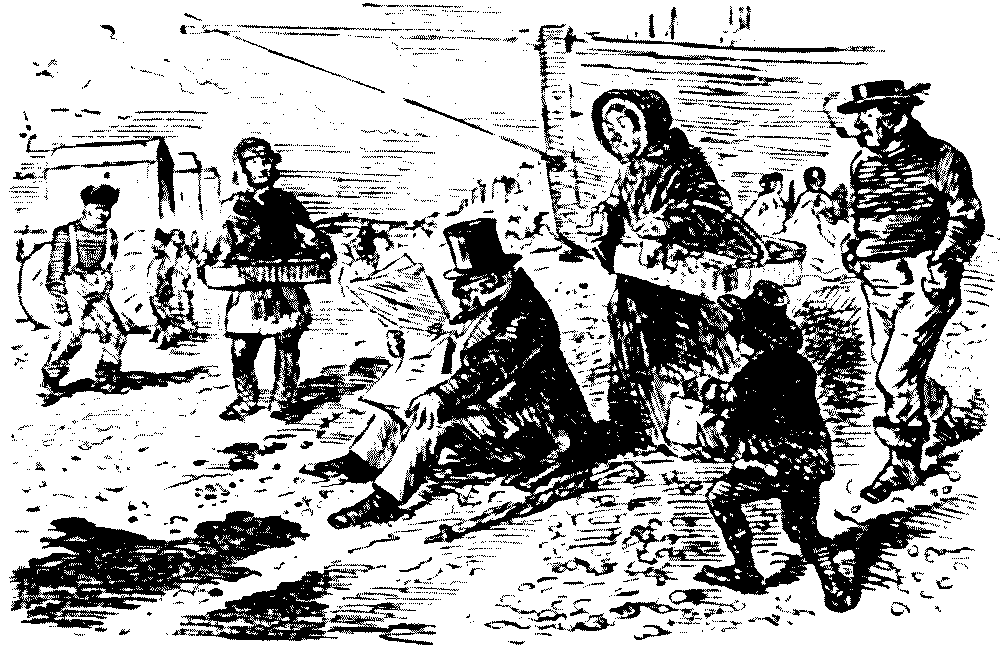
So! as it's a fine day, you'll sit on the beach and read the paper comfortably, will you? Very good! Then we recommend you to get what guinea-pigs, brandy-balls, boats, and children's socks, to say nothing of shell-workboxes, lace collars, and the like you may want, before you settle down.
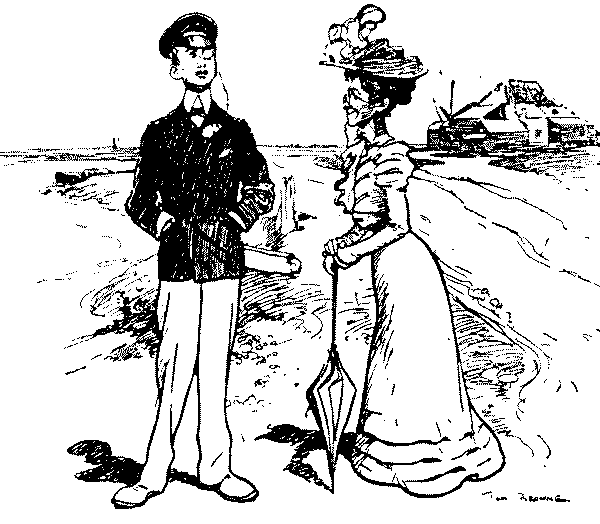
"Excuse me, sir. I seem to have met you before. Are you not a relative of Mr. Dan Briggs?"
"No, madam. I am Mr. Dan Briggs himself."
"Ah, then that explains the remarkable resemblance!"
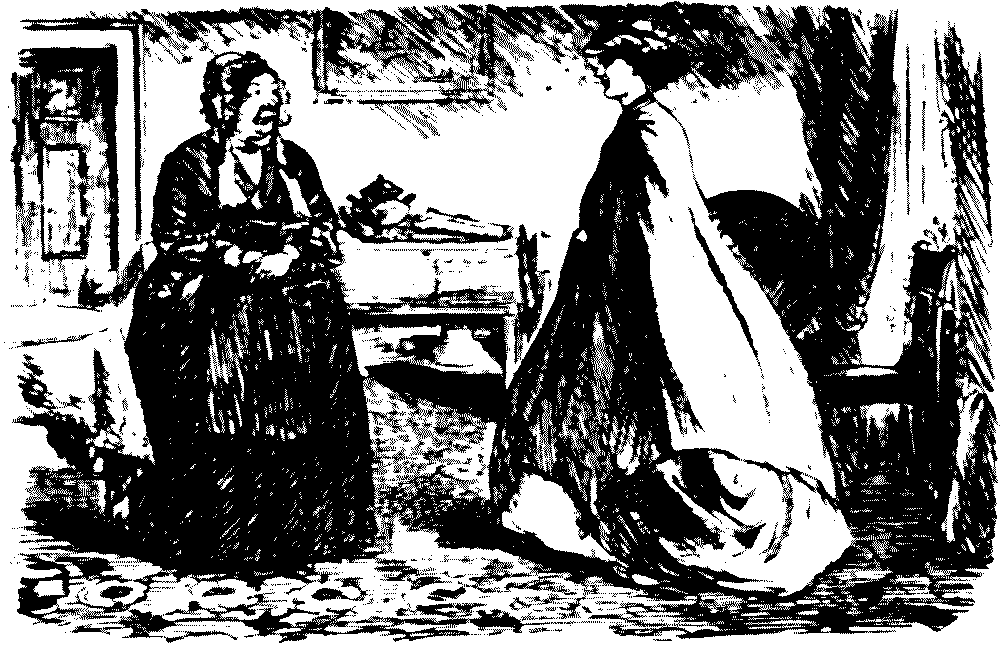
Lodger. "And then, there's that cold pheasant, Mrs. Bilkes"——
Landlady. "Yes'm, and if you should have enough without it, lor', Mr. Bilkes wouldn't mind a eatin' of it for his supper, if that's all."
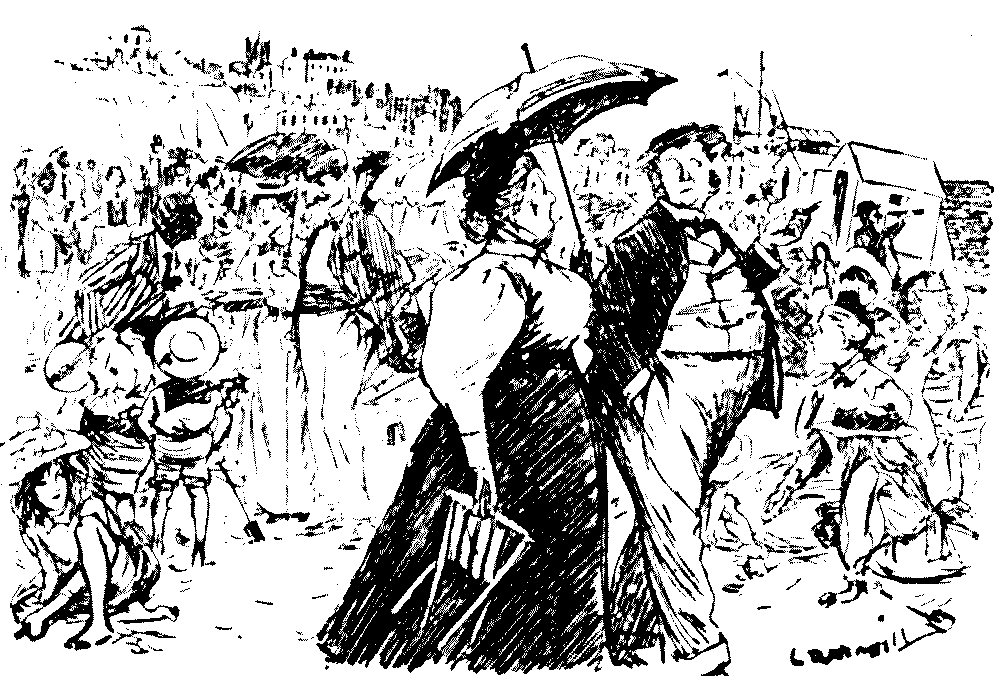
Mrs. Brown. "Might I ask how much you gave that nigger?"
Mr. Brown (first day down). "Sixpence."
Mrs. B. "Oh, indeed! Perhaps, sir, you are not aware that your wife and family have listened to those same niggers for the last ten days for a penny!"
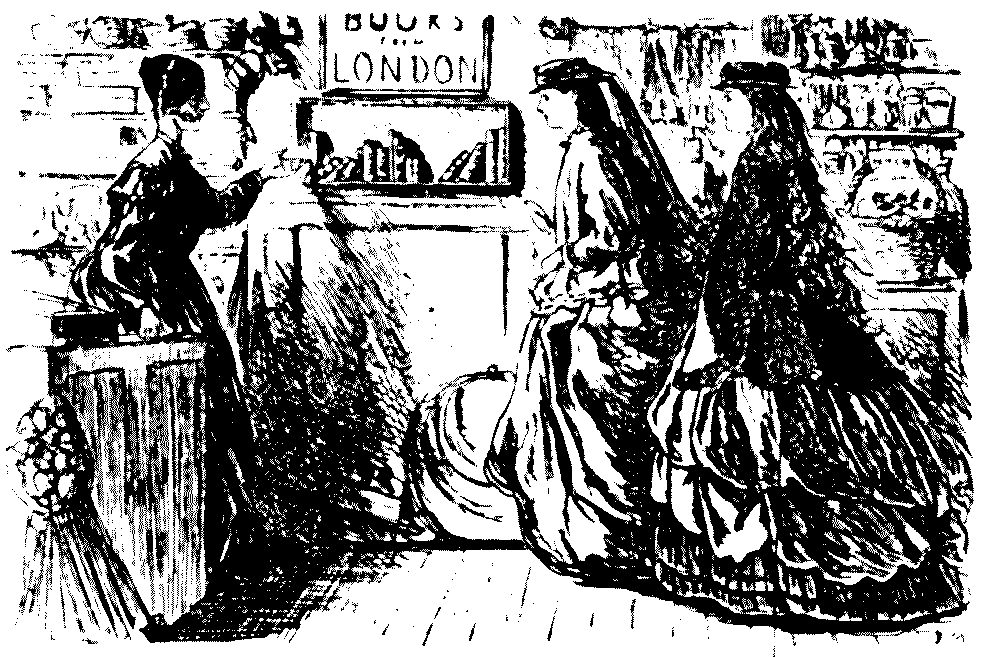
Mermaiden. "I am told you keep a circulating library?"
Librarian. "Yes, miss. There it is! Subscription, two shillings a-week; one volume at a time; change as often as you please! Would you like to see a catalogue?"
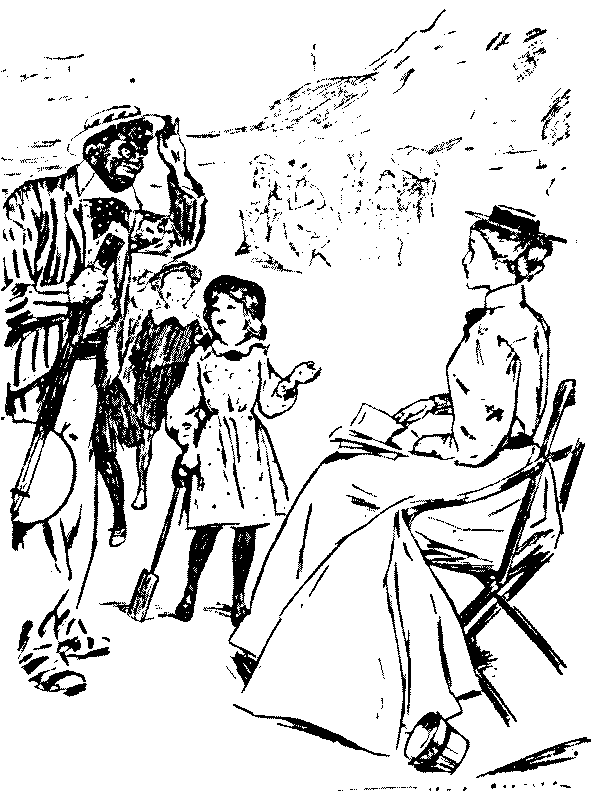
Polite Little Girl (suddenly). "This is my mamma, sir. Will you please sing her, 'It's the seasoning wot does it!'"
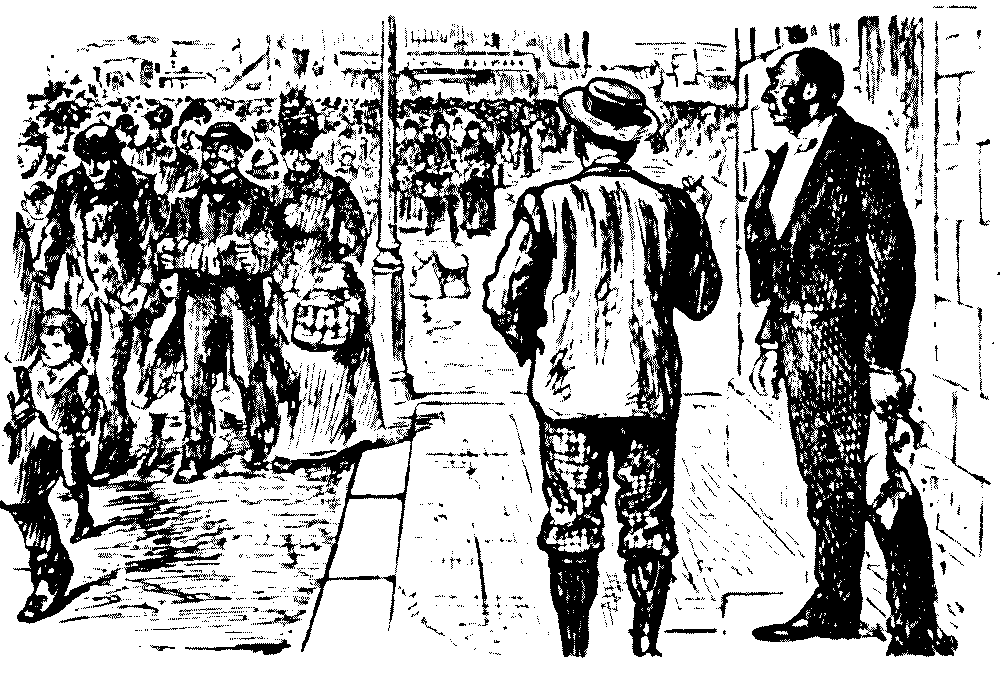
Visitor. "What a roaring trade the hotels will be doing, with all these holiday folk!"
Head waiter at The George. "Lor bless yer, sir, no! They all bring their nosebags with 'em!"
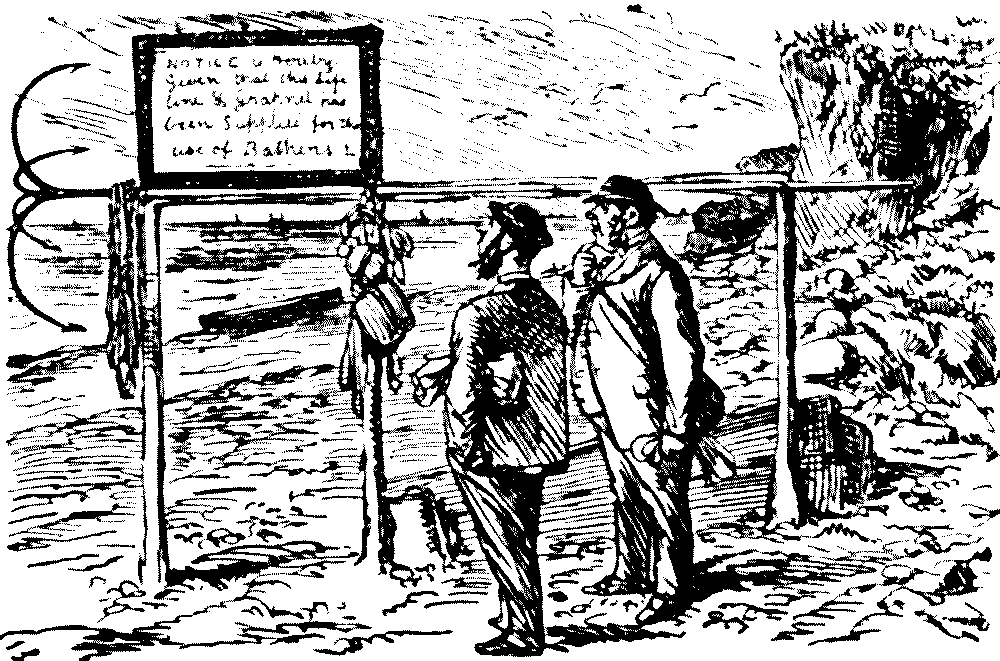
Wiggles and Sprott prefer bathing from the beach to having a stuffy machine. They are much pleased with the delicate little attention indicated above!
On the sands as loitering I stand
Where my point of view the scene commands,
I survey the prospect fair and grand
On the sands.
Niggers, half a dozen German bands,
Photographic touts, persistent, bland,
Chiromancers reading dirty hands,
Nursemaids, children, preachers, skiffs that land
Trippers with cigars of fearful brands,
Donkeys—everything, in short, but sand—
On the sands.
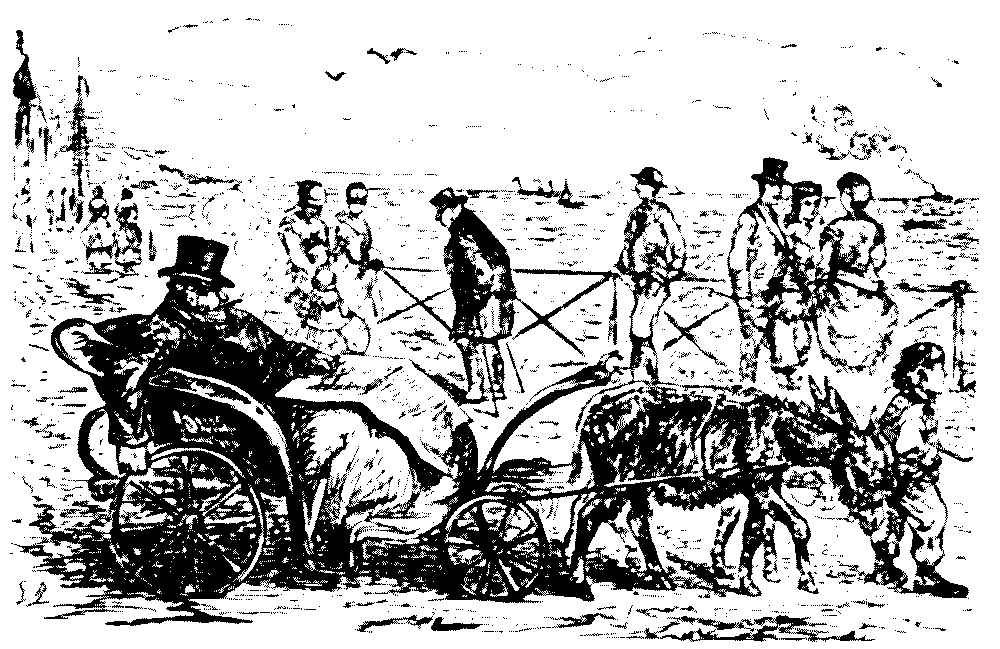
Old Mr. de Cramwell, being bilious and out of sorts, is ordered to go to the sea, and take plenty of exercise in the open air. (He begins at once.)
The "disguised minstrel", believed by the public to be a peer of the realm collecting coin for a charity, but who is in reality the sentimental singer from a perambulating troop of nigger banjoists, "working on his own."
The preacher whose appreciation of the value of logic and the aspirate is on a par.
The intensely military young man whose occupation during eleven months in the year is the keeping of ledgers in a small city office.
The artist who guarantees a pleasing group of lovers for sixpence, frame included.
The band that consists of a cornet, a trombone, a clarionet, some bass, and a big drum, which is quite as effective (thanks to the trombone) when all the principals have deserted in search of coppers.[Pg 175]
And last (and commonest of all) the cockney who, after a week's experience of the discomforts of the seaside, is weary of them, and wants to go home.
Old lady first, with hair like winter snows,
Makes moan.
And struggles. Then, with cheeks too richly rose,
A crone,
Gold hair, new teeth, white powder on her nose;
All bone
And skin; an "Ancient Mystery", like those
Of Hone.
Then comes a girl; sweet face that freshly glows!
Well grown.
The neat cloth gown her supple figure shows
Now thrown
In lines of beauty. Last, in graceless pose,
Half prone,
A luckless lout, caught by the blast, one knows
His tone
Means oaths; his hat, straight as fly crows,
Has flown.
I laugh at him, and—— Hi! By Jove, there goes
My own!
Close under the Parade wall a large circle has been formed, consisting chiefly of Women on chairs and camp-stools, with an inner ring of small Children, who are all patiently awaiting the arrival of a troupe of Niggers. At the head of one of the flights of steps leading up to the Parade, a small and shrewish Child-nurse is endeavouring to detect and recapture a pair of prodigal younger Brothers, who have given her the slip.
Sarah (to herself). Wherever can them two plegs have got to? (Aloud; drawing a bow at a venture.) Albert! 'Enery! Come up 'ere this minnit. I see yer!
'Enery (under the steps—to Albert). I say—d'ye think she do?—'cos if——
Albert. Not she! Set tight.
[They sit tight.
Sarah (as before). 'Enery! Albert! You've bin and 'alf killed little Georgie between yer![Pg 178]
'Enery (moved, to Albert). Did you 'ear that, Bert? It wasn't me upset him—was it now?
Albert (impenitent). 'Oo cares? The Niggers'll be back direckly.
Sarah. Al-bert! 'Enery! Your father's bin down 'ere once after you. You'll ketch it!
Albert (sotto voce). Not till father ketches us, we shan't. Keep still, 'Enery—we're all right under 'ere!
Sarah (more diplomatically). 'Enery! Albert! Father's bin and left a 'ap'ny apiece for yer. Ain't yer comin' up for it? If yer don't want it, why, stay where you are, that's all!
Albert (to 'Enery). I knoo we 'adn't done nothin'. An' I'm goin' up to git that 'ap'ny, I am.
'Enery. So 'm I.
[They emerge, and ascend the steps—to be pounced upon immediately by the ingenious Sarah.
Sarah. 'Ap'ny, indeed! You won't git no[Pg 177] 'apence 'ere, I can tell yer—so jest you come along 'ome with me!
[Exeunt Albert and 'Enery, in captivity, as the Niggers enter the circle.
Bones. We shall commence this afternoon by 'olding our Grand Annual Weekly Singing Competition, for the Discouragement of Youthful Talent. Now then, which is the little gal to step out first and git a medal? (The Children giggle, but remain seated.) Not one? Now I arsk you—What is the use o' me comin' 'ere throwin' away thousands and thousands of pounds on golden medals, if you won't take the trouble to stand up and sing for them? Oh, you'll make me so wild, I shall begin spittin' 'alf-sovereigns directly—I know I shall! (A little Girl in a sun-bonnet comes forward.) Ah, 'ere's a young lady who's bustin' with melody, I can see. Your name, my dear? Ladies and Gentlemen, I have the pleasure to announce that Miss Connie Cockle will now appear. Don't curtsey till the Orchestra gives the chord. (Chord from the harmonium—the Child advances, and curtsies with much aplomb.) Oh, lor! call that a curtsey—that's a cramp, that is! Do it all over again! (The Child obeys, disconcerted.) That's worse! I can see the s'rimps blushin' for yer inside their paper bags! Now see Me do it. (Bones executes a caricature of a curtsey, which the little Girl copies with terrible fidelity.) That's ladylike—that's genteel. Now sing out! (The Child sings the first verse of a popular music-hall song, in a squeaky little voice.) Talk about nightingales! Come 'ere, and receive the reward for extinguished incapacity. On your knees! (The little Girl kneels before him while a[Pg 180] tin medal is fastened upon her frock.) Rise, Sir Connie Cockle! Oh, you lucky girl!
[The Child returns, swelling with triumph, to her companions, several of whom come out, and go through the same performance, with more or less squeakiness and self-possession.
First Admiring Matron (in audience). I do like to see the children kep' out o' mischief like this, instead o' goin' paddling and messing about the sands!
Second Ad. Mat. Just what I say, my dear—they're amused and edjucated 'ow to beyave at the same time!
First Politician (with the "Standard"). No, but look here—when Gladstone was asked in the House whether he proposed to give the Dublin Parliament the control of the police, what was his answer. Why....
The Niggers (striking up chorus). "'Rum-tumty diddly-umty doodah-dey! Rum-tumty-diddly-um was all that he could say. And the Members and the Speaker joined together in the lay. Of 'Rum-tumty-diddly-umty doodah-dey!'"
Second Pol. (with the "Star"). Well, and what more would you have 'ad him say? Come, now!
Alf (who has had quite enough ale at dinner—to his fiancée). These Niggers ain't up to much Loo. Can't sing for nuts!
Chorley (his friend, perfidiously). You'd better go in and show 'em how, old man. Me and Miss[Pg 182] Serge'll stay and see you take the shine out of 'em!
Alf. P'raps you think I can't. But, if I was to go upon the 'Alls now, I should make my fortune in no time! Loo's 'eard me when I've been in form, and she'll tell you——
Miss Serge. Well, I will say there's many a professional might learn a lesson from Alf—whether Mr. Perkins believes it or not.
[Cuttingly, to "Chorley."
Chorley. Now reelly, Miss Loo, don't come down on a feller like that. I want to see him do you credit, that's all, and he couldn't 'ave a better opportunity to distinguish himself—now could he?
Miss Serge. I'm not preventing him. But I don't know—these Niggers keep themselves very select, and they might object to it.
Alf. I'll soon square them. You keep your eye on me, and I'll make things a bit livelier!
[He enters the circle.
Miss Serge (admiringly). He has got a cheek, I[Pg 183] must say! Look at him, dancing there along with those two Niggers—they don't hardly know what to make of him yet!
Chorley. Do you notice how they keep kicking him beyind on the sly like? I wonder he puts up with it!
Miss S. He'll be even with them presently—you see if he isn't.
[Alf attempts to twirl a tambourine on his finger, and lets it fall; derision from audience; Bones pats him on the head and takes the tambourine away—at which Alf only smiles feebly.
Chorley. It's a pity he gets so 'ot dancing, and he don't seem to keep in step with the others.
Miss S. (secretly disappointed). He isn't used to doing the double-shuffle on sand, that's all.
The Conductor. Bones, I observe we have a recent addition to our company. Perhaps he'll favour us with a solo. (Aside to Bones.) 'Oo is he? 'Oo let him in 'ere—you?
Bones. I dunno. I thought you did. Ain't he stood nothing?
Conductor. Not a brass farden![Pg 184]
Bones (outraged). All right, you leave him to me. (To Alf.) Kin it be? That necktie! them familiar coat-buttons! that paper-dicky! You are—you are my long-lost convick son, 'ome from Portland! Come to these legs! (He embraces Alf, and smothers him with kisses.) Oh, you've been and rubbed off some of your cheek on my complexion—you dirty boy! (He playfully "bashes" Alf's hat in.) Now show the comp'ny how pretty you can sing. (Alf attempts a music-hall ditty, in which he, not unnaturally, breaks down.) It ain't my son's fault, Ladies and Gentlemen, it's all this little gal in front here, lookin' at him and makin' him shy! (To a small Child, severely.) You oughter know worse, you ought! (Clumps of seaweed and paper-balls are thrown at Alf who by this time is looking deplorably warm and foolish.) Oh, what a popilar fav'rite he is, to be sure!
Chorley (to Miss S.). Poor fellow, he ain't no match for those Niggers—not like he is now! Hadn't I better go to the rescue, Miss Loo?
Miss S. (pettishly). I'm sure I don't care what you do.
["Chorley" succeeds, after some persuasion, in removing the unfortunate Alf.
Alf (rejoining his fiancée with a grimy face, a smashed hat, and a pathetic attempt at a grin). Well? I done it, you see!
Miss S. (crushingly). Yes, you have done it! And the best thing you can do now, is to go home and wash your face. I don't care to be seen about with a laughing-stock, I can assure you![Pg 188] I've had my dignity lowered quite enough as it is!
Alf. But look 'ere, my dear girl, I can't leave you here all by yourself you know!
Miss S. I dare say Mr. Perkins will take care of me.
[Mr. P. assents, with effusion.
Alf (watching them move away—with bitterness). I wish all Niggers were put down by Act of Parliament, I do! Downright noosances—that's what they are!
Delays Are Dangerous.—Young Housekeeper. "I'm afraid those soles I bought of you yesterday were not fresh. My husband said they were not nice at all!"
Brighton Fisherman. "Well, marm, that be your fault—it bean't mine. I've offered 'em yer every day this week, and you might a' 'ad 'em o' Monday if you'd a loiked!"
At Margate.—Angelina (very poetical, surveying the rolling ocean). "Water, water everywhere, and not a drop to drink."
Edwin (very practical). No drink! Now, hang it all, Angy, if I've asked you once I've asked you three times within the last five minutes to come and do a split soda and whiskey! And I can do with it!
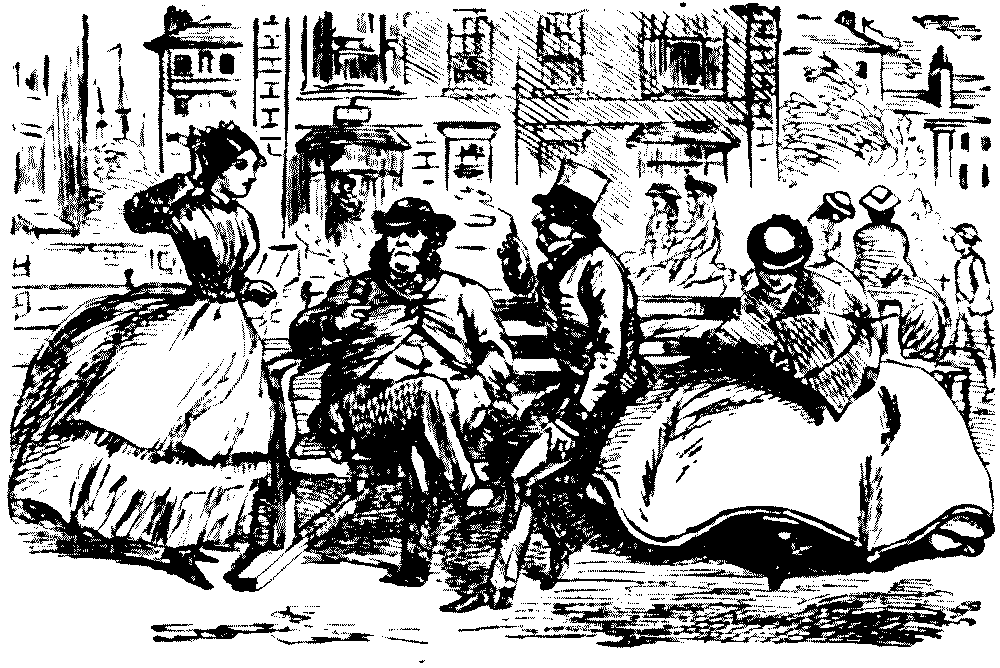
Maid (to Paterfamilias). "Please, sir, missus say you're to come in, and sit on the boxes; because we can't get 'em to, and they wants to be corded."
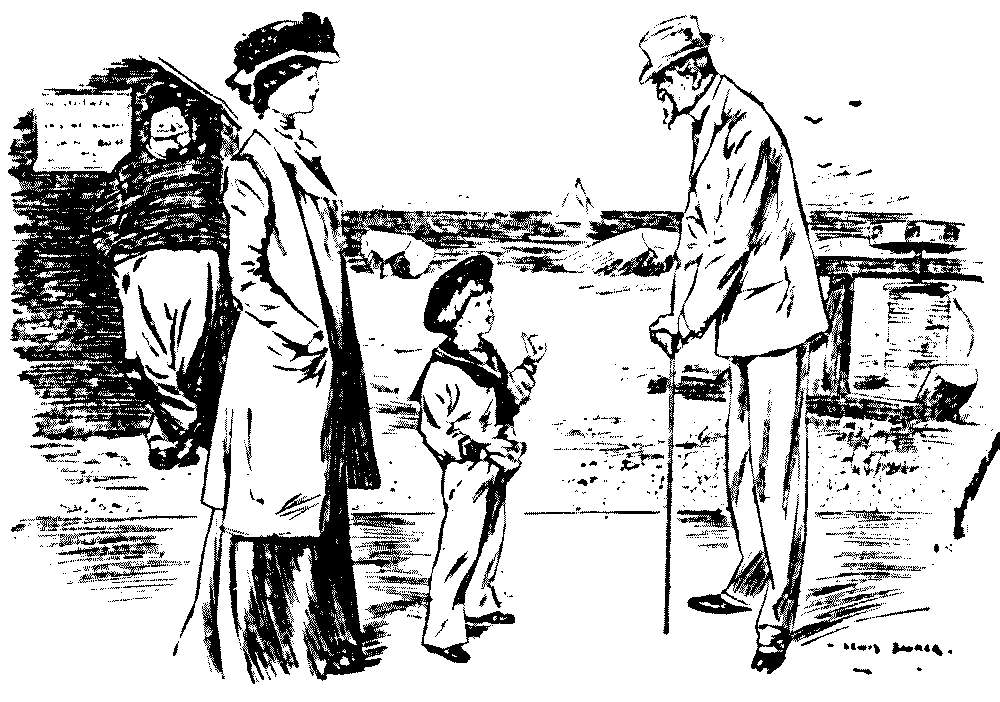
The General. "And what are you going to be when you grow up, young man?"
Bobbie. "Well, I can't quite make up my mind. I don't know which would be nicest—a soldier, like you, or a sailor, like Mr. Smithers."
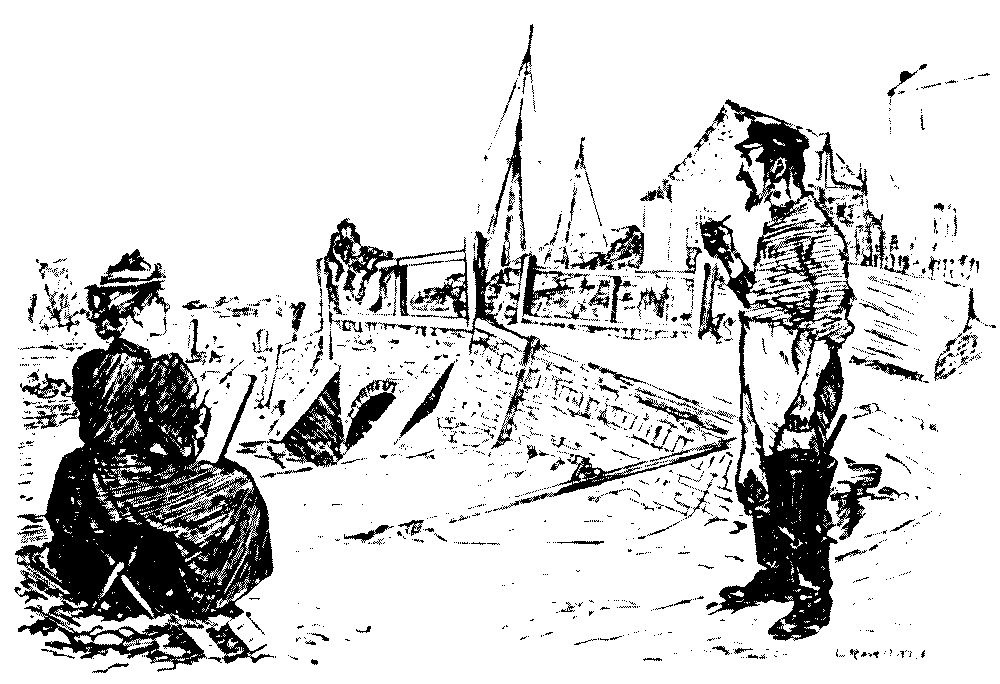
Lady Artist. "Do you belong to that ship over there?"
Sailor. "Yes, miss."
Lady Artist. "Then would you mind loosening all those ropes? They are much too tight, and, besides, I can't draw straight lines!"
|
How Belinda Brown appeared with "waves all over her hair" before taking a bath in the sea— |
and |
How she looked after having some more "waves all over it" |
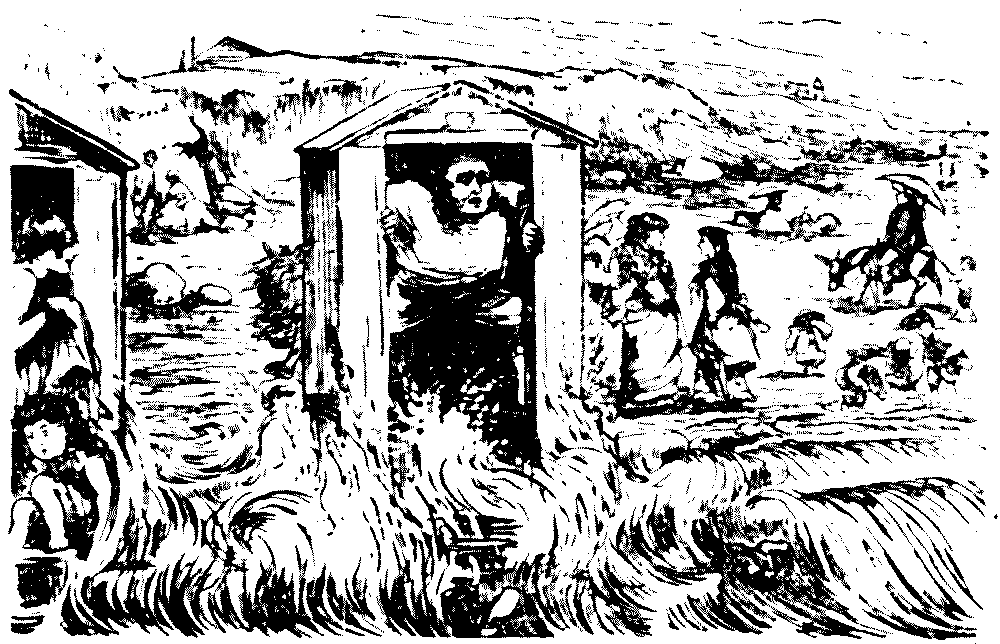
Don't let them jolt you up the beach till you are dressed.
Jones (obliged to hold fast). "Hullo! Hi! Somebody stop my boots!"
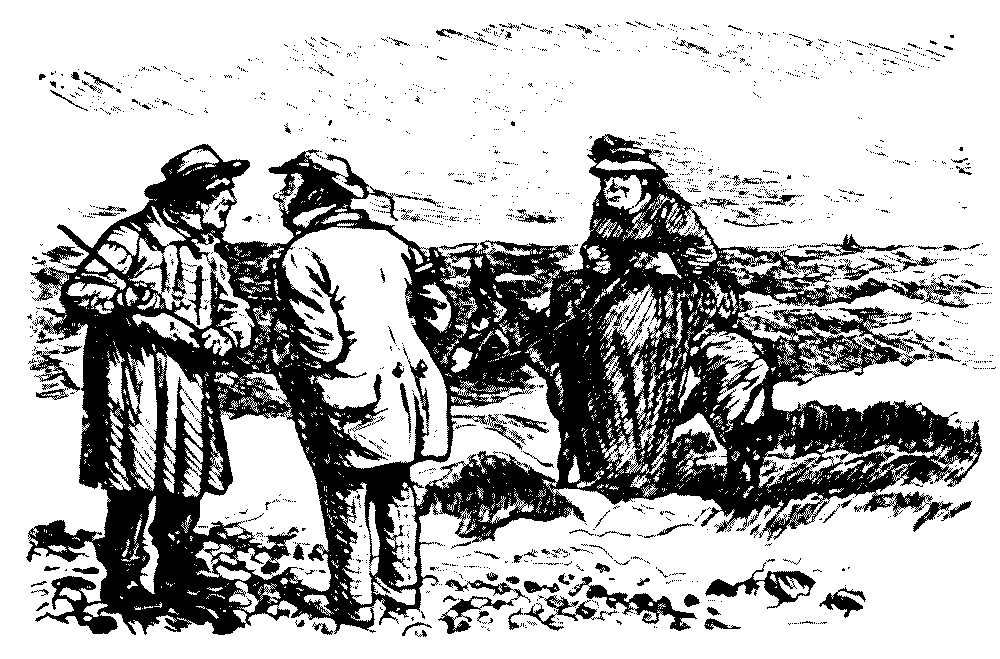
Separated husband. "Fetch him out, sir!"
Proprietor of moke. "Why, if I went near her, she'd lie down; she always goes in just before high water; nothing'll fetch her out till the tide turns!"
See! what craft Margate Harbour displays,
There are luggers and cutters and yawls,
They sail upon sunshiny days,
For land-sailors arn't partial to squalls.
There's Paterfamilias takes out the lot
Of the progeny he may own,
But the Saturday Evening boat has got
A freight that is hers alone.
By far the most precious of craft afloat,
Is the Saturday Evening "Husbands' Boat."
There are husbands with luggage, and husbands with none,
There are husbands with parcels in hand,
They bring down to wives whom they lately have won,
Who pretty attentions command.
There are husbands who know whate'er time it may be
Their wives on the jetty will wait
For that Hymeneal argosy,
With its matrimonial freight.
Oh! the most precious of craft afloat
Is the Saturday Evening "Husbands' Boat."
But the Monday Morning is "Monday black",
That when at school we knew,
For the husbands to business must all go back,
And the wives look monstrous blue;
So loud the bell rings, and the steamer starts
On her way to Thames Haven again,
And amid those who leave are as many sad hearts,
As there are amid those who remain.
Coming or going of craft afloat,
The most prized one is the "Husbands' Boat."
End of the Project Gutenberg EBook of Mr. Punch at the Seaside, by Various
*** END OF THIS PROJECT GUTENBERG EBOOK MR. PUNCH AT THE SEASIDE ***
***** This file should be named 37166-h.htm or 37166-h.zip *****
This and all associated files of various formats will be found in:
https://www.gutenberg.org/3/7/1/6/37166/
Produced by Neville Allen, Chris Curnow and the Online
Distributed Proofreading Team at https://www.pgdp.net (This
file was produced from images generously made available
by The Internet Archive)
Updated editions will replace the previous one--the old editions
will be renamed.
Creating the works from public domain print editions means that no
one owns a United States copyright in these works, so the Foundation
(and you!) can copy and distribute it in the United States without
permission and without paying copyright royalties. Special rules,
set forth in the General Terms of Use part of this license, apply to
copying and distributing Project Gutenberg-tm electronic works to
protect the PROJECT GUTENBERG-tm concept and trademark. Project
Gutenberg is a registered trademark, and may not be used if you
charge for the eBooks, unless you receive specific permission. If you
do not charge anything for copies of this eBook, complying with the
rules is very easy. You may use this eBook for nearly any purpose
such as creation of derivative works, reports, performances and
research. They may be modified and printed and given away--you may do
practically ANYTHING with public domain eBooks. Redistribution is
subject to the trademark license, especially commercial
redistribution.
*** START: FULL LICENSE ***
THE FULL PROJECT GUTENBERG LICENSE
PLEASE READ THIS BEFORE YOU DISTRIBUTE OR USE THIS WORK
To protect the Project Gutenberg-tm mission of promoting the free
distribution of electronic works, by using or distributing this work
(or any other work associated in any way with the phrase "Project
Gutenberg"), you agree to comply with all the terms of the Full Project
Gutenberg-tm License (available with this file or online at
https://gutenberg.org/license).
Section 1. General Terms of Use and Redistributing Project Gutenberg-tm
electronic works
1.A. By reading or using any part of this Project Gutenberg-tm
electronic work, you indicate that you have read, understand, agree to
and accept all the terms of this license and intellectual property
(trademark/copyright) agreement. If you do not agree to abide by all
the terms of this agreement, you must cease using and return or destroy
all copies of Project Gutenberg-tm electronic works in your possession.
If you paid a fee for obtaining a copy of or access to a Project
Gutenberg-tm electronic work and you do not agree to be bound by the
terms of this agreement, you may obtain a refund from the person or
entity to whom you paid the fee as set forth in paragraph 1.E.8.
1.B. "Project Gutenberg" is a registered trademark. It may only be
used on or associated in any way with an electronic work by people who
agree to be bound by the terms of this agreement. There are a few
things that you can do with most Project Gutenberg-tm electronic works
even without complying with the full terms of this agreement. See
paragraph 1.C below. There are a lot of things you can do with Project
Gutenberg-tm electronic works if you follow the terms of this agreement
and help preserve free future access to Project Gutenberg-tm electronic
works. See paragraph 1.E below.
1.C. The Project Gutenberg Literary Archive Foundation ("the Foundation"
or PGLAF), owns a compilation copyright in the collection of Project
Gutenberg-tm electronic works. Nearly all the individual works in the
collection are in the public domain in the United States. If an
individual work is in the public domain in the United States and you are
located in the United States, we do not claim a right to prevent you from
copying, distributing, performing, displaying or creating derivative
works based on the work as long as all references to Project Gutenberg
are removed. Of course, we hope that you will support the Project
Gutenberg-tm mission of promoting free access to electronic works by
freely sharing Project Gutenberg-tm works in compliance with the terms of
this agreement for keeping the Project Gutenberg-tm name associated with
the work. You can easily comply with the terms of this agreement by
keeping this work in the same format with its attached full Project
Gutenberg-tm License when you share it without charge with others.
1.D. The copyright laws of the place where you are located also govern
what you can do with this work. Copyright laws in most countries are in
a constant state of change. If you are outside the United States, check
the laws of your country in addition to the terms of this agreement
before downloading, copying, displaying, performing, distributing or
creating derivative works based on this work or any other Project
Gutenberg-tm work. The Foundation makes no representations concerning
the copyright status of any work in any country outside the United
States.
1.E. Unless you have removed all references to Project Gutenberg:
1.E.1. The following sentence, with active links to, or other immediate
access to, the full Project Gutenberg-tm License must appear prominently
whenever any copy of a Project Gutenberg-tm work (any work on which the
phrase "Project Gutenberg" appears, or with which the phrase "Project
Gutenberg" is associated) is accessed, displayed, performed, viewed,
copied or distributed:
This eBook is for the use of anyone anywhere at no cost and with
almost no restrictions whatsoever. You may copy it, give it away or
re-use it under the terms of the Project Gutenberg License included
with this eBook or online at www.gutenberg.org
1.E.2. If an individual Project Gutenberg-tm electronic work is derived
from the public domain (does not contain a notice indicating that it is
posted with permission of the copyright holder), the work can be copied
and distributed to anyone in the United States without paying any fees
or charges. If you are redistributing or providing access to a work
with the phrase "Project Gutenberg" associated with or appearing on the
work, you must comply either with the requirements of paragraphs 1.E.1
through 1.E.7 or obtain permission for the use of the work and the
Project Gutenberg-tm trademark as set forth in paragraphs 1.E.8 or
1.E.9.
1.E.3. If an individual Project Gutenberg-tm electronic work is posted
with the permission of the copyright holder, your use and distribution
must comply with both paragraphs 1.E.1 through 1.E.7 and any additional
terms imposed by the copyright holder. Additional terms will be linked
to the Project Gutenberg-tm License for all works posted with the
permission of the copyright holder found at the beginning of this work.
1.E.4. Do not unlink or detach or remove the full Project Gutenberg-tm
License terms from this work, or any files containing a part of this
work or any other work associated with Project Gutenberg-tm.
1.E.5. Do not copy, display, perform, distribute or redistribute this
electronic work, or any part of this electronic work, without
prominently displaying the sentence set forth in paragraph 1.E.1 with
active links or immediate access to the full terms of the Project
Gutenberg-tm License.
1.E.6. You may convert to and distribute this work in any binary,
compressed, marked up, nonproprietary or proprietary form, including any
word processing or hypertext form. However, if you provide access to or
distribute copies of a Project Gutenberg-tm work in a format other than
"Plain Vanilla ASCII" or other format used in the official version
posted on the official Project Gutenberg-tm web site (www.gutenberg.org),
you must, at no additional cost, fee or expense to the user, provide a
copy, a means of exporting a copy, or a means of obtaining a copy upon
request, of the work in its original "Plain Vanilla ASCII" or other
form. Any alternate format must include the full Project Gutenberg-tm
License as specified in paragraph 1.E.1.
1.E.7. Do not charge a fee for access to, viewing, displaying,
performing, copying or distributing any Project Gutenberg-tm works
unless you comply with paragraph 1.E.8 or 1.E.9.
1.E.8. You may charge a reasonable fee for copies of or providing
access to or distributing Project Gutenberg-tm electronic works provided
that
- You pay a royalty fee of 20% of the gross profits you derive from
the use of Project Gutenberg-tm works calculated using the method
you already use to calculate your applicable taxes. The fee is
owed to the owner of the Project Gutenberg-tm trademark, but he
has agreed to donate royalties under this paragraph to the
Project Gutenberg Literary Archive Foundation. Royalty payments
must be paid within 60 days following each date on which you
prepare (or are legally required to prepare) your periodic tax
returns. Royalty payments should be clearly marked as such and
sent to the Project Gutenberg Literary Archive Foundation at the
address specified in Section 4, "Information about donations to
the Project Gutenberg Literary Archive Foundation."
- You provide a full refund of any money paid by a user who notifies
you in writing (or by e-mail) within 30 days of receipt that s/he
does not agree to the terms of the full Project Gutenberg-tm
License. You must require such a user to return or
destroy all copies of the works possessed in a physical medium
and discontinue all use of and all access to other copies of
Project Gutenberg-tm works.
- You provide, in accordance with paragraph 1.F.3, a full refund of any
money paid for a work or a replacement copy, if a defect in the
electronic work is discovered and reported to you within 90 days
of receipt of the work.
- You comply with all other terms of this agreement for free
distribution of Project Gutenberg-tm works.
1.E.9. If you wish to charge a fee or distribute a Project Gutenberg-tm
electronic work or group of works on different terms than are set
forth in this agreement, you must obtain permission in writing from
both the Project Gutenberg Literary Archive Foundation and Michael
Hart, the owner of the Project Gutenberg-tm trademark. Contact the
Foundation as set forth in Section 3 below.
1.F.
1.F.1. Project Gutenberg volunteers and employees expend considerable
effort to identify, do copyright research on, transcribe and proofread
public domain works in creating the Project Gutenberg-tm
collection. Despite these efforts, Project Gutenberg-tm electronic
works, and the medium on which they may be stored, may contain
"Defects," such as, but not limited to, incomplete, inaccurate or
corrupt data, transcription errors, a copyright or other intellectual
property infringement, a defective or damaged disk or other medium, a
computer virus, or computer codes that damage or cannot be read by
your equipment.
1.F.2. LIMITED WARRANTY, DISCLAIMER OF DAMAGES - Except for the "Right
of Replacement or Refund" described in paragraph 1.F.3, the Project
Gutenberg Literary Archive Foundation, the owner of the Project
Gutenberg-tm trademark, and any other party distributing a Project
Gutenberg-tm electronic work under this agreement, disclaim all
liability to you for damages, costs and expenses, including legal
fees. YOU AGREE THAT YOU HAVE NO REMEDIES FOR NEGLIGENCE, STRICT
LIABILITY, BREACH OF WARRANTY OR BREACH OF CONTRACT EXCEPT THOSE
PROVIDED IN PARAGRAPH 1.F.3. YOU AGREE THAT THE FOUNDATION, THE
TRADEMARK OWNER, AND ANY DISTRIBUTOR UNDER THIS AGREEMENT WILL NOT BE
LIABLE TO YOU FOR ACTUAL, DIRECT, INDIRECT, CONSEQUENTIAL, PUNITIVE OR
INCIDENTAL DAMAGES EVEN IF YOU GIVE NOTICE OF THE POSSIBILITY OF SUCH
DAMAGE.
1.F.3. LIMITED RIGHT OF REPLACEMENT OR REFUND - If you discover a
defect in this electronic work within 90 days of receiving it, you can
receive a refund of the money (if any) you paid for it by sending a
written explanation to the person you received the work from. If you
received the work on a physical medium, you must return the medium with
your written explanation. The person or entity that provided you with
the defective work may elect to provide a replacement copy in lieu of a
refund. If you received the work electronically, the person or entity
providing it to you may choose to give you a second opportunity to
receive the work electronically in lieu of a refund. If the second copy
is also defective, you may demand a refund in writing without further
opportunities to fix the problem.
1.F.4. Except for the limited right of replacement or refund set forth
in paragraph 1.F.3, this work is provided to you 'AS-IS' WITH NO OTHER
WARRANTIES OF ANY KIND, EXPRESS OR IMPLIED, INCLUDING BUT NOT LIMITED TO
WARRANTIES OF MERCHANTIBILITY OR FITNESS FOR ANY PURPOSE.
1.F.5. Some states do not allow disclaimers of certain implied
warranties or the exclusion or limitation of certain types of damages.
If any disclaimer or limitation set forth in this agreement violates the
law of the state applicable to this agreement, the agreement shall be
interpreted to make the maximum disclaimer or limitation permitted by
the applicable state law. The invalidity or unenforceability of any
provision of this agreement shall not void the remaining provisions.
1.F.6. INDEMNITY - You agree to indemnify and hold the Foundation, the
trademark owner, any agent or employee of the Foundation, anyone
providing copies of Project Gutenberg-tm electronic works in accordance
with this agreement, and any volunteers associated with the production,
promotion and distribution of Project Gutenberg-tm electronic works,
harmless from all liability, costs and expenses, including legal fees,
that arise directly or indirectly from any of the following which you do
or cause to occur: (a) distribution of this or any Project Gutenberg-tm
work, (b) alteration, modification, or additions or deletions to any
Project Gutenberg-tm work, and (c) any Defect you cause.
Section 2. Information about the Mission of Project Gutenberg-tm
Project Gutenberg-tm is synonymous with the free distribution of
electronic works in formats readable by the widest variety of computers
including obsolete, old, middle-aged and new computers. It exists
because of the efforts of hundreds of volunteers and donations from
people in all walks of life.
Volunteers and financial support to provide volunteers with the
assistance they need are critical to reaching Project Gutenberg-tm's
goals and ensuring that the Project Gutenberg-tm collection will
remain freely available for generations to come. In 2001, the Project
Gutenberg Literary Archive Foundation was created to provide a secure
and permanent future for Project Gutenberg-tm and future generations.
To learn more about the Project Gutenberg Literary Archive Foundation
and how your efforts and donations can help, see Sections 3 and 4
and the Foundation web page at https://www.pglaf.org.
Section 3. Information about the Project Gutenberg Literary Archive
Foundation
The Project Gutenberg Literary Archive Foundation is a non profit
501(c)(3) educational corporation organized under the laws of the
state of Mississippi and granted tax exempt status by the Internal
Revenue Service. The Foundation's EIN or federal tax identification
number is 64-6221541. Its 501(c)(3) letter is posted at
https://pglaf.org/fundraising. Contributions to the Project Gutenberg
Literary Archive Foundation are tax deductible to the full extent
permitted by U.S. federal laws and your state's laws.
The Foundation's principal office is located at 4557 Melan Dr. S.
Fairbanks, AK, 99712., but its volunteers and employees are scattered
throughout numerous locations. Its business office is located at
809 North 1500 West, Salt Lake City, UT 84116, (801) 596-1887, email
business@pglaf.org. Email contact links and up to date contact
information can be found at the Foundation's web site and official
page at https://pglaf.org
For additional contact information:
Dr. Gregory B. Newby
Chief Executive and Director
gbnewby@pglaf.org
Section 4. Information about Donations to the Project Gutenberg
Literary Archive Foundation
Project Gutenberg-tm depends upon and cannot survive without wide
spread public support and donations to carry out its mission of
increasing the number of public domain and licensed works that can be
freely distributed in machine readable form accessible by the widest
array of equipment including outdated equipment. Many small donations
($1 to $5,000) are particularly important to maintaining tax exempt
status with the IRS.
The Foundation is committed to complying with the laws regulating
charities and charitable donations in all 50 states of the United
States. Compliance requirements are not uniform and it takes a
considerable effort, much paperwork and many fees to meet and keep up
with these requirements. We do not solicit donations in locations
where we have not received written confirmation of compliance. To
SEND DONATIONS or determine the status of compliance for any
particular state visit https://pglaf.org
While we cannot and do not solicit contributions from states where we
have not met the solicitation requirements, we know of no prohibition
against accepting unsolicited donations from donors in such states who
approach us with offers to donate.
International donations are gratefully accepted, but we cannot make
any statements concerning tax treatment of donations received from
outside the United States. U.S. laws alone swamp our small staff.
Please check the Project Gutenberg Web pages for current donation
methods and addresses. Donations are accepted in a number of other
ways including including checks, online payments and credit card
donations. To donate, please visit: https://pglaf.org/donate
Section 5. General Information About Project Gutenberg-tm electronic
works.
Professor Michael S. Hart was the originator of the Project Gutenberg-tm
concept of a library of electronic works that could be freely shared
with anyone. For thirty years, he produced and distributed Project
Gutenberg-tm eBooks with only a loose network of volunteer support.
Project Gutenberg-tm eBooks are often created from several printed
editions, all of which are confirmed as Public Domain in the U.S.
unless a copyright notice is included. Thus, we do not necessarily
keep eBooks in compliance with any particular paper edition.
Most people start at our Web site which has the main PG search facility:
https://www.gutenberg.org
This Web site includes information about Project Gutenberg-tm,
including how to make donations to the Project Gutenberg Literary
Archive Foundation, how to help produce our new eBooks, and how to
subscribe to our email newsletter to hear about new eBooks.